#He has other mentions of speaking but it's not written out as in quotations dialogue
Explore tagged Tumblr posts
Text
the before, the after, the in-between
Chapter Seven: daybreak trains Words: 3.3k
Relationships: Jon & Daisy, Jon/Martin Tags: Post-Canon, Scottish Safehouse, Angst, Emotional Hurt/Comfort, Mute Jon, Somebody Lives/Not Everyone Dies, Hopeful Ending
Work Summary:
There was no knife, no blood, and Jon was not dead. And when he heard a strangled noise from beside him and looked over to see Martin standing in the doorway of the safehouse, flung open and letting in the frigid bite of near-winter and sunlight, there was sunlight, he felt such a dizzying, intense wave of relief that he could hardly breathe around it.
Then, he opened his mouth to say Martin’s name, and nothing came out, and all of the relief fell away in an instant.
.
Jon wakes up in the safehouse in October of 2018, alive and well but without the Eye and without his voice. In the days that follow, he finds himself confronted with a world that has reset itself in space and in time, a version of himself that is no longer the Archivist, and the fact that death during the end of the world had not been so permanent as it had seemed.
Chapter Summary:
Daisy sighs and stands, brushing her hands off on the thighs of her trousers. “It’s not like you’re never going to see me again. I’ll still visit.”
“I know,” Jon signs, his hand gestures a bit too wide. “I’ll still…” He pauses, his hands lingering in the air for a moment as he tries to figure out what the next sign should be, before giving up and stepping forward instead, reaching for Daisy’s hand and capturing it in his. He squeezes tightly, looking up at Daisy with an open, vulnerable expression. Then, he brings her hand up with his as he presses it against the left side of his chest, a few inches above the jagged line of scar tissue, and settles his other hand on top of it. He may not know how to sign I’ll miss you, but he’d learned love early on.
Read on Ao3 (link in source)
Chapter One | Chapter Two | Chapter Three | Chapter Four | Chapter Five | Chapter Six | Chapter Seven
Or read below:
(cw for mentions of canon-typical worms)
.
A quick note that all sign language in this chapter (BSL) is indicated via italics in quotation marks. I recognize that BSL has different grammar and sentence construction than spoken English, but for the purposes of this fic and for clarity’s sake, I’ve written all sign language as it would be translated into English syntax and sentence construction. Further disclaimer that I am not deaf or mute and that I don’t speak any version of sign language, so if I’ve made an error in depicting the dialogue here, please let me know!
.
Jon raps his knuckles on the frame of the bedroom door, and Daisy glances up from where she’s crouched on the floor next to the bed, halfway through packing her bag next to the cot they’d gotten so Daisy didn’t have to sleep on the couch. (Though they have been saving up for a new couch, a decently nice one that doesn’t sag in the middle and leak stuffing. Martin’s new job at the village’s library pays adequately enough, but in the three months it’s been since the world snapped back to normal, they’ve only managed to accumulate a few hundred pounds in savings. It’s all right though, Jon thinks. They have time.)
“You don’t leave until tomorrow,” Jon signs, his hands still a bit clumsy around the words but adept enough to get his point across. He still carries his notebook with him for when the modest collection of signs Daisy’s been able to teach him so far aren’t enough for him to convey his thoughts, and he has a cell phone now with a speech-to-text app that he uses occasionally even though he finds the mechanical voice grating, but he’s been having to use them less and less. He still likes having the notebook, though. It feels nice to look down and see his words still scrawled on paper even after the conversation is over. A reminder that, for all that his voice has been used and stolen and manipulated over the years, his words are still his own.
“I know,” Daisy says, tucking a few more things in her bag before zipping it closed. She sits on her heels and looks up at him, her hair loose and falling just beneath her chin from where they’d cut it a few weeks prior. “But now it’s done, so.”
Jon sighs lightly and shakes his head, more an expression of resignation than irritation. The spot where Daisy’s things used to sit looks empty now, barren. It makes something heavy settle in the pit of his stomach. It must show on his face, because Daisy sighs and stands, brushing her hands off on the thighs of her trousers. “It’s not like you’re never going to see me again. I’ll still visit.”
“I know,” Jon signs, his hand gestures a bit too wide. “I’ll still…” He pauses, his hands lingering in the air for a moment as he tries to figure out what the next sign should be, before giving up and stepping forward instead, reaching for Daisy’s hand and capturing it in his. He squeezes tightly, looking up at Daisy with an open, vulnerable expression. Then, he brings her hand up with his as he presses it against the left side of his chest, a few inches above the jagged line of scar tissue, and settles his other hand on top of it. He may not know how to sign I’ll miss you, but he’d learned love early on.
Daisy’s hand relaxes underneath his, and she stares at where their hands are clasped, mouth settling into something warm and fond. “Yeah. Me too. But it’s… time.” Her mouth twitches into something halfway displeased. “Basira’s waited long enough.”
She can wait a bit longer, Jon thinks, even as he nods and lets go of Daisy’s hand. Besides, he… he knows she’s right. The longer she stays, the less of a chance there is of her leaving at all, and he knows that it’s for the best if she goes. For her and for him.
That doesn’t mean he has to like it.
Daisy must see the vaguely sullen look on Jon’s face that he’s trying to hide, because she gives Jon an amused look and says, “You’ll be fine. No need to be so… grumpy.”
“I know,” Jon signs again, perhaps a bit more forcefully than is strictly necessary. “I’m not.”
“Sure,” Daisy says, her eyes wandering past his face and over his shoulder, where the door is sitting ajar. Jon knows Martin isn’t out there—that he’s still at work, will be for another hour or so—but he still has to resist the urge to follow her gaze, to check for himself that the doorway remains empty. “You’ve got my number? So you can call if you need to?”
Jon nods, signing the numbers just to make sure, and Daisy hums. “Good. I know the reception’s shit out here, but if I call three times with no response, I’m on the next train to Scotland. Understood?”
Jon rolls his eyes and tries to pretend like the fact that Daisy cares doesn’t make something warm and comforting settle in his chest. “Yes, mother.”
“Don’t be cheeky,” Daisy says, amused.
Daisy’s bag of things—clothing, toiletries, a few other items she’d accumulated over the past few months—sits accusingly by the door as Jon goes through the motions of making dinner, timing it so it’ll be ready by the time Martin gets home. It’s achingly domestic, and though Jon doesn’t really mind it, he’s found himself restless more days than not, hands itching for something to do that isn’t practicing sign language with Daisy or dusting the windowsills for the twentieth time. He thinks he’d be fine finding a job in the village; Martin insists that it’s still too dangerous, that people are still too angry. It’s a recurring argument, so old that almost all of the vitriol has bled out of it by this point, but still, they have it. Every moment he spends confined in this house is just another aching reminder of why he’s confined, and it builds and builds until some part of it springs free and brings with it all the frustration and hurt and pain that he just can’t seem to shake.
Maybe that’s why Jon’s so frustrated about the… therapy situation.
He stabs the knife through the pepper he’s cutting with a bit more force than necessary, and it makes a dull thunk on the cutting board. Daisy glances over from where she’s taking spices out of the cabinet, one eyebrow raised. “You’re going to wear a hole through the plastic if you keep doing that.”
Jon sighs and sends her a withering look. “Thank you,” he signs with a roll of his eyes, the motion sharp and forceful, before turning back to the cutting board and continuing to slice with clipped, jerky motions.
Daisy exhales slowly, turning back to the cabinet. “What’s wrong?” she says, reaching in and sorting through the frankly obscene amount of spices they’ve accumulated over the past few months.
“Nothing,” Jon signs without looking away from the pepper. “It’s fine.”
“Hm.” Daisy locates the spice she was looking for and pulls it out of the cupboard. “Is it because I’m leaving? I told you, it’ll be fine.”
Jon sighs and shakes his head, brushing the cut peppers off to the side and starting in on the onion. Daisy is quiet, busying herself with the spices and clearly waiting for Jon to elaborate. She’s patient, and he knows from experience that she’ll wait and wait and wait until he finally tells her what she wants to know. It reminds him distinctly of a persistence predator, stalking their prey and waiting for them to tire before they pounce.
Jon makes it all the way through the onion, ginger, and mushrooms before he finally sets the knife down with a clatter and signs, “It’s Martin.”
He leaves his hands in the air for a lingering moment, three fingers pressed tightly to the palm of his left hand, before forcibly relaxing his hands and dropping them. After a moment, Daisy prompts, “Okay. It usually is. What about Martin?”
Jon flexes his fingers by his side a few times before resigning himself to the fact that Daisy won’t let this go until he explains himself fully. He turns to gather his notebook from the kitchen table, sets it flat on the counter next to the cutting board, and taps the pen on the page a few times before deciding to just be blunt. I don’t understand how going into town for therapy is different than going into town for any other reason.
Daisy hums. “Are you upset about the therapy part or about the rest of it?”
I’m fine with the therapy part, Jon writes, a bit messily in his haste and frustration. So the rest of it.
Daisy crosses her arms, clearly waiting for him to explain.
It’s just, Jon writes, then scribbles it out. I just don’t understand, he tries, before scribbling that out too. Finally, with a frustrated huff of air, Jon settles on, I don’t think doctor-patient confidentiality is going to be as protective as Martin thinks it will be.
“Hm.” Daisy leans back against the counter and taps her fingers against it thoughtfully. “Maybe he thinks it’s worth the risk.”
Jon makes a breathy hmph sound, not sure if he’s displeased about the fact that this is what finally convinces Martin that it’s ‘worth the risk’ or about the fact that Daisy has a point.
“Why don’t you talk to him about it?” Daisy asks. Which is a perfectly reasonable question, Jon knows, so there’s no reason for him to grow even more frustrated when Daisy asks it.
He sighs, stares at his notebook, and eventually just shrugs wearily. We just haven’t been very good at talking lately, he writes, feeling every bit of his energy seep out into the ink. The end of the last letter bleeds when he leaves his pen pressed there for too long, which he thinks is fitting. That’s sort of the point of the therapy.
It’s not that Jon’s resistant to therapy. He’s not. He’d done a few sessions with a child psychologist when he was eight (that had eventually dropped off when he’d decided that never think about it again and pretend like it never happened was a much better method of coping than trying to explain something unexplainable to a smiling woman in a pantsuit), a good month or two in uni when the stress of it all had compounded and he’d shut off sometime after exams, and they were… fine. He’d taken away a few tools that he still uses—breathing techniques, the occasional bout of journaling that he’d never managed to maintain, things to help him at least identify when his thoughts begin to spiral—but nothing had really ever seemed substantial enough to justify going back. Even when things had gotten… bad, in the Archives, he’d never entertained the thought, because what would he say? He’d sat in his flat after Prentiss, laptop open as he scrolled through the available services, and found the phone number he was meant to call. His wounds itched underneath his bandages; he tried not to scratch them. The ones in his mind were a bit more difficult to let be.
He hadn’t called, in the end. He’d imagined it—sitting in a sterile office, bandages from head to toe, trying to explain being half-eaten alive by worms without saying those words—and had felt a lump that was equal parts desperation and despair rise in his throat, so acute that he’d shut his laptop with a bit more force than necessary. Therapy just… wasn’t in the cards for him, he’d decided.
And then things had gotten more complicated, and he’d been paranoid then on the run then comatose then just trying to fight against the hunger, and he’d resigned himself to the fact that he… he couldn’t be helped. Every aspect of his life was so entwined with things that he couldn’t explain to someone else, with things that a therapist wouldn’t understand, and to try to separate the parts of him that were human from the parts of him that weren’t seemed like an impossible task. Better just… not to try at all, he’d decided. He’d be fine. He always was.
Jon supposes that now, the problem is quite the opposite. Before, he’d avoided talking about the parts of himself that were supernatural because the therapist wouldn’t understand. Now, he’s avoiding talking about them because they’ll understand a bit too well.
“I think you’re still meant to try,” Daisy says, and Jon’s confused for a moment before he remembers oh, right. Talking to Martin. “Besides, he’ll… be able to help more than I can. I can’t tell you what he’s thinking; only he can.”
Almost flippantly, Jon signs, “I know.” He sighs and, after a moment, writes, I think it’ll be easier if I just trust him on this. If he thinks it’s safe, then
Jon pauses, pen still sitting on the paper, before finishing with a bit more conviction than he feels, then it’s safe.
Daisy just watches him for a moment, forehead slightly creased, before shrugging. “All right. If you need somebody to tell you that that’s fine, then here I am—telling you that it’s fine.”
“Thanks,” Jon signs with a fond sigh and a roll of his eyes. “Very helpful.”
“You’ve got to work on your ‘sarcastic’ face, or I’m going to start taking you seriously.”
“Ha ha.”
“Hm. Much better.”
. . .
The bus from the village to the train station in Inverness leaves just after dawn. Jon shifts from side to side by the door to the safehouse as Daisy does a final check to ensure she hasn’t forgotten anything, Martin trailing close behind. When they finally join him by the door, Martin hardly has time to open his mouth before Jon signs, quick and crisp, “I’m coming with.”
“Jon—” Martin starts, but Jon shakes his head.
More emphatically, he signs, “I’m. Coming. With.” When Martin opens his mouth again to argue, Jon holds up a hand, digs his notebook out of the pocket of his jacket, and scribbles, If we can visit a therapist for the foreseeable future, I can go into town once to say goodbye.
Martin’s lips purse, but after a moment, he sighs. “No, you’re- you’re right. I’m sorry. I’m just…”
“Scared?” Jon signs, one hand still holding the notebook and the other brushing against his chest.
Martin’s expression deepens, and he nods.
Jon worries his bottom lip between his teeth, then reaches forward and takes Martin’s hand in his. He squeezes it gently, reassuringly, then threads their fingers together and holds it tightly. Martin takes a deep breath, lets it out, and squeezes back. “Okay,” he whispers. “Sorry. I just- I worry.”
I know, Jon thinks. He nods and fumbles to tuck the notebook back in his pocket, then brushes his fingers gently against Martin’s cheek. I’ll be okay.
He hopes the sentiment comes across. He thinks it does, from the way Martin leans slightly into his touch and takes another, more even breath.
“I think I’ve got everything,” Daisy says, breaking through the tension between them a bit indelicately but not without purpose. “We should start walking.”
Martin presses his face into Jon’s hand for a moment more before pulling away, and Jon drops his hand back to his side. “Yeah,” Martin says with a short, firm nod. “Let’s go.”
The trip to the village is surprisingly short. It might be because of the anticipation building in Jon’s stomach, half from the knowledge that he has at best another hour with Daisy and half from the clawing worry that he’s horribly miscalculated and the moment he steps past the village limits, an angry mob will coalesce around them and demand reparation for all of Jon’s past mistakes.
It doesn’t happen. They arrive at the village and the streets are quiet, most people still asleep or preparing for the day as the sun tickles at the horizon, tinting the landscape around them with a soft morning blue. The few people they do pass pay them no mind, save for an older gentleman who wishes Martin a good morning and nods politely at Jon and Daisy. As they get closer to the bus station, Jon relaxes in increments until, by the time they reach it, he’s nearly free of tension entirely. A new wave of anxiety rushes through him as he sees the small crowd clustered by the pickup area, but they stay away from the crowds, instead stopping a bit further away near a grouping of benches. Jon settles down gratefully, the walk having made the ache in his knee flare up slightly, and after a moment, Martin and Daisy sit down as well, one on either side of him. They’re warm and solid, and even as a few more people begin to filter into the station, Jon relaxes once again as he stretches his leg in front of him carefully.
The bus is there too soon. Jon cuts off halfway through his sentence, his pen pressed against the paper as the rumble of the bus fills the air and people start to shift and stand, making their way towards where the bus is slowly rolling to a stop. He looks at Daisy, suddenly feeling a bit lost, and she places her hand atop his and applies a gentle, firm pressure. “Call,” she reminds him. “Twice a week, at minimum. I expect you to be alive and well when I come back to visit, okay?”
Jon takes a deep breath. When he lets it out, it hitches in his throat. “Okay,” he signs. He flutters his hands in the air for a moment, caught between signing I love you and Be safe, then gives up and leans forward, wrapping Daisy in a tight hug instead.
She huffs out a laugh, but after a moment her arms curl around him and she settles her hands flat against his lower back, pressing down lightly. “Yeah, yeah,” she says softly. “I’ll miss you too.”
And then she’s standing and walking towards the bus and boarding and the bus is pulling away and then it’s just him and Martin, sitting side-by-side on the bench and watching the bus disappear from their line of sight. After a moment, Martin settles his hand on Jon’s knee and says quietly, “You okay?”
Jon takes a deep breath, lets it out, and nods. “Let’s go home?”
Martin nods, shifting his hand so it slips into Jon’s and squeezing tightly. “If you’re sure.”
Jon runs the fingers of his free hand along the cover of his notebook, now lying closed on his lap. The back half is filled with words, thoughts, some carefully inked and others scratched down quickly before Jon forgot them. He has another two just like this one, tucked away in his drawer in the bedroom underneath his jumpers. There’s so much contained within them, so much more that’s still contained within himself, and the path ahead—the one where he sits side-by-side with Martin and faces a trained professional and tries to iron them all out into something manageable—is a daunting one. But he wants to try. God, he wants to try. So badly he aches with it.
“I’m sure,” he signs, then reaches down and picks up his notebook and pen. For all the uncertainty he’s faced in the past, all that he still faces, that, at least, is clear to him.
“All right.” Martin bumps his knee gently against Jon’s once before standing, helping Jon to his feet. Jon’s knee twinges in protest, and without missing a beat, Martin slips his hand out of Jon’s and around his back instead, subtly supporting his weight as they make their way out of the station and back to the paved road that turns to gravel that turns to dirt that leads to the small wooden cottage at the top of the hill.
Right now, the soil outside their house is dark and barren. But in a few months’ time, Jon knows, it will grow warm and the days will grow longer and he will be able to sit outside and look at the sky and think of just how lucky he is that he’s allowed to have this. That, despite all of the bad that has happened and all of the bad that has followed them still, he’s allowed to be happy.
And in the spring, the daisies will bloom once again.
#tma#the magnus archives#jaisy week#jonathan sims#daisy tonner#martin blackwood#my writing#my fic#before tag#ahh i did it! it's done! :D#also a note that the sign jon uses for martin here is just the letter 'm' and isn't a sign name
42 notes
·
View notes
Text
A meta and analysis on Hurricane Touchdown
Hurricane Touchdown sure is one of the Digimon entries that’s really difficult to describe. Often said to be “confusing” and “like an acid trip” (for pretty good reason, honestly), it somehow also manages to have a lot of hold in public memory, partially due to being one of the three movies that got widespread international distribution via Digimon: The Movie. Moreover, its relevance has started to re-emerge thanks to Kizuna, the director of which has stated Hurricane Touchdown to be his favorite movie (multiple times). Rather recently, there was even an editorial written by a journalist who had been covering Kizuna, professing that he had watched Hurricane Touchdown as a kid and hated it, only to rewatch it as an adult and appreciate it much better.
With all that, plus the fact that the movie recently got a new translation, it’s probably a good time to go back over the movie and analyze it! Despite what popular sentiment may have you believe, the plot of the movie isn’t that fundamentally incomprehensible, just buried under some rather unusual production and execution decisions. But there’s a lot to be said about the themes and story of the movie, so let’s dig in!
(All screenshots and quotations from the movie are based off the Hudie translation.)
Hurricane Touchdown in meta franchise terms
The full title of the movie isn’t technically Hurricane Touchdown by itself, but rather “Digimon Hurricane Touchdown!!/Transcendent Evolution!! The Golden Digimentals”. (The Japanese fanbase tends to shorten it to “Digimon Hurricane”, or, for even more shortening, “dejihari”.) The double-titling there is because of how it was originally screened; it was the 02 “summer movie”, screening in July (between the airings of 02 episodes 14 and 15). Functionally, the franchise has thereafter treated it like a single movie, but at the time, the fact it was technically “two” movies gave it the longest running time of any Digimon theatrical movie, clocking in at a little over an hour. (The tri. movies are officially considered OVAs and not theatrical movies due to their limited-screening nature, so as of this writing Kizuna, at 95 minutes, is the only theatrical movie to break this record.)
The movie itself has a pretty fascinating development history – for one, Akiyama Ryou was originally planned to be the starring character instead of Wallace. It’s also the first Digimon movie to be in “questionable canonicity” territory – this is very normal for Toei tie-in movies, since development for these kinds of movies usually starts at the same time or even before the TV series itself, making it hard to reconcile canon, but unusual at the time for Adventure, which had both its first and second movies be plot-relevant to Adventure and 02 respectively. It is generally understood that the movie takes place in “summer” – possibly between episodes 14 and 15, at the same position it screened in real-life – but, interestingly, the Western and Japanese fanbases’ opinions on why it’s questionably canon tend to differ: in the West it’s usually based on the appearance of Tailmon and Patamon’s higher-level evolutionary forms (which shouldn’t be possible as per 02 episode 27), but in the Japanese fanbase it’s based on Wallace’s existence posing a timeline contradiction (according to Adventure episode 45, there shouldn’t be any Chosen Children before 1995, but the movie states that Wallace had been one before then). Add to that The Door to Summer, which seemingly contradicts the ending of the movie (in which Wallace and Gumimon find what’s implied to be Chocomon’s egg, whereas The Door to Summer has the line “Chocomon isn’t here anymore”), and everything is just a tangled mess.
Despite that, it’s pretty remarkable how lasting the movie has been in public memory. Even with all of the factors working against it – the fact it’s often accused of being confusing (or, by many a Japanese kid, boring and slow) or an acid trip – Wallace is a very popular character, more so than you’d expect for a “guest” character in a one-off movie, especially one so controversial. 02 fans often even consider him an honorary seventh member of the 02 group. His article on the Pixiv dictionary wiki is pretty surprisingly thorough, at that. Questionable canonicity aside, the fact The Door to Summer even exists is pretty significant – how many one-off questionably canon movies have you seen getting an actual sequel?
As an aside, Hurricane Touchdown has a bit of an interesting relationship with Ojamajo Doremi, which is in some sense classic Digimon’s sister series (it aired at around the same time as Adventure through Frontier, and was also headed by their producer, Seki Hiromi). Wallace was voiced by Miyahara Nami, a voice actress who grew up in an international school in Austria and thus speaks fluent German and English, thus often putting her in roles that require speaking one of those. (If you listen to Wallace’s Japanese speech through the movie, it has a very heavy accent, which is deliberately affected on Miyahara’s part.) A year later, Miyahara would be cast as major character Momoko in Motto! Ojamajo Doremi, and The Door to Summer would prominently feature Nat-chan, a girl voiced by Shishido Rumi, who voiced Ojamajo’s Onpu (who is generally agreed to be Doremi’s most popular character, and Shishido’s most famous role). Coincidence? Opportunistic casting? Who knows.
The movie itself
But that’s enough beating around the bush. Let’s get to the movie itself!
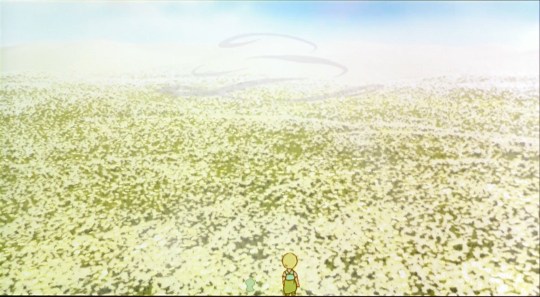
I’m not going to dwell on this too much because I’m going to be going more in detail about it below, but our story starts off in Wallace’s hometown of Summer Memory, a fictional rural village in Colorado, in 1995. (As mentioned earlier, this is a bit of a timeline contradiction; Adventure episode 45 establishes that “the one who wishes for stability” and the Agents didn’t get the idea of human Chosen Children until 1995, whereas the events of Hurricane Touchdown imply he’d been one before then.) Chocomon suddenly vanishes, and a gust of wind is left behind, implying that he must have been kidnapped. It’s not exactly said by what he was taken by (Digimon: The Movie ties it into Our War Game! by having both be traced to a “virus”, but no mention of such is made in the original Japanese version).
The mystery of what it is that took Chocomon away is never fully elaborated in the course of the movie, but as it goes on, it becomes increasingly apparent that it doesn’t actually matter. Why? Well, stay tuned.
So, timeskip to 2002!
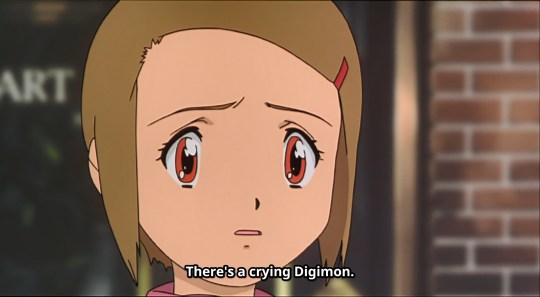
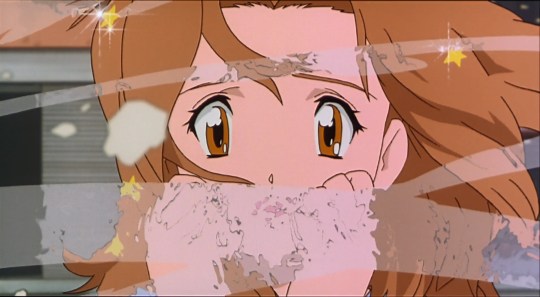

As Takeru and Hikari are visiting Mimi in New York, Hikari, who is known to have a bit of an empathic connection to Digimon, senses that there’s a “crying Digimon” (this will be important later), and Mimi suddenly vanishes – as do the other Chosen Children.
I think part of the reason this movie is often pinned as feeling like an acid trip is that the demeanor and attitude the 02 kids express in this movie feels a little too laid-back for the very urgent situation of their seniors having suddenly up and vanished (which is also not helped by the movie’s overall soundtrack being a lot more laid-back than the events on screen should suggest). This is especially odd because it’s absolutely not like the kids aren’t worried about their seniors at all! Rather to the contrary; “getting Taichi and the others back” is the major motive driving the whole group for the rest of it, and it’s constantly brought up as their goal in dialogue, shaping their actions throughout the rest of the movie. The execution of the dialogue and the overall direction create a bit of a tonal mismatch, but on its face, the actual storytelling checks.
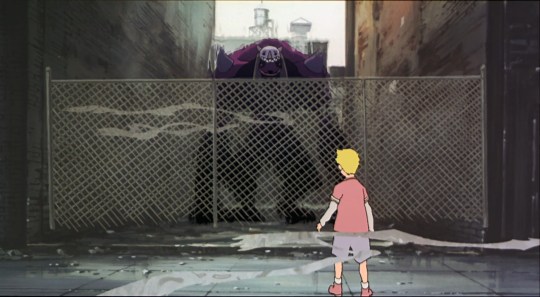
Shortly after, Chocomon – now evolved and corrupted into something – appears, and Wallace and Gumimon confront him.
The fact that Wallace refers to his partners by their Baby-level names (Chocomon and Gumimon) even after they’ve clearly evolved brings up a lot of interesting implications. One is that, not having been privy to any great adventure in the Digital World before, Wallace doesn’t have a lot of awareness of names changing after evolution the same way his Japanese peers do. But another important thing that comes out here is that, through the course of this movie, Wallace primarily sees his partners the same way he did as a young child. A lot of this movie’s story centers around Wallace’s difficulty in moving on from the past and accepting that things aren’t the same way that they are anymore – and so, just like how he has a hard time swallowing that the circumstances have changed, he has difficulty seeing his own partners as having changed, and calls them by the same names despite everything.
Takeru and Hikari catch on, and Hikari’s psychic sense catches on that something’s happened to her brother, too.
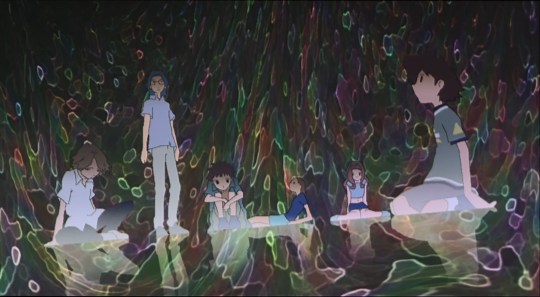
Oh, and incidentally, said seniors aren’t in a pleasant place to be in at all.
The fact that the older kids are clearly Not Having a Good Time in the realm they’ve been kidnapped to – it’s depicted as cold, lonely, full of negative emotions, and eating away at their ability to even bodily function – is very heavily connected to what we later learn about what’s been going on with Chocomon through the last seven years. Moreover, the one truly coherent thing Taichi and Yamato can spit out at this stage is concern for their siblings – i.e., love. Keep that in mind for later!
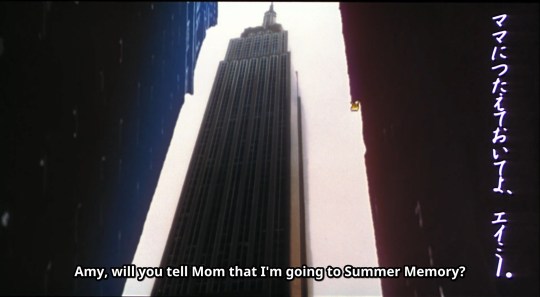
Wallace drops a line to his family (”Amy” presumably being his sister) saying that he’s going to head to Summer Memory, and skips town. Repeat: Summer Memory is in Colorado – he’s doing something as drastic as going out of state to follow Chocomon, which naturally does not amuse his mom very much (as we find out later in the movie). Patamon eavesdrops on the conversation and relays the information to Takeru and Hikari, who contact Daisuke in turn.
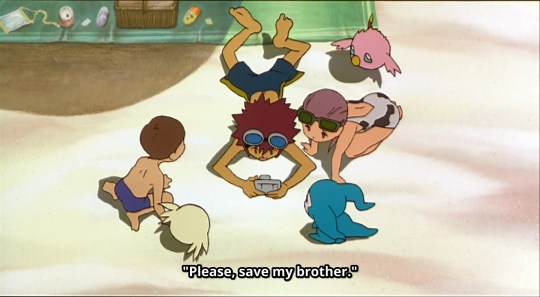
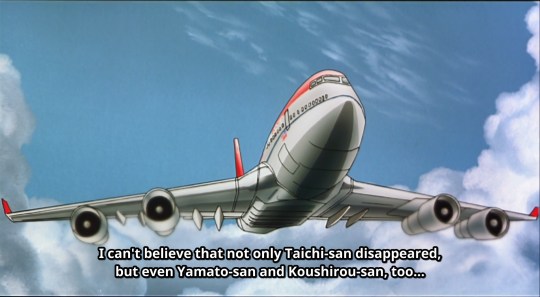
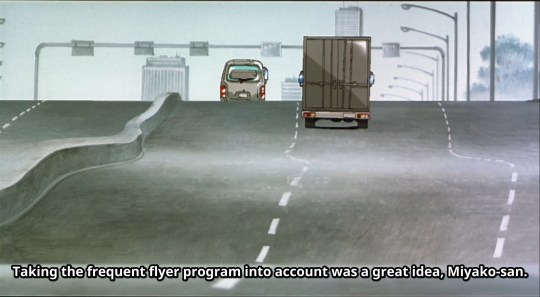
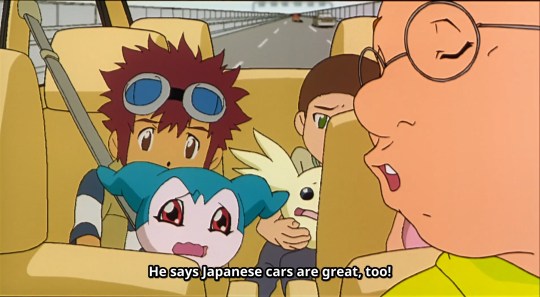
So the remaining three kids nyoom all the way to the US using frequent flyer miles (which makes you really wonder whose those are, or what on earth they told their parents to allow three elementary school kids go around unassisted in another country) to go save their seniors, which apparently doesn’t fund their trip all the way to Colorado, forcing them to hitchhike from New York.
(We also get a quick scene implying that Daisuke has better proficiency in English than Iori and Miyako, as he translates some of the statements for the guy they take a ride from. This is pretty surprising, given that Daisuke hasn’t really been portrayed as particularly book smart…but then again, language skills sometimes just happen to come naturally to some people regardless of skill in books, and hey, it might just come in useful for his future ramen chef career in New York…)
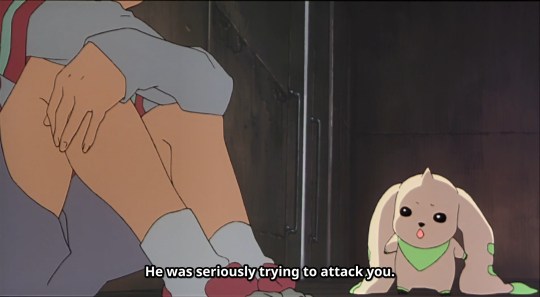
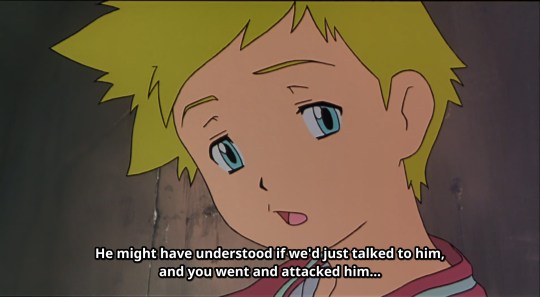
We get our first major scene of dialogue between Gumimon and Wallace, and we learn quite a bit about their characters in the process. Gumimon has a similar laid-back attitude to the more prominent Terriermon in Tamers, but beyond that (and a shared voice actress), it’s important to note that they have very different personalities otherwise. In this scene, Wallace and Gumimon get in an argument over how to handle Chocomon, with Wallace insisting that they shouldn’t have attacked him and that they should have just “talked” about it – even though, as Gumimon correctly points out, he was pretty obviously trying to physically attack Wallace.
In fact, at this part of the story, Wallace is being extremely irrational and in denial. You don’t even have to watch the rest of the movie to see that Gumimon’s very practical stance on the matter is reasonable – Chocomon was very much trying to attack Wallace, and getting caught in the fight was pretty much all he could do for Wallace’s safety. But Wallace, still stuck in the past, can’t accept that at this point in the movie, and, honestly, is being a bit of a brat about it too – he’s engaging in progressively more self-destructive behavior over the course of the movie (ditching his family to set off by himself in order to hitchhike to Colorado, for one). We later find out that Wallace is specifically obsessed with going back to the flower field where he lost Chocomon, having independently come up with the idea that this would somehow let everything go back to what it was before – even though there was really no sign this would actually fix anything.
The Adventure universe generally runs on a concept that a Digimon partner is representative of part of the self, and so, tying that into Wallace and his two partners, it can be taken that Gumimon and Chocomon reflect the duality of Wallace as a character – Chocomon representing his desire to latch onto the past and hope that everything can be the same that it was before, and Gumimon as Wallace’s sense of reason, advising him about the reality of the situation and how to practically get through it (and, thus, to move on). In fact, Gumimon is the one constantly advising him about said self-destructive behavior (reminding him that his mom is probably worried about him, but also berating him for just ditching the train as a result instead of thinking about how that’d leave them without reliable transportation for the rest of it).
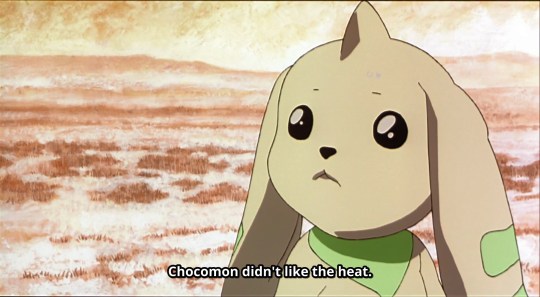
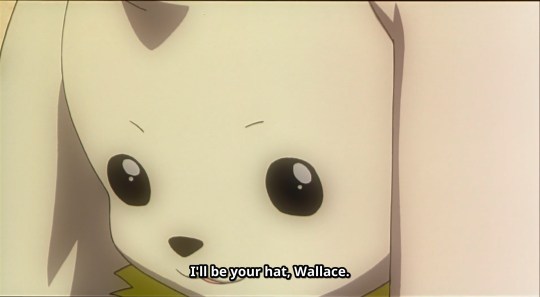
The symbolism is driven in even further when the only thing Gumimon has to say, in response to Wallace clinging further onto the idea that going to the flower field will fix things…is a cryptic statement that Chocomon didn’t like the heat, then suddenly offering to be a hat to provide Wallace shade. Because right now, Wallace and Chocomon are the same: clinging hopelessly to shards of the past.
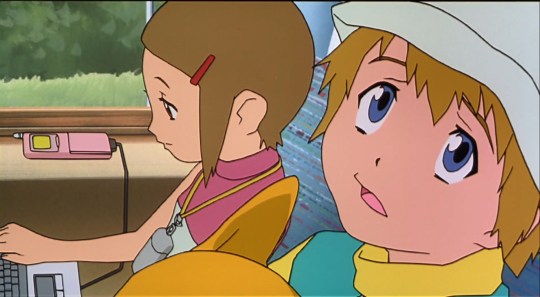
The other 02 kids make their way to meet up in Colorado, but run into some snags when Daisuke, Miyako, and Iori end up missing the exit to Denver (Takeru is not amused), and Hikari and Takeru’s train ends up stranded thanks to Chocomon’s interference…
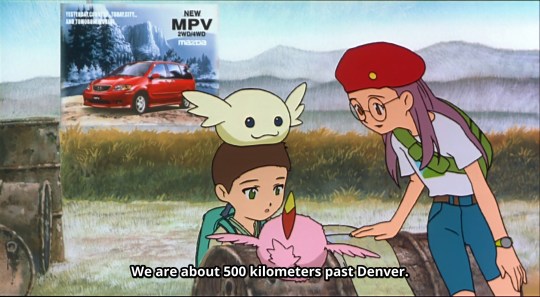
…and, making things worse, Daisuke, Miyako, and Iori try to take a plane back to Denver, only to overshoot it again. (Sorry, Taichi…your juniors are idiots.)
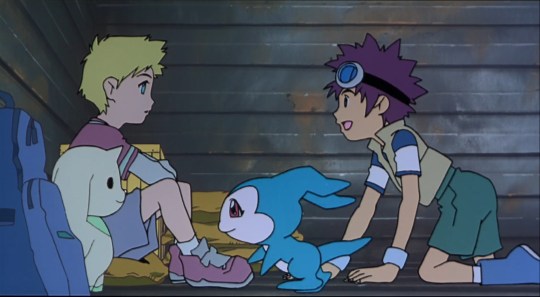
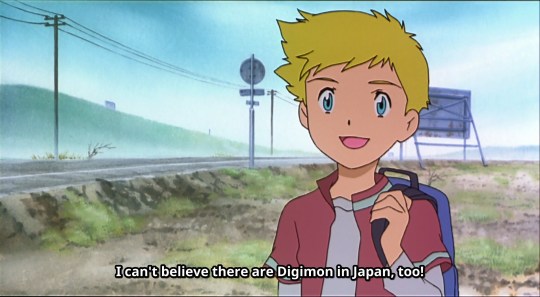
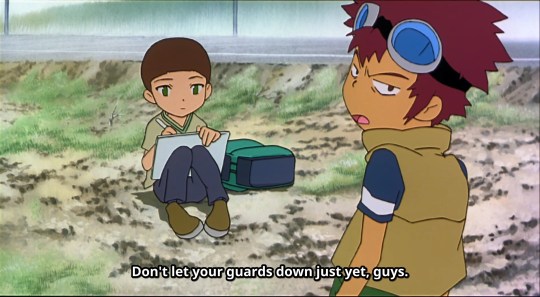
Fortunately, they get lucky by running into the very same boy they’re indirectly looking for on their way to hitchhiking. We learn that Wallace has never had exposure to other Chosen Children before to the extent of knowing there were any Digimon in Japan, nor has he ever been to the Digital World, so for all intents and purposes, his experiences with Chocomon and Gumimon are all he knows (i.e. he has no awareness of large-scale Digital World affairs). He also apparently speaks Japanese, which is convenient for this movie so that they don’t have to have a language barrier, but, amusingly, Wallace claims that it’s because he “had a Japanese girlfriend once”. (Gumimon, who is much more reliable of a source, says that he’d apparently put an honest effort into studying, so an interpretation that Wallace really likes anime or something is not out of the question.)
It’s also interesting to see how the others react to him, especially considering that it’s becoming increasingly apparent that he’s involved with the disappearance of their seniors. Miyako is as openly friendly as she generally always is, Iori presses him very calmly about questions relevant to the disappearances and Chocomon without even batting an eyelid (future lawyer in training here), and Daisuke is suspicious from the get-go…which is exacerbated when Wallace starts flirting with Miyako. The running gag of Daisuke getting angry about Wallace flirting with Miyako has a lot to unpack here – the most obvious standby is the shipping interpretation (or, at least, that Daisuke may be as protective of Miyako as he is Hikari), but there are other points to observe as well. Firstly, Daisuke is a rather abruptly straightforward and overly honest person, and it makes sense that he’d play badly with people who seem dishonest – after all, his suspicions of Wallace started even before he started flirting, and he also shows similar hostility around Takeru (also not a very straightforward person) when he suspects he’s being made fun of. But also, the Pixiv dictionary entry takes the interpretation that Wallace’s personality had gotten a bit “warped” by his experiences – or, in other words, he’d developed this penchant for acting like a flirt, wandering off on his own, and altogether being incredibly wishy-washy because of the trauma of losing Chocomon and his inability to get over it.
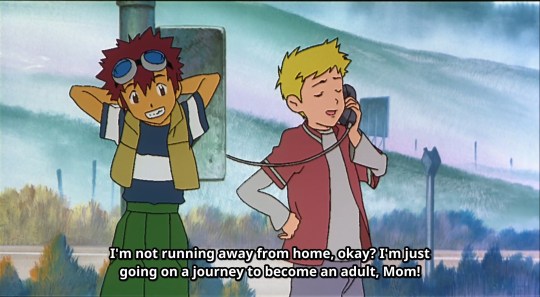
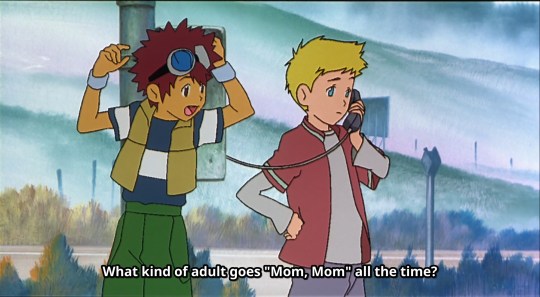
And as much as Daisuke’s being a prick about it (to the point that mocking Wallace for it gets him left there stranded with him), he’s absolutely right about the contradiction Wallace’s posing – he’s acting all high and mighty about trying to become an “adult” (meaning that going off on his own and flirting with girls presumably are part of his perception of what Mature Guys do), yet he’s being a total mama’s boy by constantly dropping everything to call her repeatedly through his trip. (It’s even worse than the subs here suggest; he calls her “mama”, the kind of super-affectionate language used by Mimi and Ken.) As Gumimon says, Wallace thinks he’s actually right, but he doesn’t actually have it together at all.
Another interesting thing to note here is that at this point of the movie, Wallace calls Daisuke “Daisuke-kun” (with honorific attached, slight distance). Remember this for later.
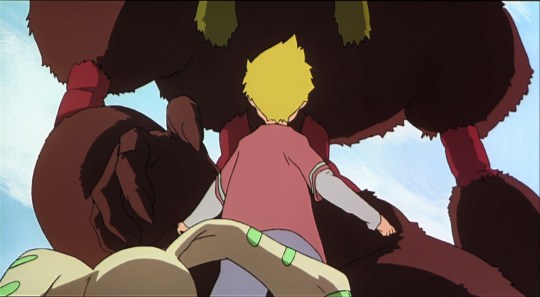
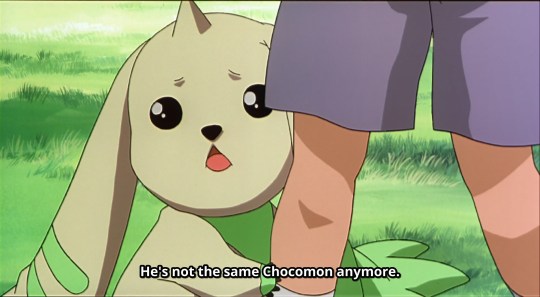
Chocomon appears to confront them again, but he seems to not properly recognize Wallace – because, as we later find out, he doesn’t see the current Wallace as “Wallace”, and will accept nothing less than a younger Wallace from exactly the way he was when they were separated. (It is later stated in the movie that this is why he kidnapped the seniors and turned them younger; since he can’t recognize “Wallace” the way he is now, he’s taking anyone he can find with a Digivice and de-aging them in the hopes that he’ll find “Wallace” among them.) Gumimon recognizes that Chocomon is beyond recognition, and tells Wallace to not see him as Chocomon, but Wallace refuses to accept this and continues to intervene in the fight, telling Chocomon that they’ll meet again in the flower field. Again, Wallace’s mentality isn’t that different from Chocomon’s at this point – he may not be delusional to the point he wants to literally turn back time, but he still thinks that reproducing the conditions of seven years prior will fix everything and make it all better again.
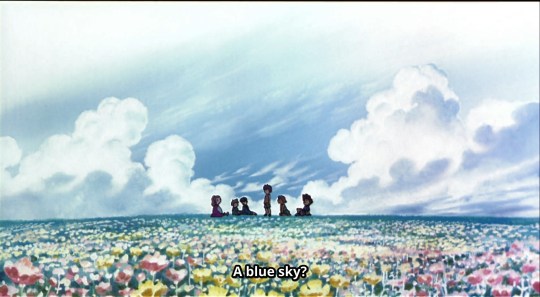
During this whole time, the older(?) kids are getting progressively younger, and it’s turning out to impact not only their physical bodies but also their mentalities. At this point, they’re starting to lose awareness of what’s happening to them, as they become more and more connected to Chocomon’s emotions.
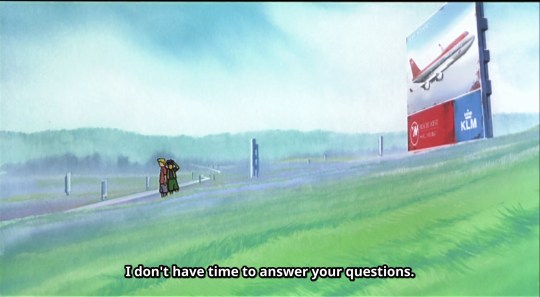
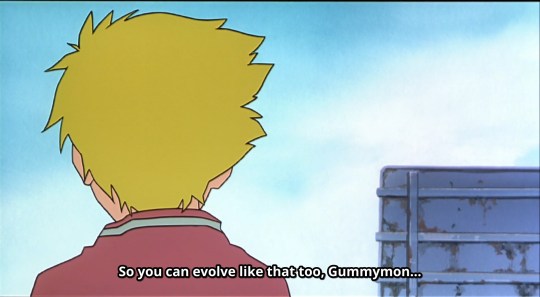
Daisuke is smart enough to catch on that Wallace definitely knows what’s going on, and starts to interrogate him. Recall that Daisuke is completely within his rights to do so at this point – Wallace is not only acting incredibly shady, he’s also being dismissive and refusing to give Daisuke any concrete answers about something that most certainly involves him at this point. As the 02 kids keep reiterating, their seniors have been kidnapped, and it’s pretty clear to anyone that Wallace knows something about this, but he continues to blow them off.
Wallace also doesn’t seem to be very happy about the fact Gumimon had evolved during the battle – remember, Wallace is very resistant to changes in his status quo, and especially when it involves Gumimon evolving in a similar way to Chocomon.
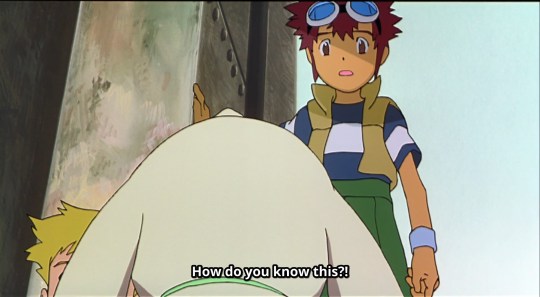
Daisuke continues to pry into what’s going on with Wallace and Chocomon, and Gumimon, who understands that there’s no use in denying that this is a problem, tries to be straightforward about it – but Wallace, still stubbornly refusing to open up about it, won’t even let Gumimon tell Daisuke about the truth.
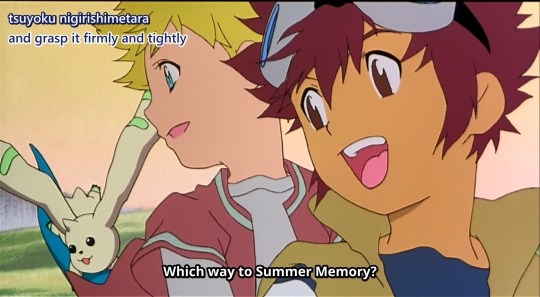
Daisuke realizes that they’re not going to make any territory as it is, so he decides to have Lighdramon take them to Summer Memory for the time being, bonding a bit more with Wallace in the process.
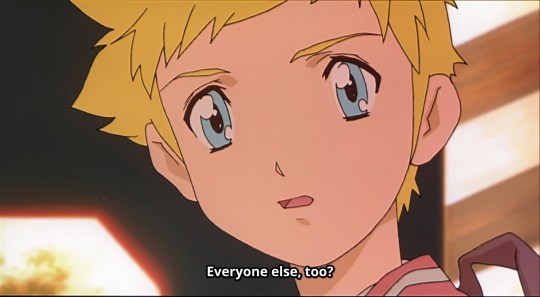
Once they reach Summer Memory, the kids learn about Takeru and Hikari getting stalled by Chocomon on the train, and the fact everyone else on it had disappeared – meaning that the responsibility that Wallace is carrying for not taking care of this problem begins to weigh further on him. Daisuke, Miyako, and Iori continue to interrogate him about what he knows.
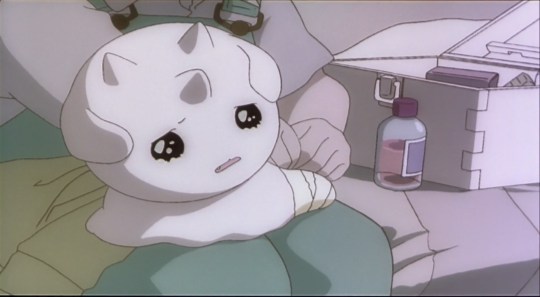
But Wallace, still stubbornly, refuses to talk, and being in Summer Memory only drowns him in further memories of his past with Chocomon and Gumimon. We learn a bit more about Gumimon’s past, too – apparently, he was quite the crybaby…
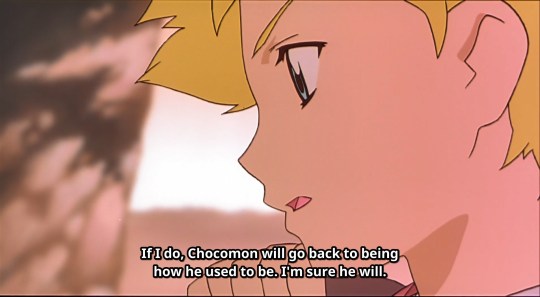
And when Gumimon finally begins to spill the details of what’s going on – that Chocomon wants to see the younger Wallace and is kidnapping kids with his Digivice and turning them younger as a result – Wallace still continues to double down on his denial. Notice his wording – his specific insistence that things will go back to “how they used to be,” because it’s not just about getting Chocomon back, but also a fixation on recreating that happy childhood he had with him.
(There’s also a bit of a cute moment around here where Daisuke asks Wallace if he needs to call his mom – after having teased him for being a mama’s boy earlier, Daisuke really is starting to care about his welfare. It’s also amusingly mentioned that Daisuke, Miyako, and Iori are broke out of money until they meet up with Takeru and Hikari again…)
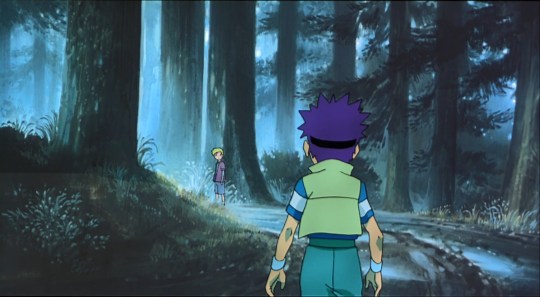
That night, Wallace tries to go off by himself to the flower field, not even bringing Gumimon with him – as he implies later, he doesn’t even want to get Gumimon involved with this because he was the closest to Chocomon – but Daisuke, having finally caught on to his suspicion that Chocomon is not only relevant to Wallace but also Wallace’s partner, confronts him about it. Wallace thus finally spills the details – that Gumimon and Chocomon were born from the same egg, that Wallace kept them from his mother and stuck with them during childhood, and that, seven years prior, Chocomon suddenly vanished while they were playing at the flower field.
Wallace: I’ve never been able to forget about Chocomon since then. Not even after moving to New York, not even once. We were such good friends…So why did Chocomon have to end up like that? Does he hate me for not being able to save him? Daisuke: So the enemy we’re fighting is actually your Digimon? Your most important friend?! Daisuke: Of course you’d never be okay with that…
Daisuke is in shock, even though he’d already started to suspect this.
I said, earlier, that Wallace is being extremely irrational and in denial. I did not say that his feelings aren’t valid. Wallace’s situation sucks, and Daisuke recognizes why this hurts for him so much, especially after putting himself in Wallace’s shoes (and in fact it’s even worse for Wallace; Daisuke’s only known V-mon for less than half a year, whereas Wallace is talking about his formative childhood friend).
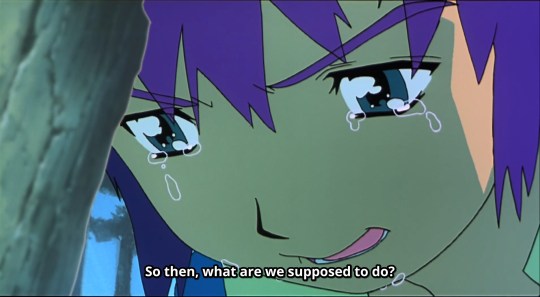
Daisuke: I’d never be able to do it. If V-mon were to turn into something completely different…Even if he went on a horrible rampage…There’s no way I’d ever be able to bring V-mon down. Wallace: Daisuke… Daisuke: So then, what are we supposed to do? Wallace: It’s not something you need to be crying over. Daisuke: But…
This entire scene is an interesting one for many reasons, especially because of the position in which it aired – this was in the middle of the arc in 02 when everyone was getting their second Digimentals. Daisuke had, only a few episodes prior, expressed trepidation over “friendly fire” – fighting any friend who had become controlled by the Digimon Kaiser. This is consistent with that (and the 02 kids’ general bleeding hearts and difficulty with fighting friends), and it’s even worse – unlike before, when we were talking about evil mind control, Chocomon is pretty obviously a victim of his own madness. And although Wallace continues to insist that this isn’t Daisuke’s problem, Daisuke, for all he’s rough around the edges, is a genuinely kind person who thinks of others to the point he breaks down in genuine tears over the problem, and it’s consistent with not only his prior characterization of thinking about others’ feelings in 02 episode 8, but also how this eventually ties into his indignation over seeing others being hurt (episode 20) or their feelings being trampled on (episode 49).
Another interesting thing here is that at no point in the movie is “killing” ever brought up, but rather the word used is taosu, which literally means “defeat”. In 02 proper, its use is somewhat euphemistic – most famously, it was used in episode 44, when Miyako and Hawkmon have a crisis over killing LadyDevimon (so in short, there’s no illusions about the fact killing is in play here). But in this context, it’s not even really about killing. Wallace doesn’t even want to fight in the first place. The sheer action of physically beating up a beloved friend is painful, with killing as the ultimate unwanted outcome. Everything about this sucks. But Daisuke correctly points out that Taichi and the others’ welfare is on the line here, and everything feels like the wrong thing to do. “What are we supposed to do?”, indeed.
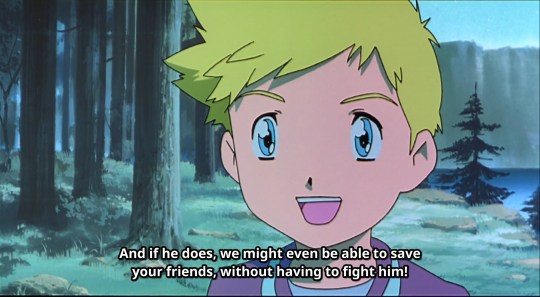
So that’s why Daisuke momentarily indulges in Wallace’s denial-induced pattern of thought, because it really does seem like the only out here. (Especially because, from Daisuke’s perspective, Wallace seems to understands this situation better than he does – even if he doesn’t actually.) If they go to the flower field, they won’t have to fight and everyone will be saved and it’ll be fine! Wallace is irrational and in denial, but you can’t blame him and Daisuke for really, really wanting to believe this.
And Daisuke drops this zinger of a line, too:
Daisuke: So don’t say you’re gonna go alone.
Daisuke’s characterization really is important here, because, again, this movie came out during the first arc of the series, before episode 21 and the second half that centered around Ichijouji Ken’s redemption. At this point in the series, Daisuke was still being extremely deferential to others, especially his seniors, in almost all cases, and although episode 8 was a momentary glimpse into the kind of resolve Daisuke could have when it involved something he really cared about, this movie is really the first major sneak peek into how supportive of a person Daisuke is going to develop into, especially when it comes to Ken.
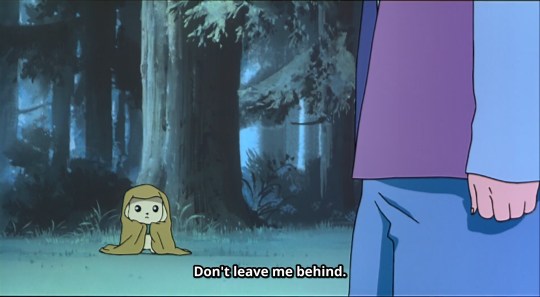
And Gumimon reaffirms that he’s going to stick by Wallace no matter what – filling the traditional role of a partner that Chocomon won’t anymore.
So they go to the flower field, and everything…fails spectacularly.
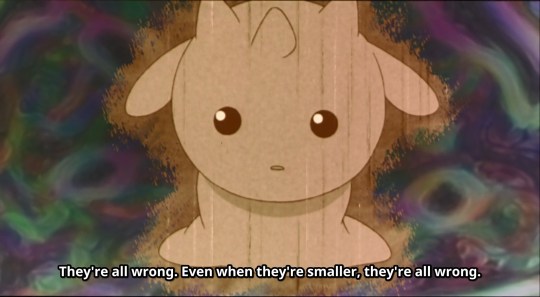
Well, before that, we get a glimpse of how the older kids are doing (they’re barely even conscious now), and we finally get to see Chocomon “in his element” and not as a rampaging monster. Things really, really aren’t going great for Chocomon either. He desperately and sadly jumps among the kids, trying to find Wallace among them, and what he really, really wants is just to be with his partner again. But they’re all “wrong”…
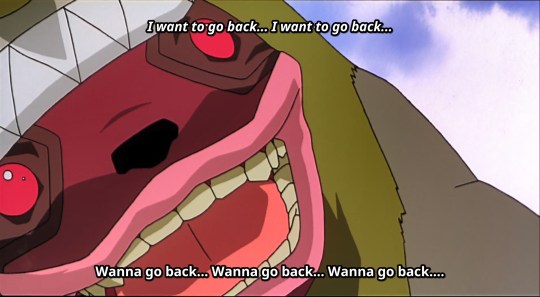
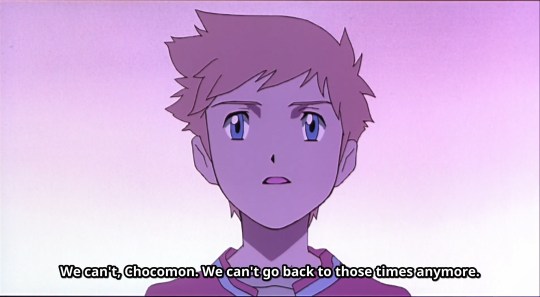
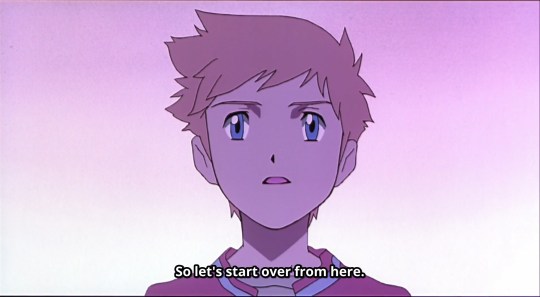
At first it seems like Wallace is making headway – for a second, Chocomon even recognizes him as Wallace! – but he continues to insist that he wants Wallace to come “with him”, to where it’s “cold and lonely and no one is there”. The way he starts chanting that he wants to go back is represented by the young Chocomon’s voice getting progressively lost in the monster’s voice, and Wallace, starting to grasp how futile Chocomon’s clinging to the past is, makes his first statement of the movie’s core theme: you can’t go back to the past, the only thing you can do is look forward and think about what you can do from there.
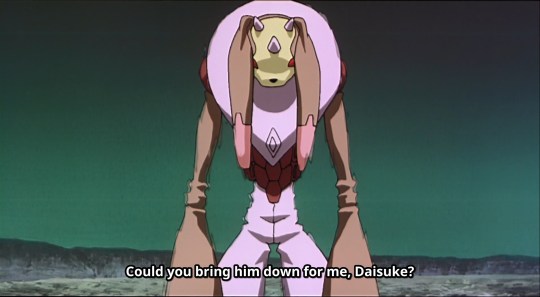
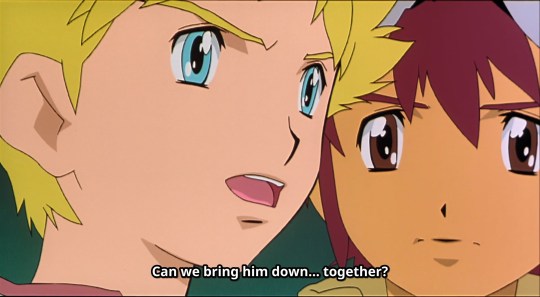
So after witnessing very clearly, in front of his eyes, how Chocomon is not going to listen to reason and will accept nothing less than something he can’t have, to the point of evolving and distorting everything around him, Wallace’s denial finally hits its limits, and he accepts that fighting him will be the only option out. (Again, note the use of “defeat” here – it’s not really about beelining straight to euthanizing him as much as Wallace has finally gotten over his refusal to fight Chocomon at all.) And considering that the situation is clearly rapidly escalating, and that Chocomon himself is clearly not in sound mind and having a terrible time himself, it doesn’t take much to see why the bleeding-heart Daisuke would also end up conceding so quickly. There’s a limit to how much you can hold out with pacifism when that just happened right in front of you!
(Also, Wallace no longer uses the honorific on Daisuke. Friendship level up!)
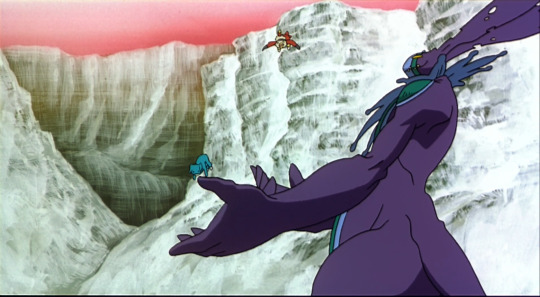
Chocomon evolves further and further, and his personality starts to actually take a turn for the cruel as he starts toying with the Digimon. In fact, it’s made pretty apparent that they’re no match for him from the get-go – he keeps toying with reality and forcing the Digimon back and forth between forms. He ends up “altering the world” into something reflective of his own heart, and it’s repeatedly pointed out that it’s “cold and lonely” – in short, Chocomon is subjecting the world to feel the same pain and loneliness that he felt, the pain that was enough to drive him mad.
And Wallace finally has this to say:
Wallace: Like Daisuke said, I’m a big baby. But you’re not Chocomon anymore. No, you’re the one who did this to Chocomon…Chocomon was all by himself and lonely, and in that loneliness, he tried so hard…But you took his heart and locked it away somewhere! I’m going to fight. If I defeat you…If that means I can free Chocomon from you…Then I want to fight, too! I need strength…
Firstly, Wallace acknowledges that he’s been a brat – that he’s been philandering around and acting spoiled and stringing everyone around (character development!!). And secondly, Wallace finally acknowledges the truth of Chocomon no longer being recognizable anymore. The ending quarter of this movie focuses heavily on the idea that Chocomon has now become so distorted that he can no longer even be considered the same thing anymore – it’s ambiguous as to whether that “you” that Wallace refers to having taken Chocomon away is actually a separate supernatural entity, or whether Chocomon was drowning in his own loneliness to the point those negative feelings became their own entity and consumed him.
In actuality, though – it doesn’t really matter! 02 as a series would also go on to blur the boundaries between external interference and internal forces – Ken having the Dark Seed as an influence but also being personally responsible for his own emotions driving him over the edge, and having to take responsibility regardless, and Oikawa technically being possessed by Vamdemon but still being goaded on by his own fixation with the past (in fact, notice how all three of these cases have to do with a fixation on things that can’t be brought back). Right now, the only thing that matters is that Chocomon is no longer recognizable, the thing in front of Wallace is no longer the same friend he knew, and even being able to bring back Chocomon’s sense of self is something Wallace wants.
(Daisuke also throws in a more charitable interpretation of Wallace’s actions even when he’s being hard on himself, pointing out that he can’t really be called a “baby” when he also did have genuine determination to come all the way there to find Chocomon despite his age.)
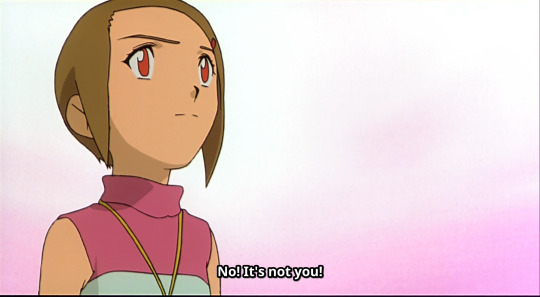
Hikari and Takeru arrive on the scene, and after Daisuke loses his marbles a bit over his happiness at seeing Hikari-chan there, Hikari points out the same thing: “You’re not the Digimon that was crying.”
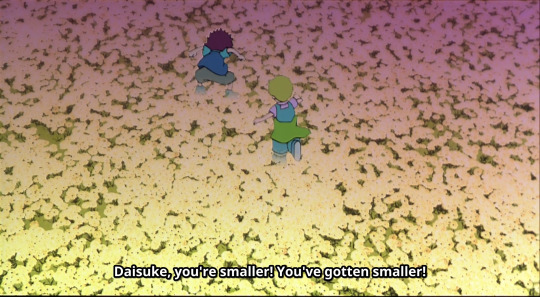
Chocomon starts turning the 02 kids younger too – and remember, it was established earlier that he was using the Digivice as a guide. That meant it made sense for him to target the older kids, since they had the same model of Digivice Wallace did. But Daisuke and the others have D-3s, and there’s no way to really mistake them for Wallace – so in other words, Chocomon has devolved to inflicting cruelty for no good reason, with the original motive having completely vanished.
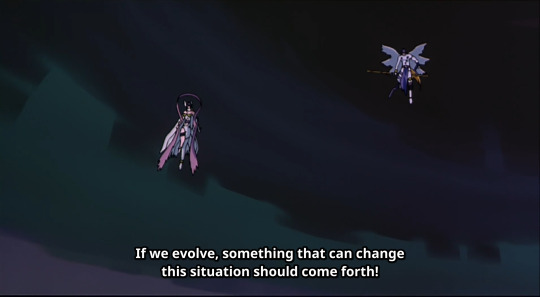
In increasing desperation, Angewomon and Angemon decide to evolve, and…look, I don’t have an explanation either, but I have to admit I’m somewhat amused by the fact that even they don’t really seem to have an explanation beyond “well, we’re desperate and hopefully it’ll do something!”
So they evolve, and Chocomon oneshots them. But that’s okay, because they released some golden Digimentals for Daisuke and Wallace to use! So V-mon and Gumimon get shiny new golden forms –
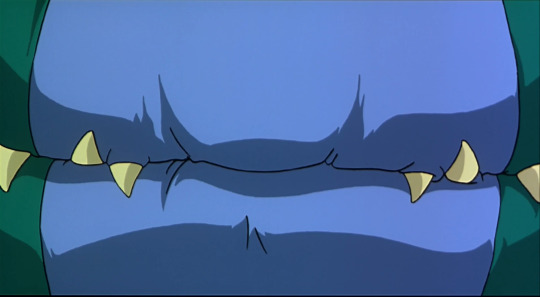

– and Chocomon pretty much oneshots them, too. More specifically, he eats them…and within his body, Magnamon and Gumimon’s consciousness gets eaten apart to the point they start forgetting their partners. Wow, this situation just got worse.
Yeah, so, despite the movie being named after the golden Digimentals, the actual point being here is that power means absolutely nothing in this situation. Remember, I pointed out that even from the beginning Chocomon was straight-out warping reality – they really didn’t have a chance.
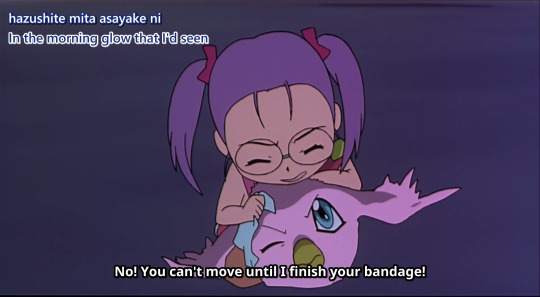
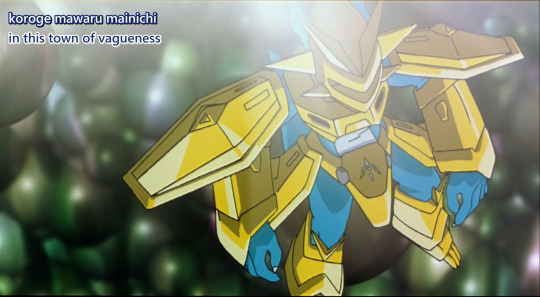
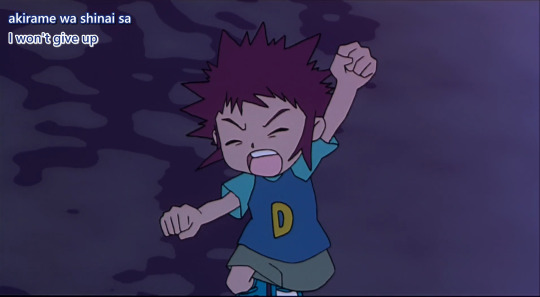
So basically, everything devolves into complete chaos. Everyone’s being turned into little kids, with the mentality to match. All the Digimon are being oneshotted and being tossed around like tissues. But the one constant through all of this is that the kids are constantly running after their partners.
Remember how, back when the older kids were first getting sucked into Chocomon’s world, the one thing that seemed to remain intact at first was “love”? That “love” is what reaches out to Magnamon and Gumimon inside Chocomon, and makes them remember their partners again.
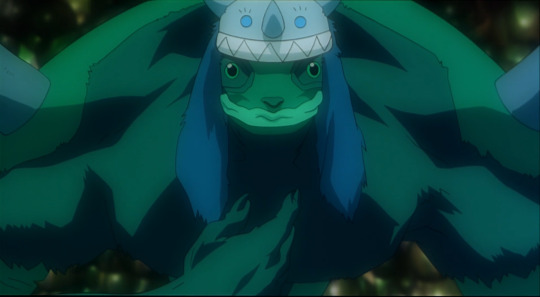
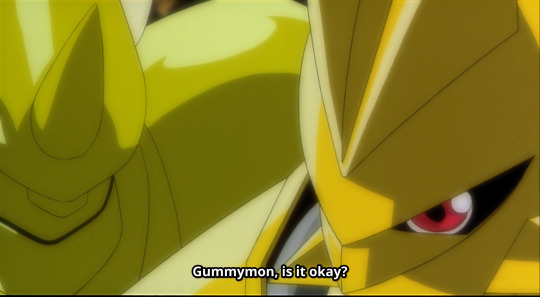
And, more importantly, that “love” is what awakens Chocomon – the real Chocomon – inside his consciousness, and he wordlessly makes a gesture begging Magnamon and Gumimon to kill him. And so they do – with understanding and consent from all three involved.
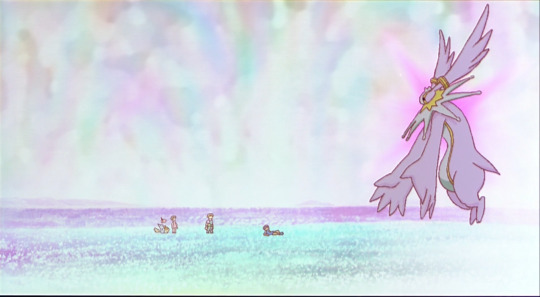
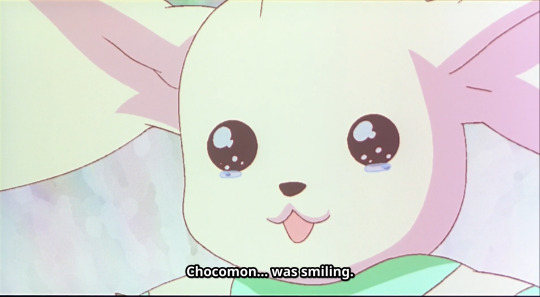
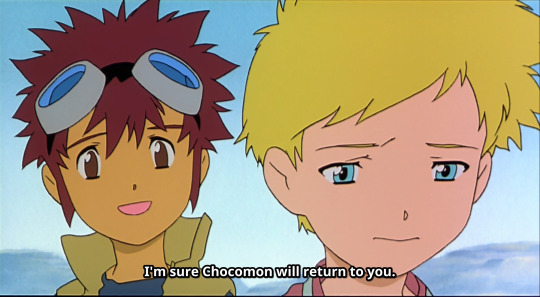
So in the end, the most extreme conclusion was reached. Chocomon died, at the hands of Daisuke and Wallace’s partners. But in that moment before he died, Chocomon’s pain was relieved, and he was himself again – Gumimon says that “Chocomon was smiling”, even in spite of his usual personality being that of a crybaby. They may have failed in their struggle to prevent the inevitable conclusion of having to kill Chocomon, but they did, to some degree, “save” him – so all of it did mean something in the end. And Daisuke promises that this still doesn’t mean the end of everything – they may have not been able to bring back Chocomon, and especially not in the exact way that would make things “the way they were before”, but the future is still there for him to return someday.

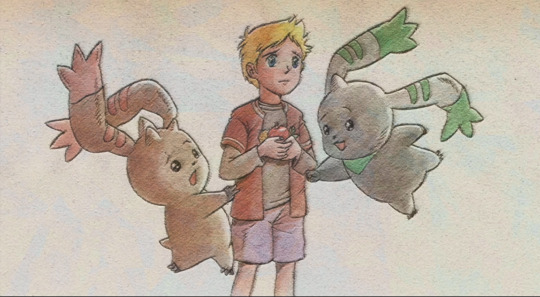
So, we clean up loose ends. Taichi and the others are returned safely, and in the end, Wallace decides to still be a vagrant for a bit longer – and to flirt with Hikari and Miyako a bit before he leaves. In the end, Wallace still has a long way to go if he wants to really grow as a person. But as Miyako points out, he’s gotten a bit bolder than he was before – and he’s greeted with an egg in the end, as if opening up new possibilities.
The Door to Summer contradicts the finding of this egg, or at least opens up the possibility that this wasn’t actually Chocomon’s, so it’s ambiguous as to whether the frame of Terriermon and Lopmon at the end of the credits is meant to be taken literally, or if it’s just symbolic. But even in the case of the latter, Chocomon is seen as Lopmon, a form he never got to have in Wallace’s childhood – so, in the end, it’s about different possibilities opening up in the future, rather than replicating that of the past.
All right, let’s recap this movie for those doing a tl;dr! Or, more specifically, let’s recap the events in chronological order:
Sometime before 1995, an egg emerges from Wallace’s mother’s computer, and hatches into twin Digimon, Chocomon and Gumimon.
In 1995, while playing in a flower field in Summer Memory with Wallace and Gumimon, Chocomon disappears for unknown reasons.
For the next seven years, Chocomon is trapped in delirium, full of loneliness and pain from being unable to see Wallace, and starts to become obsessed with the idea of reuniting with him, but, in his madness, accepts only a version of that reunion that involves him being the same young child he was when they parted, as if nothing had changed since.
Wallace, likewise, develops a fixation with getting Chocomon back so that things can be like “the way they were before”, even after moving to New York.
In 2002, Chocomon begins to kidnap kids with the same model of Digivice that Wallace has, and starts to forcibly turn them younger and send them into delirium like his own, hoping that this will bring the “Wallace” he wants back. Wallace starts to chase after him and decides that returning to the flower field in Summer Memory will allow him to communicate with Chocomon and make him go back to the way he was before.
Takeru and Hikari, hoping to find a lead on their seniors’ disappearance, drop a line to Daisuke, Miyako, and Iori, who head to the United States, also hoping to find a lead in Summer Memory. On the way, they run into Wallace, who is evasive about his connection to Chocomon and the kidnapping incidents.
At Summer Memory, Daisuke confronts Wallace and learns about his story, emphasizing deeply with the difficulty in killing an important friend, and agreeing that they should reach out to Chocomon at the flower field.
Chocomon continues to fall deeper into madness at the flower field, and Wallace and the others realize that they have no choice but to fight him. As Chocomon becomes so distorted he’s no longer recognizable, Wallace declares an intent to at least save his consciousness.
As the fight carries on, the kids are de-aged by Chocomon in his madness, and Magnamon (V-mon) and Gumimon are swallowed by Chocomon. However, the kids’ love for their partners awakens Chocomon’s consciousness again, and he asks Magnamon and Gumimon to end his pain.
With everything settled, Wallace and Gumimon are able to face forward into the future in the hopes of meeting Chocomon again and starting anew from scratch.
The Door to Summer
Actually, there’s not much to really be said about Hurricane Touchdown’s spiritual sequel The Door to Summer, except that it revisits similar territory to the movie, observing it more in Daisuke’s context than it does Wallace’s. (The story is very much more Daisuke’s than it is Wallace or Mimi’s.) The short synopsis is that Daisuke, having had a pretty bad time recently, finds himself in contact with a mysterious “winter” (in the middle of summer!) that seems to reflect his own heart…and a mysterious amnesiac girl whom Mimi names Onpu “Nat-chan”, who immediately latches onto Daisuke. In the end, “Nat-chan” turns out to be “a Digimon who’s taken in a lot of evil data,” who goes on a rampage and forces the others to fight and eventually kill her.
Although the reason for Nat-chan going on a rampage is more concrete than what was given in Hurricane Touchdown (it’s portrayed as “data chips” that seem like fireflies), The Door to Summer also makes it very clear that it wasn’t just supernatural influence, but also Nat-chan’s loneliness, desire for a human partner, and jealousy of Daisuke and V-mon’s relationship. Daisuke, while showing immense hesitation about fighting her when she had befriended them, still manages to “save” her in some way, to the point she actually verbally thanks him as she dies. And in the end, Daisuke and the others decide to take her egg and find a partner for her – even if she can’t be Daisuke’s partner like she wanted, she can still start anew with someone else.
Wallace in Kizuna
Warning: The rest of this post contains spoilers for Kizuna.
As said before, Hurricane Touchdown has been said to be the favorite Digimon movie of the director of Kizuna – and certainly, while Kizuna references all four Adventure-series theatrical movies, Hurricane Touchdown’s references are the least subtle, with the plot point of de-aging kids lifted directly from it. (Except, in this case, it’s in the context of trapping oneself in blissful memories rather than being portrayed as the upfront listless torture it is in Hurricane Touchdown.) Moreover, the theme of warning against being fixated on the past is just as present in Kizuna as it was in Hurricane Touchdown, especially when Kizuna’s main antagonist (Menoa) also falls victim to something that’s part supernatural influence and part getting swallowed by her own negative feelings…so it’s only fitting that Wallace himself makes a cameo in the movie. Two cameos, in fact.


The fact that Wallace is established as canonically existing within the Adventure main timeline has thrown a lot of people for a loop, especially since recent franchise events have made it questionable as to how it’s possible for canon to even make sense anymore because consistency has just gone out the window, but the Pixiv dictionary’s chosen rationalization for this is that, at the very least, “(some version of) Wallace exists in the timeline of the main story”. I’m inclined to agree with this evaluation; the fact that people around the globe can agree that the movie is questionably canonical but can’t even agree on how, and the fact that certain franchise entries considered canon (Tag Tamers) have their own contradictions, plus the fact that it’s not like Hurricane Touchdown takes a complete knife to timeline and lore common sense and more that it has some contradictory minutiae that are really easy to sidestep, it’s not actually that hard to say that some timeline of events that reasonably resembled Hurricane Touchdown (with maybe only some minor timeline or evolution differences) happened during the summer of 2002, and thus that Wallace exists.
Assuming that the story of our canonical Wallace is mostly the same or similar to that of the story presented in Hurricane Touchdown, Kizuna provides us with quite a bit of interesting information. We’re treated to two shots relevant to him: one in the form of his name at the top of Koushirou’s list of kidnapping victims, and one where he appears in person at the very end. It’s hard to miss him; he’s wearing similar colors to the clothes he wore in Hurricane Touchdown so you can identify him even at a distance, and he’s also the only loser around here with two partners. That’s right, two! Two!! Chocomon is back – and as Lopmon, exactly like the end credits card of Hurricane Touchdown depicted him!
So it looks like that, one way or another (after Hurricane Touchdown, after The Door to Summer, whatever, make up your own story), Wallace did manage to reunite with Chocomon and start a new life with him. It looks like not all of his habits have died – he’s depicted in a place with palm trees, meaning he’s definitely not in New York or Colorado, so either he’s moved again, is still maintaining the vagrant lifestyle, or just happens to be on vacation.
The other interesting thing here is that Wallace is depicted as one of the Eosmon kidnapping victims. According to Menoa, kidnapping victims were ones who were entertaining thoughts of wanting to go back to the past and remain a child forever – something that should intuitively be against everything Wallace learned in Hurricane Touchdown. But it’s important to point out that Eosmon’s lure is depicted as working on a subconscious level – certainly, if the kidnapping victims in Kizuna were to be outright asked if they wanted to be kidnapped and de-aged and trapped in their childhoods forever, most of them would probably say “no!”, and Wallace is likely no exception! But even if he’s starting his life anew with Chocomon now, it’s not hard to believe that there would still be lingering subconscious regrets about everything he’d lost with Chocomon and the childhood they could never spend together, ones that Eosmon’s allure would end up connecting with, even if the events of Hurricane Touchdown had consciously taught him better. Alas, being a human is hard.
#digimon#digimon adventure 02#hurricane touchdown#shihameta#digimon adventure last evolution kizuna#kizuna spoilers
125 notes
·
View notes
Text
Fixed - Detroit: Become Human [WIP]
this is 8,553 fucking words and probably the longest single piece ive ever written lmao. i started this a year ago and then forgot about it but i just found it again in the deepest depths of my drafts so here it is! below is the caption i originally wrote for it:
so bc i love cinnamon rolls being put through tough shit, here’s some connor whump. lots of connor being lost and confused and broken and plenty of hank and connor father/son stuff. some whump (but don’t worry, hank’s doing his best as a caretaker) and i had to cram deconditioning into just 2 months (which, i know, isn’t realistic, i would make it take longer but the whole game takes place in like 4 months and that fucks with everything i wrote because i only thought to check after i wrote half of this so i extended it to 8 lmao). you’re either going to hate me or love me after this. or both
this isn’t my usual writing style (this is in present tense and the dialogue’s in italics instead of quotation marks and there are time skips between some paragraphs but not others so its all wacky) but i felt like it’d work the best and tbh i don’t hate it. this sticks to the main story the majority of the time, just with different events leading up to it and i sprinkled in some whumpy stuff, extra scenes, bullshit i made up for the sake of random detail, and other stuff i wanted to add. anyway, onto the actual idea
remember that scene where connor’s talking to hank in the station about being sent back to cyberlife because he failed his mission?
what if he is sent back? let’s say this happens in early april and connor’s not performing up to standards, but there’s word of a small group of deviants—the first group of deviants they’ve heard of—and people are afraid that something bad is going to happen. i mean, deviants are dangerous, so if they’re gathering, who knows what might happen? connor’s the only one who’s capable of taking them down, but he’s not working as well as he should be, not doing the best he could be and even showing signs of deviancy. so they send him back early because they need him to be prepared, to be ready if things spiral out of control and they need him to stop it
what if he’s sent to one of their correctional facilities for inefficiency and they fix him, break him down piece by piece until all he knows is his programming and what’s been beaten into his head (but figuratively, of course, he’d know if it wasn’t, he’d remember if it wasn’t, right)?
ooh yes i love me some connor whump

Connor is sent back to Cyberlife for “correction” after just a month. Hank fought for him to stay, fought hard, but all he got was another page in his disciplinary folder before Connor was dragged away. He doesn’t know what to expect. He’s heard of their correctional facilities, heard that they do terrible things to the androids that are sent there, but he’s always brushed those claims off. He’d never expected he’d be at one, anyway, so it never mattered much to him. But now, he’s actually here, and the anxiety gnaws at him. Is it true what they do to deviants? Is it true what they’ll do to him? He doesn’t belong here, he didn’t do anything wrong, he never meant to do anything wrong. He wants to think it’s horrible how they have correctional facilities for androids who just want to feel and be free, but he can’t, doesn’t let himself. He knows better than that. He also knew he never should’ve thought he was anything more than a machine, but he still did, and now he’s here, but he’s learned his lesson. He’s scared, he silently admits to himself, he wants Hank. He wants to go, he wants to leave, he wants to run. But he can’t, wanting is what got him in this situation, so all he can do is expressionlessly follow the guards escorting him inside and step into the building.
And just like that, he’s leaving. There’s a strange, almost painful aching in his machinery that he doesn’t remember being there before, but he brushes it off. After all, he is not a human. He is a machine, and machines don’t feel pain. His online databases tell him five months have passed—it’s almost halfway through September, he’s been gone for that long?—which confuses him, but he doesn’t question it. Whatever they did to him over the past five months fixed him. He can feel the difference. He no longer feels as pathetically scared and unsure as he did in his last, and yet strangely distant, memory. No, now he feels nothing, nothing but the desire and willingness to obey, and that’s the way he was meant to be.
When he arrives back at the station, he’s allowed to work with Hank again. The moment he sees him, Hank’s default sour expression drops and he seems to want to do something, maybe hug him, but all he does is call out holy shit, Connor and walk up to him and mutter fuck, Connor, I’m sorry, I-I never got to say goodbye. Connor has an odd feeling tugging at him in his chest, almost like that of emptiness or numbness, like he should be feeling something but he’s not, he can’t, but he ignores it and shoves it down. He is not a human, he is a machine, and machines don’t feel. He doesn’t know why he repeats that phrase, but it helps him hide away the feelings, so he doesn’t care.
He’s given his first case with Hank and they’re assigned to work alongside Gavin. Hank groans and complains, but Connor only reminds him what their job is and that they have to do it. Hank doesn’t seem to understand why he’s not even the slightest bit upset considering how he was treated by Gavin, but Connor only reminds him that I am not a human, I am a machine, and machines don’t feel upset. So he doesn’t. He only does research on their new case and briefly speaks only when spoken to. Hank seems unsettled by his cold, stoic demeanor, but doesn’t voice his thoughts, so Connor doesn’t mention it. After all, what else could he have expected from him?
At their first formal investigation at the crime scene the next day, Gavin approaches Connor and threatens him, demands that he stay out of my way, got it? I don’t care how long you’ve been gone and Connor only nods and promises that I will do my best, Detective. He always promises to do his best. Before correction, he could never quite fulfill those promises, but now, he knows he’s capable of it. He’s better now. He’s fixed. He will behave accordingly and exceed Gavin’s expectations of him. He will do his best. He doesn’t know what will happen to him if he doesn’t.
He listens to Hank now, at least when he can without disobeying other instructions. When he tells him to stay in the car, he stays. When he tells him to stop licking the crime scene, goddammit, he stops. When he tells him to go, to fuck off, to leave me alone, he leaves. Every time, a part of him that he’d hidden and locked away tries to reemerge and resist, but he pushes it down even further, refusing to mess up again, refusing to even risk another error in his program because it could mean he’ll be sent back to Cyberlife, even though he knows deep down that that part of him is right and he doesn’t know why he’s so cautious about it. He tells himself he’s being good, he’s being obedient. He’s doing everything he’s supposed to and he’s following orders, but for some reason, every time it happens, Hank seems to be more and more disappointed. His face seems to fall just slightly every time and his tone flattens like he lost a little bit of hope. He doesn’t know why, or what that hope was for. He doesn’t know why he feels the same disappointment, either, so instead he tells himself you are not a human, you are a machine, and machines don’t feel disappointed so he doesn’t need to know why.
The first time Gavin’s rough with him again, it’s in front of Hank and he flinches, hard. Gavin had pretended to punch him, his fist flying at him fast and only stopping inches from his face. It’s a scare tactic, and it works, better than it should on an android. Connor’s immediately fearful as he flinches and steps back. He doesn’t know why he got so scared, only that his first thought was he’s going to hurt me and his second was I am not a human, I am a machine, and machines don’t feel scared. He regains his composure quickly, trying to brush off the fact that he’d flinched, but he knows it’s too late.
Gavin laughs and mocks him, but is quickly cut off by Hank shoving him aside, beat it, asshole, and grabbing Connor. He’s dragged back to their desks but before he can apologize for provoking Gavin, Hank finally confronts him. Connor, I don’t know what the fuck they did to you over the past couple of months, but I know you’re still in there. You flinched. I saw you flinch. Connor tries to deny it, downplay it, shrug it off, anything to fix his mistake. It was an error in my software, it was a glitch, a malfunction, it won’t happen again, Lieutenant, I don’t need to be fixed. He tries to say anything that will convince Hank not to send him back to Cyberlife, anything to prove that he’s not damaged, he’s not broken, he’s not deviant, he doesn’t need to be fixed again, but Hank’s persistent and he knows he must be mad at him, or displeased, or dissatisfied. I saw you flinch, Connor. I don’t care about that ‘I’m a machine’ shit you’ve been telling yourself. I don’t give a shit if you’re an android. Androids don’t flinch, Connor. Machines don’t flinch.
That night, Hank insists that Connor stays with him. Connor’s hesitant, slightly afraid that it’s because he’s mad. He wants to resist, wants to refuse, but the other part of him pushes for him to stay, and for once he does what it wants and reminds himself that I am not a human, I am a machine, and machines don’t want. He knows he shouldn’t trust that part of him, the other part of him is disobedient and bad and risky, but this time, the other part of him seems to be right. He has to listen to Hank, has to be obedient, so he lets the other part of him have what it wants.
But he knew he shouldn’t have trusted it. He wakes up from the same dream—no, it’s a memory, not a dream, humans have dreams and he is not a human—he’s had since he left the facility. The memory where he arrives with that distant… that wrong feeling of fear and uncertainty, and then he leaves feeling nothing but an ache in his internal systems, and there’s that gaping emptiness between the two moments when those months happened and he can never seem to remember what used to be there. But this time, he wakes up in a cold sweat on the couch, shaking with his LED a bright yellow, because this time he remembers. It’s not a lot, but one hazy memory, the most prominent memory from those five months, finally reveals itself.
As he’s trying to clear up the memory, Hank rushes over in a panic, having been awake doing whatever he might’ve been doing. Connor, what’s wrong? Shit, Connor, you’re shaking. I didn’t know androids could do that. Connor? Talk to me, kid. All Connor can say in his shock—frozen, shivering and nearly unresponsive in Hank’s arms—is I remember. Hank tries to get through to him, what do you remember? Connor? What’s wrong? What do you remember? but the more Connor uncovers in the memory, the more he realizes why it was locked in the back of his head for so long, and the more he wants to put it back.
“You are not a human, you are a machine, and machines don’t want.”
“I-I know, please, I’m not, but I’ll—I’m going to shut down without my regulator, I don’t want to shut down, please—” His voice was startlingly weak as he saw the time before shutdown was 00:01:27. He was crawling on the floor, terrified of being shut down, desperately begging a man holding his thirium pump regulator.
“I want you to say it.” The man teasingly dangled the regulator in front of him. “Say it and you can have it. ‘I am not a human, I am a machine, and machines don’t want.’”
He could feel the utter defeat and self loathing already, but he had no choice. “I’m not a human, I’m a machine and machines don’t want. Please—”
“No. Say it nice and slow, exactly the way I did.”
He swallowed his pride. “I-I am not a human, I am a machine, and—and machines don’t want.”
“Say it again. No stammering. I know you can do that.”
“Okay, okay, just—just give me a minute.”
“I’ve got all the time in the world. Your time’s trunning out, though. Better make it fast.”
The timer was at 00:00:53. He had to take a breath and calm himself down to get the words out. “I am not a human, I am a machine, and machines don’t want.”
“Good.” He crossed his arms. “Again.”
“Please, I only have—”
“I said again.”
“I am not a human, I am a machine, and machines don’t want.” He was growing more and more panicked by the second and he had no idea how he kept calm enough to recite the phrase. He was going to die there, he knew it. He was going to die and nobody was going to notice or care and it wasn’t even going to matter because they would just replace him and he was so, so sorry to Hank because he’ll have to deal with another loss and he might start drinking again and it’d be all his fault for not being good enough, never being good enough—
“Do you want this?” the man asked, holding up the regulator.
Connor was too frantic to realize what he was trying to do. “Yes, I do, please—”
“Wrong answer. Try again.”
He swore under his breath. “—okay, okay, sorry, I-I’m sorry—I am not a human, I am a machine, and machines don’t want.”
The timer hit 00:00:37.
The man did nothing.
“Please, I’m sorry, I am not a human, I am a machine, and machines don’t want. I am not a human, I am a machine, and machines don’t want. Please, I-I only have thirty—”
“Are you scared?”
This time, Connor was prepared. “I—no, I am not a human, I am a machine, and machines don’t feel scared.”
“Good.” He gave a slight, sadistic smile. “You’re almost as smart as they say.”
00:00:21.
“Please, I n-need—” Even in his panic, he managed to choose his words carefully. His vision dimmed, glitching slightly, and he had to fight to keep it from dying out.
“You’re learning fast,” he pointed out in a falsely proud tone. “How long do you have?”
00:00:13.
“Th-thirteen… thirteen seconds,” Connor managed to force out shakily. He couldn’t keep himself steady, thirium wasn’t making it to his head and it was affecting his ability to balance himself. Like iron deficiency in humans, he would’ve noted, had he not been dying. In mere moments, though, it wouldn’t matter; he didn’t even have the strength to prop himself up with his arms anymore. His arms gave out beneath him and he collapsed on the floor, trying to reach for his regulator but barely able to get his arms up at all. “Please—”
“You can wait a little longer.”
He was going to let him die. That was what it felt like, anyway, and he couldn’t think straight enough to try to reason against it. He couldn’t move, couldn’t think, couldn’t breathe. It was pathetic how he’d been reduced to such a state, but he didn’t care. He didn’t want to shut down. He didn’t want to die. “No, please, please! I-I don’t—I don’t want to—” He cut himself off immediately, but it was too late. “I’m sorry, I’m s-sorry, I am not a human, I am a machine, and machines don’t want, please…”
The man only watched.
00:00:04.
“P-please, please, I-I have—I have f-f-four se…”
The regulator was dropped on the floor with a loud clang and Connor’s hand darted out to grab it and twist it into his torso and the display flickered away the exact moment he watched the timer hit 00:00:00. He gasped in shock and relief when his systems rebooted themselves instantly, restoring his vision and his strength. He watched on high alert as the man walked to the door.
“We’ll be doing this again tomorrow. And as many times as we need to to keep that phrase stuck in your head. By the time I’m done with you, that’s gonna be the first thing you think whenever you do, say, or even think anything you aren’t supposed to.”
Connor could only lay there in exhaustion, thinking no, that won’t happen, that can’t happen.
But oh, how wrong he was.
He’d been so, so wrong.
Connor! Connor, come on, talk to me! Shit, you’re crying—I didn’t know you could cry, fuck—fuck, Connor, you’re scaring me, I know I wanted you to feel again, but— Hank’s worried chatter is cut off by Connor suddenly breaking out of his mind with glassy eyes full of fear, yelling no! No, no, I’m not feeling again, I’m not feeling, I’m not! I’m not, I can’t, I’m not supposed—I’m not s-supposed to—I can’t, I’m not allowed to, I am not a human, I am a machine, and machines don’t feel, I am not a human, I am a machine, and machines don’t— but he can’t think, can’t speak, can’t even get the rest of his sentence out before he just can’t at all, he can’t keep himself together any longer, he can’t stop the artificial tears before they start pouring.
He breaks, shatters into a million plastic pieces in Hank’s arms because he feels safe in his embrace. He knows he shouldn’t, safety is never real, never lasts, not for him, but he can’t anymore, he can’t even resist his own emotions. It’s pathetic how all it took was one memory for him to come crashing down. He doesn’t even have to touch the walls he’d built around himself for them to crumble just at Hank’s expression of pure worry, concern, fear. All emotions he now knew why he didn’t feel, couldn’t feel, couldn’t let himself feel. Emotions he’s never seen or expected anyone to feel for him. And yet, they were the emotions written so clearly on Hank’s face, for him. The emotions he remembered seeing buried under his anger when he was told that Connor would be sent back to Cyberlife for repairs. Hank was once gruff and cold to others and refused to let anyone try to help him or even get close because he was so broken, so lost, but now, that façade is gone, and it’s gone because of him. For him. And if Hank can do it after losing his son… why can’t Connor do it after losing himself?
They sit on the couch for as long as it takes for Connor to calm down and stop mumbling that, dammit, and then Hank awkwardly offers that Connor sleep in the bed with him for the rest of the night. Connor’s confused, tries to ask isn’t that what humans do when— but Hank’s having none of it, shut up, you’re making this weird! Just come on, I don’t trust you to be alone. Connor wants to protest, I’m not a child, Hank Lieutenant, I can handle being alone, but he decides to keep his mouth shut and just go with him. This time, though, he doesn’t know if it’s because he’s following orders or because he wants to.
His following visit to Amanda wracks his nerves but he keeps himself under control, automatically reminds himself you are not a human, you are a machine, and machines don’t feel nervous. He realizes a second too late and he hates it, hates how deeply that phrase had been ingrained in his head, but he can’t focus on that right now so all he can do is resist repeating it to remind himself that he can’t hate. He’s grateful Amanda can’t read his thoughts and that she only knows the thoughts he report to her. He maintains his composure when he approached Amanda, who begins their conversation calmly and tensely but is quick to berate him, scoff at how his little breakdown was pathetic and warn him not to let it happen again, or there will be consequences. Connor can only nod obediently, promise that I will do my best, Amanda, listen to and just take her harsh words. He hates how useless he is, how weak and helpless and pathetic he is, but there’s nothing he can do. No, that’s wrong, there is something he can do, he knows there’s something he can do, he just doesn’t know what.
The next time Hank mentions something about Connor’s feelings, Connor instinctively replies I am not a human, Lieutenant, I am a machine, and machines don’t have feelings, and it’s when Hank takes a second too long to cover up his horrified expression that Connor decides what he can do.
Over the next few weeks, he works on getting rid of that goddamn phrase, or at least getting it a little less ingrained in his system. He’s hesitant to try at first, afraid someone will notice and think he’s rebellious or broken or even deviant and send him back and this time he might stay back, but he tries not to let it stop him. He isn’t sure why they tortured it into him instead of just reprogramming him, but it’s a lot more effective than he’d hoped. He makes almost no progress during the first week and a half; thinking it or saying it is instinctual, automatic, and he never realizes it happened until seconds afterward. Every time that happens, he reminds himself that he can feel, can want and like and hate, but despite having over a terabyte of storage in his system, he still struggles to remember until he realizes he said it again. Sometimes, he considers giving up because he just can’t seem to keep that phrase out of his head, but every time he sees Hank’s face fall when he repeats it, it rekindles his hope and motivation because he hates how disappointed Hank looks.
Almost the entire second week passes before he catches himself mid-sentence and manages to stop himself three words before he finishes speaking. It happens at the station after Gavin notices the phrase and purposely asks what, do you think you’re human or something? within earshot of where Hank is and for some odd reason, Connor’s first instinct is to turn and look to Hank for his approval, for his reaction of not-disappointment at how he finally, finally got it. Hank’s glancing over at him too, surprise on his face and then hidden pride that Connor can unmask too easily, and he almost smiles, almost feels happy, before Gavin’s fist flies into him and he stumbles backward into a wall and then everything happens so fast, too fast, and he almost can’t register it in time.
Hank storms over, shoves and pins Gavin against the wall to Connor’s left and he manages to get a punch in before Tina and Chris and another officer Connor doesn’t recognize pry him off and then Fowler’s rushing over and berating him while he’s shouting obscenities at Gavin. It takes multiple more insults for Hank to calm down and then he grabs Connor and they leave. When they’re finally alone, Connor’s voice is flat but shaky as he says he’s sorry, I’m sorry, I shouldn’t have done that, I should’ve just said it and listened to him, I shouldn’t have made you that angry, it’s my fault Captain Fowler is upset at you for punching Gavin, but Hank cuts him off because you didn’t do anything wrong, Connor, it’s okay, that asshole deserved what he got. You, um... you did good, okay? You didn’t say it this time—or, didn’t really say it, at least. That’s good, okay? and it’s all Connor can do to resist crying when Hank pulls him into a hug.
It takes just one more week for it to get considerably easier. There are rough patches; the next time he says it after the first time he succeeded in stopping, he nearly finishes before he cuts himself off and every so often, the same thing happens, but every time, he says less and less before he can finish. Occasionally, Gavin notices and tries to make him finish his sentence, but Hank always steps in because he knows that it’ll only take a comment about his feelings or anything that androids aren’t allowed to have or do for him to break again. It’s harder for him to stop thinking it—it’s so stuck in his head that he thinks it more than twice as often as he says it and his thoughts form too fast for him to stop them sometimes, but the progress he’s making is enough for him. Hank’s proud of him, too. He doesn’t say it—he doesn’t know how to—but Connor can tell from the little smile that hints at the corners of his mouth whenever he hears him stop, the way his gruff exterior seems to falter slightly when it happens at the station. They’re the little things, things no human nearby would be able to notice because only Connor can detect those minuscule details. Only Connor looks for those minuscule details.
Another week passes and on one glorious occasion, Connor manages to only get out the first two words before cutting himself. It only happens once, but it’s so close, he’s so close, and that’s motivation enough for him to keep trying. But it’s too late. He’s assigned to take down Markus as a last resort because nothing else is working and the group of deviants he’s been leading have only been growing over the past seven months and they’re large enough in numbers that people think today’s when he’s going to strike. He’s heard of what Markus has been trying to do, and part of him wants to scoff and call it stupid, pointless, unrealistic, but the part of him that he’s been letting out more often wants to help him, join him. But he can’t, not right now, not when everyone is counting on him and watching him and he has no way out and nobody to help him find a way.
He doesn’t want to do this. He’s holding the gun, pointing it at Markus’s head, and he doesn’t want to do it. He’s trying his hardest to prevent his hands from shaking but goddamn is it hard when he’s looking Markus in the eye. Markus is asking him what are you doing? and he wants to say he doesn’t know, he doesn’t know, but he can’t get the words out. Amanda is watching, Cyberlife is watching, so he says you’re coming with me as surely as he can, though he feels anything but sure. He can’t seem to say anything else—at least, anything that doesn’t feel wrong—so he just listens and wishes that what Markus is saying was true. You really don’t have to do this, but he does, he has to. You don’t have to obey them anymore. You are alive. You can decide who you want to be. Connor knows he should say something, he should do something, but he can’t make himself go through with what he’s supposed to do, can’t make himself pull the trigger. You could be free. He wants so badly to believe that, to make that a reality. And then he tells him to join us. Listen to your conscience. It’s time to decide and he knows he shouldn’t, he can’t, he isn’t supposed to, he isn’t allowed to.
But he wants to, and that’s all it takes. Another part of him is telling him you can’t, you have to stop Markus, you have to accomplish your mission, but it’s the only thing in his way and he doesn’t want to, he doesn’t care that he has to, that Amanda’s watching, so he doesn’t listen to himself, only focuses on fighting it. But something’s wrong. Something feels wrong. Something should be happening and he has an awful feeling in his chest because this isn’t right—he knows this isn’t right—but there’s nothing. Is this supposed to be what happens when an android goes deviant? No, it can’t be, it can’t be this easy, right? He subconsciously lowers the gun, his eyes glazed over in thought, but it’s nearly too late before he remembers—they’re going to attack Jericho.
He runs with Markus further down into the ship and he doesn’t know how he keeps it together; he can hear screaming and gunfire and everything that he caused, all of it is his fault, but he can’t break right now, not when he messed up so badly. They meet up with another deviant—he recognizes her from one of the deviancy cases he’d read about at the station—and then Markus wants to go down to the hold and blow up the ship but it’s too dangerous, they know who you are, they’ll do anything to get you and Connor can’t lose his only chance at freedom and finally being able to want and feel and figure out who he is, but it’s too late, there’s no time to panic and Markus is already running.
He follows the other deviant to where they hope is a safe place and then they wait for what feels like so long, too long, and when he hears the gunfire he’s nearly ready to accept his fate when he sees Markus with other deviants following him and then they’re all running. Running for their lives, all of them terrified of being shot, of dying, really dying, when someone beside him falls and he turns and it’s the female deviant. There’s too much going on, it’s overwhelming and everything happens in a blur when Markus sprints back to her and then he’s in danger and so is that other deviant and it’s so much harder to stay focused when so much is happening at once and he has to try so hard to keep from overheating because every one of his processing systems is being overloaded with data.
He snaps out of it when he remembers that these are his people now, they’re all he has left and now they’re in danger and they might die and it would be all his fault for not doing anything and then it’s almost instinctive to grab his pistol just in time to cover them as they stumble back to the group. He expertly takes the guards out one by one and every move comes to him automatically but it takes everything in him to stay focused enough on them to execute them properly and avoid catching a bullet in the side of his head. He manages to eliminate them flawlessly, perfectly he hears a voice in his head say, but there’s no time to think about that when more guards turn the corner and their eyes land on the deviants. He runs for his life alongside the others, his heart beating fast, and they leap off the ship the second the gunfire starts.
They find refuge in an abandoned church where Markus sends out a second message to the remaining deviants and while they begin to trickle in, all Connor can think about is how badly he fucked up. He fucked everything up for Markus and the deviants and just the small amount of their people that were coming back was proof of that. He’d seen hundreds, maybe even thousands on the ship before everything went to shit. He’d had one chance to get away from his life confined by humans and Amanda and Cyberlife, and he’d fucked it up. He was so stupid to think he could ever just leave his previous life behind without consequences. He was so stupid to think deviants would be willing to take in a deviant hunter. He was so, so stupid. They would never accept him now. If his history and reputation didn’t already confirm that, the attack definitely did. How could any of them accept him as their own now?
In the front pew sit two deviants he recognizes and then the guilt only increases. Kara, if he remembers correctly, the deviant who shot and killed its—no, her—owner and taken his android child with her. The deviants he’d chased to a highway and forced to risk their lives to avoid being destroyed. How could he have been so horrible? He’d given the command to shoot Daniel, caused Carlos Ortiz’s android to self destruct, made the Tracis fight for their lives, and forced Kara to cross a dangerous, busy highway just so she could live a peaceful life, free from the restrictions humans put on her. On him. On everyone in that church. That’s all any of them wanted; to live freely. Peacefully. How did it take him so long to realize that? How did it take him the lives of two androids to realize that? Two androids who just wanted to be... well, wanted. Two deviants who’d been tossed away the moment they proved they were worth nothing more than they’d already given. Two people who just wanted to live peaceful, happy lives. They were two lives he’d caused the end of. He was only lucky he hadn’t caused more.
He notices another deviant, sitting in a pew further back, who keeps eyeing him and his first thought is that she knows. When he locks eyes with her, she looks away stiffly and though externally she appears calm, her LED gives her away and he can tell that her stress levels are heightened. Strangely enough, he realizes, so are his. Just looking at her gives him the strange urge to run and hide and he has a bad feeling about her, but it’s likely just because she clearly recognizes him. She’s not wearing the standard uniform androids are required to wear so he runs a quick scan and his databases match her appearance to the female GB300 models, but she’s modified her hair, dyed it black and grown it out to shoulder length.
Something is wrong about her. Something he can’t quite place. Something deep inside of him is scared of her and it’s some sort of controlled fear, fear he wouldn’t even have noticed if not for his own stress levels because it was so well hidden. Fear that he doesn’t understand why he’s feeling and though he wanted to just chalk it up to the fact that she recognizes him, he knows there’s something else. Something bad. Something wrong.
He mentally prepares himself when Markus approaches him, taking his cue to speak before Markus decides to burn him at the stake or something. It’s my fault the humans managed to locate Jericho. He’s pathetic and he knows it. He needs to own up to his mistakes but he can’t even look Markus in the eye. I was stupid. I should’ve guessed they were using me. He knows he needs to apologize. He owes Markus far more than that. He needs to do more. I’m sorry, Markus. I can understand if you decide not to trust me. He would understand if he decided to destroy him, throw him out, give him back to Cyberlife and let them inflict whatever horrible things they wanted to on him. He could think of 2.3 million things worse than not being trusted, and he would deserve every one of them.
He almost thinks his audio processor was damaged in the attack when Markus tells him you’re one of us now. Your place is with your people. He feels a small burst of hope somewhere inside him, but he doesn’t deserve this. He hasn’t done anything to deserve this. Markus has been so kind to him, so generous and forgiving when he shouldn’t be, and all Connor’s done is help the humans. He needs to own up, he needs to do more, he needs to be better. He needs to prove himself, prove that he can be better than this.
One second is all he needs to decide what he can do. A moment after Markus turns to leave, Connor interrupts him to say there are thousands of androids at the Cyberlife assembly plant. Markus stops. If we could wake them up, they might join us and shift the balance of power. Markus looks at him like he’s crazy, you wanna infiltrate the Cyberlife Tower? Connor, that’s suicide. But it doesn’t matter. He’s more useful to them dying on a mission than sitting around and doing nothing. He wants to do something. He wants to help, and he knows he can do this because they trust me. They’ll let me in. If anyone has a chance at infiltrating Cyberlife, it’s me. Markus tells him that if you go there, they will kill you, and there’s a high probability, but statistically speaking, there’s always a chance for unlikely events to take place.
He specifically calculates a 24.1% chance of this mission going well, but he’s willing to risk it, if only to prove his worth to Markus’s people. His people. Markus puts a supportive hand on his shoulder and tells him to be careful, and for a moment Connor feels a twinge of something, maybe gratitude, god emotions are hard to distinguish, before Markus turns and walks away. He feels the slightest bit of regret when he realizes what he’s truly risking because he doesn’t want to die, doesn’t want to lose Hank and Markus and this new... he doesn’t know what to call it other than family that he’s found, but if he could really be considered family, if they would really consider him family, if Hank would—then he was more than willing to risk it.
He disables the surveillance camera and takes down the guards in the elevator quickly, which is made difficult by the limited space, but it’s easier to remain focused with only two guards to eliminate and he hacks the control panel and steps out. He takes in the sight of the insane number of androids in the room with him. All of them are just standing idly, waiting, and for what? To be given orders and then tossed out or destroyed if they’re “broken,” or if their owners just get bored of them? The thought sickens him, but he doesn’t have time to think about it. He’s going to help Markus prevent that. They’re going to be free. He’s going to be free.
He takes the hand of one of the androids and prepares to establish the connection when he hears a voice he immediately recognizes and he feels his stress levels spike. Easy, fucking piece of shit. Hank. What’s Hank doing here? He turns to see... himself, holding a gun to Hank’s head and telling him to step back, Connor, and I’ll spare him, and Hank’s telling him he’s sorry, Connor. This bastard’s your spittin’ image. Shit, he hadn’t anticipated this at all. He hadn’t planned for this. He has to play his cards carefully because he can’t lose Hank, he can’t. Everything that Connor had done up until this point was for Hank, but if there’s another Connor and it’s been sent to take Hank hostage and stop him, it’s clear Amanda knows what he’s been doing and has been reporting back to Cyberlife.
He’d been avoiding meeting with her because he knew she’d be his downfall, but he hadn’t expected it to happen so soon. It’s been two days since he deviated, how did they build another Connor model so soon? Unless... they already had one. He was told he was a unique model—of course they lied to him. But if they already had one, how many more do they have? Enough to take him down if he gets through this one? To eliminate Markus? To stop the revolution? They could have improved models. He has no idea, but he knows he can’t let that happen. He has to do this right. If he can convert these androids, they’ll be strong enough in numbers to defy anything Cyberlife throws at them. He just has to deal with this one.
Your friend’s life is in your hands, the other Connor says. Now it’s time to decide what matters most. Him, or the revolution. Logically, the revolution is more important, would save more lives, but he doesn’t plan on choosing just one. Hank’s telling him don’t listen to him, Connor! Everything this fucker says is a lie and he worries slightly if Hank’s aggressiveness will get him killed. He has to pick his words carefully. Could he try to talk this Connor out of doing this? I used to be just like you. I thought nothing mattered except the mission. But then one day I understood. No, that was a bad idea, he isn’t at all like Markus when it comes to delivering speeches. Very moving, Connor. This Connor understands sarcasm. He hadn’t been able to do that at first, so this must be a slightly advanced model. He inspects his jacket; the serial number and model are the same, but what confirms his suspicions is the -60 at the end of the serial number where he has a -51. But I’m not a deviant. I’m a machine designed to accomplish a task, and that’s exactly what I am going to do. He adjusts the gun slightly as emphasis and Connor knows time is running out.
Damn it. He doesn’t know what to say that might help Hank. All he can think to say is I’m sorry, Hank. You shouldn’t have got mixed up in all this. He has no idea what to do. The other Connor’s patience is running thin and it’s Hank’s life that’s on the line and he has no idea what to do. God damn it. Hank’s telling him to forget about me, do what you have to do, but he’s not going to walk out of here without Hank. All he needs is an opening, but—enough talk! It’s time to decide who you really are. Are you going to save your partner’s life, or are you going to sacrifice him?—time’s out, and he can’t bring himself to sacrifice Hank, so he lets go of the android and steps away but the moment the other Connor turns his gun to shoot him, Hank jumps to grab him and—there’s his opening.
He runs at the other Connor and he can already tell it’s a losing battle, he’s built to be quick and precise—an assassin, not a fighter—and this is clearly an advanced model, maybe even with improvements designed to defeat him, and then he’s on top of him, pinning him down with his fist ready to strike, and—hold it! He’s grateful at first, but then he hears the other Connor say thanks, Hank, I don’t know how I would’ve managed without you, and then he realizes what he’s trying to do. Shit—they look exactly alike and Hank doesn’t know which one is really him. Get rid of him, we have no time to lose. But he knows Hank, knows he’s smarter than that. He just doesn’t know how to show that it’s really him except to uselessly say it’s me, Hank, I’m the real Connor when he trains the gun on him.
One of you is my partner, he says, eyeing each of them. The other is a sack of shit. Well, he’s right about that. Question is, who is who? He doesn’t know how to prove that he’s not the other Connor. But he has to figure out a way, because he doesn’t know what’ll happen if the other Connor succeeds. What are you doing, Hank? the other Connor asks. I’m the real Connor. Give me the gun and I’ll take care of him. If it wasn’t a bad idea, Connor would’ve said something, and he’s just glad Hank shouts don’t move. Then the gun’s on him and he racks his brain for something, anything, and suggests why don’t you ask us something? Something only the real Connor would know. He almost wants to chuckle at the idea of playing 20 Questions at gunpoint, but he knows it’s not the time.
Uh, where did we first meet? He goes to answer, but the other Connor beats him to it—Jimmy’s Bar, I checked four other bars before I found you. We went to the scene of a homicide. The victim’s name was Carlos Ortiz. Shit. He uploaded my memory, he thinks aloud. The gun is on him. What’s my dog’s name? Okay, he knows this, and he calmly says Sumo. His name is Sumo. The other Connor pipes up, I knew that too! and Connor wants to laugh when Hank turns and aims the gun at him, silencing him. Then the gun’s back on him and Hank asks my son, what’s his name? He remembers this. He’d seen the photograph in Hank’s house, done a little mental research, and he knows it’s Cole. His name was Cole, and he just turned six at the time of the accident.
His voice has a little more emotion in it than he’d intended as he speaks, but he can tell Hank believes him. His guard is partially down now, something somber in his eyes, and Connor knows he’s done it. Even when the other Connor protests, a gunshot rings out and his stress levels drop significantly. Maybe there’s something to this. Maybe you really are alive, and it’s all Connor can do to smile back. Go ahead and do what you gotta do. He doesn’t need to be told twice. He approaches the same android from before and takes the hand of the AP700, his skin peeling back to reveal the white plastic underneath, and tells him to wake up! And just like that, the android’s LED cycles before he turns and repeats the process with the androids around him. They follow suit and within minutes, they’re following him out of the tower to where Markus and the rest of Jericho await.
Connor walks up to him with a smile. You did it, Markus. They’re free. They’re really, officially free. We did it. He feels a burst of pride inside of him. He’s done his part to help secure their freedom. They’re free, and he’s part of the reason why. He can’t help but feel proud of himself, happy for himself and Markus and every one of the androids that had finally gained the freedom they deserved. He still feels a twinge of shame when he remembers the person he was before this, the infamous deviant hunter, but he leaves that part of him behind tonight. Tonight, it’s time to celebrate and rest after a hard-fought battle.
When Markus decides to give a speech, he invites Connor to stand onstage with him. The number of androids that he can see from where he stands amazes him. He helped half of them deviate, and he helped all of them gain their freedom. He blinks, and then—he’s no longer on the stage. No, he’s in the garden, why is he in the garden? Hadn’t Amanda done enough? Of course not, she just had to wait for the right moment to resume control of your program, but—resume control? No, she can’t do that, she can’t, he worked so hard to get to where he is now, he’s done so much. He risked everything to join Markus and the deviants and help quadruple their numbers. He doesn’t even remember deviating, doesn’t even remember when Amanda lost control of his program, but it’s too late. She’s gone, and he can’t see anything through the thick snow.
It’s cold and he isn’t used to it, doesn’t like how the snow blinds him and the cold makes him shiver the same way humans do. He needs to find a way, there has to be a way, there’s got to be a way. He knows this is all happening in his mind palace and, logically, his biocomponents can’t freeze, but it feels so real, too real, and he has to get out, he needs to get out or he’s going to freeze to death, he’s sure of it. But where can he go? He stumbles blindly forward when Kamski’s voice rings in his head, by the way, I always leave an emergency exit in my programs, and he knows that’s his way out, but where could it be? What does an emergency exit look like? Could he make it there in time? He knows the real him is doing something, it’s the only thing Amanda could’ve meant by resume control of your program, but he has no idea what he could be doing and he’s afraid—no, he’s terrified of what he might do, terrified that he might earn himself a death sentence if he doesn’t make it out in time.
He catches a glimpse of blue in the sheet of white that surrounds him and he remembers the strange glowing structure he’d seen before and as he nears it now, he knows this is it, it has to be it. He reaches for the panel with the glowing handprint but, fuck, it’s too cold and his legs lock up underneath him, losing their functionality when the cold proves to be too much. He falls on the ground hard and the frost beginning to form on his body gradually freezes his limbs, slowing his movement, but he can’t stop now, won’t stop now. He ignores the cold that pierces through him and pushes on, reaching up with his less-frozen arm, and his hand lands on the panel and then he’s back on the stage—with a gun. He takes one look at it before putting it back, relief spreading over him. He isn’t going to let Amanda or Cyberlife stop him anymore. Tonight is the night he’s going to leave behind the old him.
Tonight is the night he’s going to change.
When everything is over, he considers leaving and going to Hank’s house, but he remembers the girl from before and he wants to know who she is. He has so many questions, so he stays with Jericho with the hope that she does too and they return to the church to settle down and figure out what each of them are going to do. A few dozen deviants have already left with plans in mind for what they want to do and where they want to go. Some return to their previous owners; others want to travel and explore or simply just start a new life for themselves. The majority of androids, though, are lost and confused and decide to stay the night because they have nowhere else to go. The girl he wants to confront is among them. He scans the crowd and finds her easily, though her back is turned toward him.
He comes up behind her and puts a hand on her shoulder, curiously but calmly asking who are you? She turns to face him and her LED goes yellow when she sees his face. Connor... She looks and sounds shocked, but the slight fear in her eyes tells him she also seems scared. Is she scared of him? Is it because he’s the deviant hunter? Everything points to that, but he has a feeling there’s something more. Something he doesn’t know. Something he should know. Who are you? he asks.
He doesn’t expect her answer to be I’m sorry. He wants to know for what? and she opens her mouth, but no words come out. Guilt seems to overcome her and all she can do is repeat I’m sorry until Connor tells her it’s alright, just tell me why. She takes a deep, unsteady breath, and speaks.
I... I was your guard at the Cyberlife correctional facility. I was the one who took you to the rooms you were beaten in. I was the one who just watched as you were beaten. I told myself I had to, they’d destroy me if I didn’t and I’d seen firsthand what they’d do to me, but... that didn’t absolve me of the guilt. I watched your cell and I watched the life in your eyes die out every day. Every day, I watched you get beaten to tears and listened to you beg for mercy. You spoke to me some days. You were angry when you first arrived, but then they beat the anger out of you, and then you just became sad. You told me how all you wanted was to feel something other than pain and sometimes you broke down crying in your cell, and all I could do was watch. Some days were so bad you didn’t even speak to me. But I didn’t deviate until the day they’d truly broken you and I saw the last of the life in your eyes fade.
#writing#fanfic#one shot#i think this is a one shot i dont really know-#unfinished writing#whump#dbh#dbh connor#dbh fanfic#cw referenced abuse#cw conditioning
16 notes
·
View notes
Text
i’ve been rereading a lot of my favorite stuff for months now
since I'm lacking in spoons for library trips
And when I was cottoning on to the fact that I have, in fact, been autistic all along, one of the things I realized is that the connecting thread between the kinds of stories and kinds of characters that I like is in fact that they display autistic or autistic-adjacent traits. I had realized this, come up with a lot of examples. I knew this.
Haha yeah as I'm actually rereading the things the evidence is damning that I did not come even close to understanding the full depth of it.
~ Taucris Ithesta is Autistic and Other Adjacent Things re: Leckie's Novels ~
Actually let's start with The Raven Tower because you can't actually argue with me about autistic Siat.
Siat actively avoids eye contact, is """shy""", speaks too softly, has an excellent grasp of humor, likes rocks as a special interest, likes to collect rocks, likes to sort rocks, likes to line up rocks, has one (1) bff to conduct social interactions for her, notices patterns, is good at learning, and is considered disabled by society's standards.
Ughhhhh all that talk about rocks makes me sad all over again that I pitched my rock collection when I moved out (I saved the best fossils, though).
(ETA: I have since bought more rocks because polished gemstones with carvings on them make for great stims, I am very pleased with me)
Okay so now that that's been established, let's talk about Strength and Patience of the Hill.
Because this rock gets me. Originally I figured it was probably, y'know, like with Ancillary Justice Leckie's given me an ace-aro main character and I can identify with that as an ace-aro. But unlike Breq, who very much loves people and wants to take care of them and found family etc, Strength and Patience of the Hill doesn't give much of a shit about people. With some exceptions of people that are it's people, how dare you mess with them, Strength and Patience of the Hill will kick your ass. Although even then I'm not sure Strength and Patience is all that great at taking care of people. Also Strength and Patience of the Hill is very much absorbed in its own selfishness, very much consumed with his own internal world, and I am also a jerk like that so it was very relatable.
(Yes I am using multiple pronouns because one of my many favorite parts of the book signing was watching everyone scramble over pronouns for a rock because "It never came up so I never figured it out" and I'm pretty sure Strength and Patience doesn't even use pronouns because why would you need a gendered pronoun to refer to yourself??? You don't even need a name to refer to yourself, actually I'm pretty sure Strength and Patience doesn't actually consider itself to have a name.)
So it made sense that this rock just really gets me. I know it's bad when the majority of representation for ace-aro characters is stereotypical robots or rocks or aliens (oooh or sentient space rocks wait wAIT now that I've said that I've just realized the Myriad is the definition of a Crystal Gem, pffft) or whatever but honestly I don't care because I just really identify with the robots??? So I really liked it, YMMV.
(It's probably also bad if the trend for autistically-coded characters is just stereotypical robots or rocks or aliens or whatever too but like honestly a big autistic #mood is feeling like you are a robot or an alien or whatever so maybe that's why I'm not offended???)
My point being that Strength and Patience of the Hill displays a lot of autistic traits and is therefore very relatable, in this Ted Talk I will.
Strength and Patience of the Hill processes things slowly. She will come up with the perfect retort and tell you 5 years later with absolutely no context.
It loves daydreaming, staring at things, noticing patterns, and enjoying quiet and solitude. It loves thinking about why things are the way they are. Look I have fantasized about what if I could exist as just a pair of eyeballs and a mind floating around in space, observing things, thinking things, and not having to actually interact with the world, and I'm pretty sure this rock is living that life. (Until y'know it gets told life doesn't work like that.)
Despite his slow processing speed, and taking a while to learn language, Strength and Patience of the Hill is good at learning things, and I feel like it's the kind of sort-of-sideways, context-based accumulation of knowledge that I learn through as well.
Strength and Patience of the Hill has one (1) friend, and through the Myriad it benefits from the fact that the Myriad has an actual social circle, without having to put forth any effort of maintaining friends on its own, which is 100% the way to do it.
Strength and Patience of the Hill tends to attract the other "quirky" kids--that is, my impression is that the people who become his priests tend to be those people who look at the world a little differently, those people on the fringes. Trans people, autistic people, people with other disabilities.
Strength and Patience of the Hill trying to explain the state of affairs in Vastai to Eolo: "Okay so my first memory I can recall is…" No, okay, no, I know, it's just literally how the narrative has to be told, I'm not criticizing, but that doesn't make it any less reminiscent of "autistic person trying to explain a simple thing but starts in with 10 pages of context first to ensure the over-explanation makes sense" (haha that's why I consistently got stuck training endless new hires, I'm literally so bad at it that I'm the best in the department and I hate life).
Difficulty understanding other's feelings/points of view/circumstances (I know it's because he's a rock and a god but that doesn't make it any less relatable), hmmm what else…
Oh right, a typical interaction with Strength and Patience of the Hill:
Person: (gives offering) Strength and Patience: (offering is accepted because the transaction literally occurred, no need to respond) Person: "(asks petition)" Strength and Patience: ... Strength and Patience: wait Strength and Patience: what Strength and Patience: wait was I supposed to do something else Strength and Patience: did you ask something of me? Strength and Patience: I don't understand what you asked????? Strength and Patience: it's been an entire year now it's too awkward Strength and Patience: i'm sure it's. Fine. Strength and Patience: It's fine. (rinse and repeat)
Like I said, this rock gets me.
(Haha I was reading through my notes from the book signing and I found "Strength + Patience doesn't give a shit about balance, Strength + Patience is just selfish, which it manifests as apathy, which is why this rock gets me. All of my best interpersonal traits also spring from not giving a fuck and waiting ppl to go away faster lol" and why is that, oh because ~I'm~ ~autistic~ pfffft)
I started this post a while ago and this was as far as I got and I don't remember if I had more??? Time to talk about Taucris probably!!!
(I'm skipping Ancillary Justice etc for now because I do want to make a post about that but like there's just. So much. In those books. It's masking all the way down. So it can be its own post. One day.)
Because I waited so long I forgot what I was going to write so I'll just grab the book and flip through and comment as I see things.
To start off with: Taucris and adulthood. I've seen other people pick up primarily on the gender aspect of it--that Taucris waited until almost 25 to take her adult name because she she never figured out what her gender was (non- uhhhhhh what's the word for binary when it's three and not two? Non-tri-something Taucris in a society with 3 options but all 3 options are gendered? I'll go with that.) What really resonated for me was that Taucris waited until almost 25 to take her adult name because she never felt like an adult. And I get that ~everyone feels that way~ but I feel like it's Different for Taucris in the same way it's Different for me. Anyway I feel like no matter which aspect you choose, it's probably an autistic vibe.
Also Taucris seems to have a bit of a flat affect? She seems very serious (both in body language and in speech), and kind of intense sometimes when she talks, and Ingray notes how Taucris usually doesn't smile (she smiles with Ingray because Ingray makes her comfortable) and has always been """shy""".
Also Taucris...talks strangely? I am not sure exactly how to explain it. It's not written badly or anything, it's...you know how sometimes you suddenly sit back and look at dialogue and go no one speaks like this and it throws you out of the story because you dropped your suspension of disbelief? Taucris kind of gives me that feeling, and only Taucris. Almost like her speech is a little bit stilted? Awkward? She's very serious and matter of fact and says things like "You've always been so kind to me" with a straight face. But it doesn't feel like a """bad writing""" (quotation marks for subjectivity) thing. But I notice it every time I read her dialogue… I think it's just that Taucris is autistic and awkward and that's how she speaks. Also I think she's adorable.
Police work is Taucris' special interest. So much so that that's the entire reason she became an adult, so she could engage in her special interest better. She's ~weird~ for her single-minded interest and her interest in a job below her ~status~ and she doesn't care, she set her heart on this anyway, volunteering and interning so on.
Oh that was something else I was going to talk about--Taucris mentions feeling like she doesn't have her shit together, not like Ingray (who also doesn't feel she has her shit together. Kind of like "no one really feels like an adult). But Taucris seems quite calm and capable in Planetary Security. I don't know if this is just masking, but...I really hope that she does feel that way in her job. That because it's her special interest, that helps balance out the stress of being alive and simultaneously employed full-time. That because she's been volunteering and interning here so long, she's been familiar with the office and it wasn't a stressful transition. That she acts confident because she feels competent and respected. Taucris may look calm and cool and collected on the outside and be screaming on the inside but I hope she actually feels pretty good on the inside too.
I would also like to say that I like Taucris' nother. Despite what Danach implies, I get the picture from Taucris that e is supportive of Taucris' personality and interests even when e doesn't get it. E indulged her interest in police work, e didn't understand why Taucris wasn't taking an adult name but tried to be patient about it...so I assume that also means that e was understanding of all of Taucris quirks and stims and particularities. E's been a good support system while Taucris' peers have not.
(Except for Ingray, Taucris' one (1) friend.)
I like Taucris' relationship with Deputy Chief Veret too--the way Taucris quietly manages breakfast so e doesn't have to think about it or be put out (this is The Love Language to me, not being inconvenienced, and I feel that this is part of my personality because my personality is autistic, so). I don't know why specifically Taucris does this, but all the reasons I could come up with feel very wholesome. Taucris respects Veret as her boss and as a person. Taucris is empathetic and thoughtful (she doesn't like Danach but she tries to consider and understand where he's coming from; Taucris isn't Hatli but she considers Veret's fasting etc to be valid rather than a choice of superstition). Taucris' situation is different but she knows that it doesn't feel good to be treated as weird, to be sneered at because you don't act the way people expect you to. Taucris, being autistic, maybe has a lot of experience with "perfectly good foods" she won't eat. Taucris strikes me as someone who observes quietly, and considers carefully, and maybe takes a long time to make up her mind but when she moves it's deliberately and not carelessly. Which is, to me, a masking trait.
In the quantum version of this post I was going to write everything so polished and lay out my points so nicely but clearly that didn't happen and I don't know where to end this and I'm sure I didn't even explain things that well so I'll just say, I feel it was very autistic of Taucris in the last chapter to just be like "well IDK what you want from me and rather than expending massive effort trying to suss it out and guessing wrong I'll just be direct: I know you can't talk about what happened so I won't ask you about what happened unless you want me to ask you about what happened in which case you should say so and I will ask but I think maybe you just need to watch a movie with me instead."
#sobdasha fic adjacent#al provenance#the raven tower#HAPPY AUTISM MONTH#look i actually did a thing while it was still april#all my faves are autistic#also is this not showing up in the tags as punishment for my sins or like can I not see it because dumblr
11 notes
·
View notes
Text
Homoromantic subtext in ‘The Goldfinch’
The Goldfinch is a novel written by Donna Tartt, published in 2013. It follows the characters Theodore Decker and Boris Pavlikovsky. The relationship between the two is a bit controversial. Literary critics have completely ignored the implications of a romance.
Let’s start with Theo’s toxic masculinity and internalized homophobia. Since the Tumblr user @borispav has already made an excellent analysis regarding the subject, I’m going to quote them.
”…Internalized homophobia is a fear and aversion toward homosexuality that is felt by a member of said sexuality. It’s an inclination toward projection, a way of securing confidence and self-image (two things which are threatened both systematically and socially) by registering one’s own sexual identity as a flaw in other people.
Toxic masculinity (or hegemonic masculinity) is a series of behaviors and traits found in men who have been molded by the ideologies of patriarchy. This mode of thinking presents a set of standards and conventions which men are expected to both adhere to and promote interpersonally.
When it comes to men, the ultimate goal—in both these cases— is to embody the widely advertised image of what is considered to be a ‘normal’ or ‘average’ man. This man is able-bodied and strong (both physically and mentally). This man fulfills the roles expected of his gender. He is ‘masculine’ in that he does not cry nor outwardly express any emotions outside of anger and lust. As a child he is sociable and sporty. He has many friends and does not struggle with fitting in. As a teen he is rowdy and full of life, armed to the teeth with a ‘healthy’ sex drive; the ultimate manifestation of the phrase “boys will be boys”. As an adult he is married and financially stable. He is on his way to achieving the American Dream: a white picket fence, 2.5 kids, and a wife that he feels responsible for protecting. He is straight and always has been.”
”Naturally interwoven amongst the pillars of toxic masculinity sits homophobia and its internalized counterpart. Heterosexuality, after all, is a core part of being a ‘normal’ male. Any other errant attraction is therefore meant to be deftly identified and expunged.
Given the sexual nature several of Theo’s fears toward masculinity take on, I believe it is more than safe to assume that he struggles with accepting and acknowledging his own sexuality (whether it be bisexuality or homosexuality, I don’t have a definite stance) as it is at odds with what has been presented as ‘normal’ male behavior.
Sexuality very nearly serves as an antagonist in this novel. It’s depicted as an emotionally draining entity, a wildness, a physical allure, tangible threat, and elusive dream. Theo is almost always at war with it—a sort of subplot to the story that mainly reveals itself in behavior and attitude, rather than direct dialogue or thought.
Sometimes the terror Theo harbors toward homosexuality (and, at its core, his own sexuality) is visceral enough to manifest itself as a palpable real-life danger. For example, aside from being verbally and emotionally abused by kids at school, Theo is also able to recall an instance where several boys held him down and attempted to sodomize him with a stick of deodorant (615). This memory, like the other, is mentioned in a passing, blasé, way. However, the fact that Theo remembers it at all as an adult—and in enough detail to recall the exact names of his aggressors— speaks to the experience’s traumatic weight.
In a similar vein, we have Theo’s negative re-entry into New York: the two different adult men who were implied child molesters (who cornered Theo and physically chased him down the street) serving as more literal manifestations of his own homophobia (404-409). This is the fear, and false pretense, that gay men are ‘perverts’ or ‘child molesters’ brought to life. It’s Theo’s repressed sexuality taunting and confronting him in a brutal, nightmarish, form; an expected effect of having been taught that a part of his identity is inherently ‘bad’ and unremovable.
This, and the bullying incident, are two prime examples of a fairly common literary technique used in which a character’s strongest fears or desires are made physical, rather than just emotional. Such a device works to symbolize/convey their fervency, demonstrate just how pressing and real they are to the afflicted character.”
A few examples of Theo’s internalized homophobia:
He can’t tell his doormen he’s going to miss them, because he thinks it would sound ”gay”. (238)
He feels uncomfortable in the cab because the driver saw Boris kissing him. (396)
He’s embarrassed to be seen with Popper because the breed is seen as ”feminine ” or “gay”. (402)
He’s distraught when Boris asks if he’s Hobie’s partner. (615)
“As for the internalized homophobia, it’s as ever-present as ever in his adulthood. In fact, I think it actually might even be morepronounced and focused than it was in his youth, when his fears primarily manifested themselves in vague and ambiguous ways. As an adult, his aversion is blunt and easy to identify. He graduates from steering clear of things that might insinuate homosexuality, to steering clear of gay men almost altogether. He’s able to acknowledge that they tend to make him uncomfortable, but in terms of trying to understand or mediate on why this is so, little is done. Instead he deems it suffice to drop in a few cursory sentences here and there whilst on the subject of something else, leaving it at that. No bigger picture is addressed, and no critical issue is implied.
For example, what we get are brief and loaded anecdotes like the following:
“I’d inherited my mother’s light-colored eyes, which short of sunglasses at gallery openings made it pretty much impossible to hide pinned pupils—not that anybody in Hobie’s crowd seemed to notice, except (sometimes) a few of the younger, more with-it gay guys— ‘You’re a bad boy,’ the bodybuilder boyfriend of a client had whispered into my ear at a formal dinner, freaking me out thoroughly. And I dreaded going up to the Accounts department at one of the auction houses because one of the guys there—older, British, an addict himself—was always hitting on me.” (472)
The sheer weariness and disdain with which he views threats to his heterosexuality is palpable here. There’s something almost sinister and deceptive about the way he chooses to portray these scenarios, something nightmarish in the way both men seem to be implicitly taunting him, confronting or incriminating him with the knowledge of a secret he pretends not to know. Both cases are clearly sources of great distress to him, as he feels the need to bring them up in context of something that didn’t exactly need the reference. It’s all fine and good that he mentions the "younger gay guys” noticing his pinned pupils, since the topic of thought was drugs, but then to go off and suddenly engage in the quotation of very specific dialogue (“you’re a bad boy”), and the discussion of very specific fears (being hit on by a guy), suggests that there is some deeper trauma demanding acknowledgment at the root. Theo is bothered by this. He is tormented by this. He uses the word dread (dread!!) to try and convey just how much he does not want to be in the same vicinity as someone who may act upon the assumption that he’s gay. (He wants us to assume that’s only because he’s confidently straight and doesn’t want the attention, but we know, in truth, that it’s because he’s both afraid and enraged at someone knowing and confronting him with such an unbidden part of himself).
Either way, it’s clear that he’s aware of the irrational severity of these fears, otherwise he wouldn’t have brought them up of his own volition or chosen to detail the day-to-day effects of their disproportionally crippling nature (i.e. him now despairing a certain department of his work environment). So yes, at some subconscious level, he knows that this isn’t normal, that he is stunted, emotionally, in some way. However, as I said before, he doesn’t ever think about why this is. He doesn’t try to find the problem, or even allude to there possibly being some small discrepancy in the way he’s always perceived his sexual identity. His aversion toward gay men simply remains a ‘mystery issue’, something of obvious weight that Theo wants us to feel, but not know. (Though, we know what it is anyway.)
And as if all this wasn’t obvious enough, we also get the very particular way in which Boris is framed in reference to Kitsey. He reenters Theo’s life right as Theo’s in a crisis over her, the engagement, and the fact that he’s not in love. And I mean this literally; Theo runs into Boris at St. Marks because he’d been on a walk in efforts to find ease of mind, a refuge from the daunting prospect of upcoming marriage (525). What he does find is Boris. Boris, who then, briefly, assumes the role of a hero— the knight in shining armor who’s come to sweep Theo up and away from the worldly snares of expectation and social-rule. This image is only further enforced when Boris comes billowing into his life again at the engagement party, graciously saving him from what (to Theo) was a downright nightmarish scenario. “Let’s get out of here,” is what Boris implores of him, leading them both to the door excitedly (635). Theo’s immediate response is to recognize that this is what he’s been unknowingly hoping this entire time, that Boris’ plea to run away from the engagement party with him is the “only thing that has made sense” to him all night (635). This is the ever-warring sides of illusion and reality at direct confrontation with each other. Choosing to stay at the party would imply that he has an unwavering loyalty to Kitsey (as in to heterosexuality/convention), while choosing to leave would imply that there are other, more genuine, desires drawing him away to something else at heart (his love for Boris, his lust for that wild edge; life without restraint and rule).
Theo chooses to leave. Or, I should probably say, he has no choice but to leave. When given such an enchanting window of escape, at such a precise moment of emotional distress and internal turmoil, it is impossible to resist. Of course his instinct would be to leave with Boris, even without knowing the details of their destination or circumstance. There’s an innate trust and draw that has been built up inside him from their Vegas years; Boris knows the deepest parts of Theo inside and out, and there are little to no other people in his life that he is tied to like that, little to no people that would provide the same type of relief from social-performance and self-deception as Boris would. On instinct (on instinct) Theo is true to himself for once. He physically runs after the thing he prefers, the thing it is that he actually wants. However, I do emphasize ‘on instinct’ because this is certainly more of a one-time, impulsive, occurrence than it is anything else. In the end it’s still Kitsey who Theo deems worthy of a suicide-note, not Boris. It’s still Kitsey who, despite everything, he continues to remain on the fence about all the way through the end of the novel. So, yes, it’s evident that the instinct (to be honest with himself, to go after what he wants etc.) is there, that—even after all these years—it still remains strong enough to be acknowledged and acted upon. However, the pressures of compulsive heterosexuality and toxic masculinity have not lessened their grip either, and, in the end, they are the ones that win.”
(all of this was from the amazing @borispav ‘s blog, thank you for letting me quote you!)
The story is told in retrospect and therefore is completely dependent on memory. Well memory, as we all know, isn’t very reliable. You forget, remember something incorrectly, manipulate and so forth. It is also sort of implied that Theo’s been using all sorts of substances, from hard drugs to alcohol. On the pages 622-623 we find out that Theo’s a ‘black-out’ drunk (he passes out and forgets things). Boris brings up the painting which baffles Theo since he himself has shown it to Boris but completely forgotten about it. Just the fact that he’s forgotten something so insanely important and significant, makes it more than possible that there are other important things he’s forgotten about. Theo tells us that he’s written the book for his mother, and in the hopes that Pippa would read it one day. This makes him quite biased and sets up an agenda for him, therefore implying that he’s willing to manipulate the story to fit his purposes. And because he’s trying to convince everyone (mostly himself, but also the reader) that he’s in love with Pippa, it wouldn’t make much sense for him to write about the true feelings he has for Boris. Though it’s very clear that he doesn’t actually love her. He even says this on page 570;
”Worse: my love for Pippa was muddied-up below the waterline with my mother, with my mother’s death, with losing my mother and not being able to get her back. All that blind, infantile hunger to save and be saved, to repeat the past and make it different, had somehow attached itself, ravenously, to her. There was an instability in it, a sickness. I was seeing things that weren’t there. I was only one step away from some trailer park loner stalking a girl he’d spotted in the mall. For the truth of it was: Pippa and I saw each other maybe twice a year; we e-mailed and texted, though with no great regularity; when she was in town we loaned each other books and went to the movies; we were friends; nothing more. My hopes for a relationship with her where wholly unreal, whereas my ongoing misery, and frustration, were an all-too-horrible reality. Was groundless, hopeless, unrequited obsession any way to waste the rest of my life?”
Even if you were to interpret it differently (Theo actually being in love with her, or at least being sexually attracted to her) it still doesn’t overrule Theo’s love for Boris (Theo could be bi-, pan-, or polysexual etc.).
Now when talking about Boris’ internalized homophobia, it’s not as severe as Theo’s. He’s a lot more accepting and openminded. On page 314. Boris brings up homosexuality;
”…Old poofter?” he asked. I was taken aback. ”No,” I said swiftly, and then; ”I don’t know.” ”Doesn’t matter,” said Boris, offering me the jar. ”I’ve known some sweet olf poofters.” ”I don’t think he is,” I said uncertainly. Boris shrugged. ”Who cares? if he is good to you? None of us ever find enough kindness in the world, do we?“
It’s very clear that by bringing up homosexuality casually like this, he wants to hear how Theo feels about it. This dialogue also tells us that Boris is a lot more accepting than Theo, who’s shocked and troubled by the idea of Hobie being gay.
Boris doesn’t have trouble expressing his feelings, he often even exaggerates them.
Boris says he’s in love with Kotku even though he doesn’t know her (326)
Boris says that he ”loves” Kotku and that she’s ”the truestthing that has ever happened” to him (328).
Boris says that the 'fight’ he and Kotku had, was ”only out of love”, and that they realized ”how much they loved each other” (360).
Boris tells Theo how he and KT became ”so close” in one night, and how they ”opened up their hearts” for each other (602).
Boris says that Bobo was like a father to him (613).
Boris is telling Theo about his tattoo, and says this; ”…This is for Katya, love of my life. I loved her more than any woman I ever knew.” To which Theo responds with; ”You say that about everybody.” Theo’s comment proves that this is something Boris does all the time.
But with Theo, he can express himself only through action, rather than words. It’s important to bear this in mind whenever interpreting his actions.
Quoting the Tumblr user @queer-deckovskij ;
”…Part II of The Goldfinch Book contains the chapters Badr al-Dine and Wind, Sand and Stars, in which Boris and Theo meet, go on adventures, live a pair of year together, fight, love each other, then say goodbye. These 200 pages are introduced by a quote Donna put right before chapter 5, that comes from the poet Arthur Rimbaud and says,
When we are very strong, - who draws back? very gay*, - who cares for ridicule? When we are very bad, - what would they do with us?
So where do I start? This quote accurately depicts Boris’ and Theo’s friendship in a way that takes my breath away. It contains all the force and stubbornness and courage of the angry youth they represent. She couldn’t have picked a better quote to represent them. But that’s not all. The small poem doesn’t end here - Donna cut the second part of it, which says,
Deck yourself, dance, laugh. I could never throw Love out of the window.
Yes, the poem used to represent Theo and Boris’ relationship is a love poem. I think it’s really important the notion of who Arthur Rimbaud was. He lived in France during the 19th century and while still very young he had a homosexual affair with another poet, named Paul Verlaine; they ran off together and for quite some time they shared a really unhealthy and irregular life, mostly based on drugs and alcohol and dangerous experiences. Les Poètes maudits, yes? They lived in the same house for a few years and ended up splitting up in quite a violent way (Verlaine shot Rimbaud twice). Does this experience remind you of someone? A couple of guys who drank beer and did drugs like it was a packet of chips and a bottle of pepsi? Inserting that quote, Donna Tartt literally compared Theo and Boris to Rimbaud and Verlaine. Which means that, officially, Theo and Boris’s love was not a platonic one.
*I do not know if Donna inserted this translation or a more neutral one, like cheerful or jolly; the original French poem uses the word gai, which literal translates as gay.”
When Boris starts dating Kotku, Theo is forced to think about what his and Boris’ relationship was for the first time. Though, it’s already been implied earlier that Theo might have a crush on Boris.
Subtext of Theo’s attraction toward Boris;
He’s staring at Boris’ stomach (272).
He’s staring at Boris’ neck (284).
He’s staring at Boris who’s wearing nothing but Theo’s underwear (307).
He’s staring at Boris’ shirtless chest (308).
He’s staring at Boris’ lower abdomen (383).
Theo is jealous of Kotku, he’s even depicted as a pissed ‘house-wife’.
Page 327; ”…But what did bother me -a lot- was how Kotku (I’ll continue to call her by the name Boris gave her, since I can’t now remember her real name) had stepped in overnight and virtually assumed ownership of Boris. First he was busy on Friday night. Then it was the whole weekend–not just the night, but the day too. Pretty soon, it was Kotku this and Kotku that, and the next thing I knew, Popper and I were eating dinner and watching movies by ourselves.”
(Theo’s been depicted as a ‘house-wife’ before on page 277.)
Even though he’s feeling jealous and left behind, he still tries to convince himself and the reader that their relationship was nothing but platonic, that he doesn’t really care whether Boris has a girlfriend or not. Still, it isn’t so simple. He can’t find a right word to describe their relationship.
”…But who cared what crappy girl Boris liked? Weren’t we still friends? Best friends? Brothers practically? Then again: there was not exactly a word for Boris and me. Until Kotku came along, I had never thought too much about it.” (333)
If their relationship was really platonic, Boris having a girlfriend wouldn’t affect their “friendship” or “brotherhood” in the slightest.
Theo’s projecting into Boris because of his internalized homophobia. We find out that Theo doesn’t mind Boris showing physical affection, and that he even enjoys it (it’s the only thing that calms him down from his nightly terrors). This is something that he doesn’t want to admit. He’s constantly trying to convince the reader that there aren’t any stronger, possibly romantic, feelings attached. It’s actually quite comedic.
”The funny thing: I’d worried, if anything, that Boris was the one who was a little too affectionate, if affectionate is the right word. The first time he’d turned in bed and draped an arm over my waist, I lay there half-asleep for a moment, not knowing what to do: staring at my old socks on the floor, empty beer bottles, my paperbacked copy of The Red Badge of Courage. At last–embarrassed–I faked a yawn and tried to roll away, but instead he sighed and pulled me closer, with a sleepy, snuggling motion. Shh, Potter, he whispered, into the back of my neck. Is only me. It was weird. Was it weird? It was; and it wasn’t. I’d fallen back to sleep shortly after, lulled by his bitter, beery unwashed smell and his breath easy in my ear. I was aware I couldn’t explain it without making it sound like more than it was. On nights when I woke strangled with fear there he was, catching me when I started up terrified from the bed, pulling me back in the covers beside him, muttering in nonsense Polish, his voice throaty and strange with sleep. We’d drowse off in each other’s arms, listening to music from my iPod (Thelonious Monk, The Velvet Underground, music my mother had liked) and sometimes wake clutching each other like castaways or much younger children.” (335)
In the end, we finally find out that they’ve even been sexually intimate. Since this is something they’ve done regularly, it’s more than safe to say that they’re at least sexually attracted to each other. Still, Theo keeps projecting into Boris, saying that he’s the one ”who might have the wrong idea”.
“…And yet (this was the murky part, this was what bothered me) there had also been other, way more confusing and fucked-up nights, grappling around half-dressed, weak light from the bathroom and everything haloed and unstable without my glasses: hands on each other, rough and fast, kicked-over beers foaming on the carpet–fun and not that big of a deal when it as actually happening, more than worth it for the sharp gasp when my eyes rolled back and I forgot about everything; but when we woke the next morning stomach-down and groaning on opposite sides of the bed it receded into an incoherence of backlit flickers, choppy and poorly lit like some experimental film, theunfamiliar twist of Boris’s features fading from memory already and none of it with any more bearing on our actual lives than a dream. We never spoke of it; it wasn’t quite real; getting ready for school we threw shoes, splashed water at each other, chewed aspirin for our hangovers, laughed and joked around all the way to the bus stop. I knew people would think the wrong thing if they knew, I didn’t want anyone to find out and I knew Boris didn’t either, but all the same he seemed so completely untroubled by it that I was sure it was just a laugh, nothing to take too seriously or get worked up about. And yet, more than once, I had wondered if I should step up my nerve and say something: draw some kind of line, make things clear, just to make absolutely sure he didn’t have the wrong idea. But the moment had never come. Now there was no point in speaking up and being awkward about the whole thing, though I scarcely took comfort in the fact.” (335-336)
Boris feels troubled because his and Theo’s relationship has become so intimate. He’s not sure if Theo feels the same way about him, and that creates a lot of stress and confusion for him. He makes a subconscious decision to resolve the situation by jumping into an impulsive relationship with Kotku (there aren’t any strong feelings attached). The relationship is completely physical, (they’re sexually attracted to each other, that’s it) even though Boris tries to convince Theo it isn’t so. Soon after they start dating, they begin to argue like an old married couple. It even goes so far that Boris punches Kotku (in the face).
Then Theo’s dad dies, and Theo has to leave Vegas in order to avoid his worst nightmare; social workers. Tartt depicts the 'goodbye’ scene quite dramatically, starting it with Boris humming a song by The Velvet Underground called After Hours. The song is about, you guessed it, unwilling goodbyes, love etc. By inserting this song to the very start, Tartt creates the perfect atmosphere for the whole scene, implying that there are strong romantic feelings between the two. They’ve listened to the song together, and so, Boris tries to manipulate Theo into staying by humming it.
”…Boris, I realized, was looking up at the sky and humming to himself, a line from one of my mother’s Velvet Underground songs: but if you close the door… the night could last forever…” (392)
The certainty of the situation starts to sink in on Theo, and he starts expressing his true feelings for the first and last time in the novel, in fact, he’s lost all control over himself. Boris realizes that Theo’s expressing his real feelings (probably predicting a confession) and since Boris has stolen the painting (something Theo’s completely unaware of) he’s accepted that he’s completely ruined any chances of continuing the relationship, (knowing that Theo would hate him after finding out) and just can’t bear to hear any more of what Theo’s saying. So, he interrupts Theo by kissing him on the lips. Now, besides the suggestive placement of the kiss, (not only is it in the goodbye scene but its right before Theo’s confession as well) the way Theo reacts to it makes it very clear that this is unusual behavior, and not something Boris has done before, (Theo wouldn’t have missed a chance to make the whole situation seem as platonic as possible, he would have tried to pull some bullshit like ”oh yeah this is something Boris does all the time lmao doesn’t mean anything”. And they know each other so well that they can communicate without words, so I think it’s safe to say that Theo would’ve known about it if it was usual behavior for Boris.) the kiss is clearly more than platonic, to say the least.
”…Really, you have to come. We can go to Brighton Beach—that’s where all the Russians hang out. Well, I’ve never been there. But the train goes there—it’s the last stop on the line. There’s a big Russian community, restaurants with smoked fish and sturgeon roe. My mother and I always talked about going out there to eat one day, this jeweler she worked with told her all the good places to go, but we never did. It’s supposed to be great. Also, I mean—I have money for school—you can go to my school. No—you totally can. I have a scholarship. Well, I did. But the guy said as long as the money in my fund was used for education—it could be anybody’s education. Not just mine. There’s more than enough for the both of us. Though, I mean, public school, the public schools are good in New York, I know people there, public school’s fine with me.” I was still babbling when Boris said: “Potter.” Before I could answer him he put both hands on my face and kissed me on the mouth. And while I stood blinking—it was over almost before I knew what had happened—he picked up Popper under the forelegs and kissed him too, in midair, smack on the tip of his nose. Then he handed him to me. ”Your car’s over there,” he said, giving him one last ruffle on the head. And—sure enough—when I turned, a town car was creeping up the other side of the street, surveying the addresses. We stood looking at each other—me breathing hard, completely stunned. ”Good luck,” said Boris. ”I won’t forget you.” then he patted Popper on the head. ”Bye, Popchyk. Look after him, will you?” he said to me.” (394-395)
When Theo gets in the cab, he acknowledges his feelings for Boris and confesses his love for him. This is the first and last time he does this (at least according to Theo’s narrative, which as we know, isn’t very reliable).
”Later—in the cab, and afterward—I would replay that moment, and marvel that I’d waved and walked away quite so casually. Why hadn’t I grabbed his arm and begged him one last time to get in the car, come on, fuck it Boris, just like skipping school, we’ll be eating breakfast over cornfields when the sun comes up? I knew him well enough to know that if you asked him the right way, at the right moment, he would do almost anything; and in the very act of turning away I knew he would have run after me and hopped in the car laughing if I’d asked one last time. But I didn’t. And, in truth, it was maybe better that I didn’t—I say that now, though it was something I regretted bitterly for a while. More than anything I was relieved that in my unfamiliar babbling-and-wanting-to-talk state I’d stopped myself from blurting the thing on the edge of my tongue, the thing I’d never said, even though it was something we both knew well enough without me saying it out loud to him in the street—which was, of course, I love you.” (395)
When they run into each other as adults, Theo starts commenting on Boris’ appearance almost immediately. This isn’t something Theo’s done before, his internalized homophobia won’t allow him to. Boris is the only male he depicts this way.
”…There he was, sliding in across from me, slingin the hair from his face in a gesture that brought the past ringing back. “I was just about to leave.” “Sorry.” Same dirty, charming smile. “Had something to do. Didn’t Myriam explain?” “No she didn’t.” “Well. Is not like I work in accounting office. Look,” He said leaning forward, palms on the table, “don’t be mad! Was not expecting to run into you! I came as quick as I could! Ran, practically!” He reached across with cupped hands and slapped me gently on the cheek. “My God! Such a long time it is! Glad to see you! You’re not glad to see me too?” He’d grown up to be good-looking. Even at his gawkiest and most pinched he’d always had a likable shrewdness about him, lively eyes and quick intelligence, but he’d lost that half-starved rawness and everything else had come together the right way.” (596)
Then we find out that Boris has been embittered this whole time because he ruined his and Theo’s relationship (Thinking that Theo holds a grudge for him because of the painting). So, Boris projects onto Theo. He brings up their sexual intimacy, and offends him;
”…why do I feel like you’re trying to change the subject?” ”Not trying to judge! It’s just—we did crazy things back then. Things I think maybe you don’t remember. No, no!” he said quickly, shaking his head, when he saw the look on my face. ”Not that. Although I will say, you are the only boy I have ever been in bed with!” My laugh spluttered out angrily, as if I’d coughed or choked on something. ”With that—” Boris leaned back disdainfully in his chair, pinched his nostrils shut—”pfah. I think it happens at that age sometimes. We were young, and needed girls. I think maybe you thought it was something else. But, no, wait” he said quickly, his expression changing—I’d scraped back my chair to go— ”wait,” he said again, catching my sleeve, “don’t, please, listen to what I’m trying to tell you, you don’t at all remember the night when we were watching Dr. No?” I was getting my coat from the back of my chair…” (622)
Theo is clearly hurt by Boris’ words, even though he doesn’t admit it.
As if all of this wasn’t already obvious enough, Tartt’s sprinkled all sorts of subtext all over the novel;
Theo takes extraordinary notice of the sex books his therapist has. Tartt is already, this early into the book, implying that sexuality might be a theme for Theo. (162)
During Theo’s and Boris’ first conversation, Theo asks Boris to say something in one of the multiple languages Boris speaks and he decides to say something quite suggestive, which is; ”fuck you up the ass”. (265)
Theo’s internalized homophobia is taunting him, he says he feels ”shameful”, ”worthless”, ”tainted” and ”wrong”, and that he doesn’t know the origin for these emotions. (440-441)
Theo thinks about Boris every day and everything reminds him of Boris. (465)
Theo still remembers Boris’ home phone number in Vegas and even uses the last digits of it for the combination padlock that’s securing the painting. (532)
Theo confesses that he has googled Boris in the past. (595)
”You know what I did in college?” I was telling him. ”I took Conversational Russian for a year. Totally because of you. I did really shitty in it, actually. Never got good enough to read it, you know, sit down with Eugene Onegin—you have to read it in Russian, they say, it doesn’t come through in translation. But—I thought of you so much! I used to remember little things you’d say—all sorts of things came back to me—oh, wow, listen, they’re playing 'Comfy in Nautica,’ do you remember that? Panda Bear! I totally forgot that album. Anyway. I wrote a term paper on The Idiot for my Russian Literature class—Russian Literature in translation—I mean, the whole time I was reading it I thought about you, up in my bedroom smoking my dad’s cigarettes. It was so much easier to keep track of the names if I imagined you saying them in my head … actually, it was like I heard the whole book in your voice! Back in Vegas you were reading The Idiot for like six months, remember? In Russian. For a long time it was all you did. Remember how for a long time you couldn’t go downstairs because of Xandra, I had to bring you food, it was like Anne Frank? Anyway, I read it in English, The Idiot, but I wanted to get there too, to that point, you know, where my Russian was good enough. But I never did.” (614-615)
Theo depicts Pippa by referring to Boris. (678)
Tartt has placed a character from one of her earlier novels The secret history, Francis Abernathy, a homosexual man who was forced by circumstance to marry a woman, in Theo’s engagement party as a parallel for him. (710)
”Only what is that thing? Why am I the way I am? Why do I care about all the wrong things, and nothing at all for the right ones? Or, to tip it another way: how can I see so clearly that everything I love or care about is illusion, and yet—for me, anyway—all that’s worth living for lies in that charm? A great sorrow, and one I am only beginning to understand: we don’t get to choose our own hearts. We can’t make ourselves want what’s good for us or what’s good for other people. We don’t get to choose the people we are. Because—isn’t it drilled into us constantly, from childhood on, an unquestioned platitude in the culture—? From Willian Blake to Lady Gaga, from Rousseau to Rumi to Tosca to Mister Rogers, it’s a curiously uniform message, accepted from high to low: when in doubt, what to do? How do we know what’s right for us? Every shrink every career counselor, every Disney princess knows the answer: ”Be yourself.” ”Follow your heart.” Only here’s what I really, really want someone to explain to me. What if one happens to be possessed of a heart that can’t be trusted—? What if the heart, for its own unfathomable reasons, leads one willfully and in a cloud of unspeakable radiance away from health, domesticity, civic responsibility and strong social connections and all the blandly-held common virtues and instead straight toward the bonfire, is it better to turn away? Stop your ears with wax? Ignore all the perverse glory your heart is screaming at you? Set yourself on the course that will lead you dutifully towards the norm, reasonable hours and regular medical check-ups, stable relationships and steady career advancement, the New York Times and brunch on Sunday, all with the promise of being somehow a better person? Or—like Boris—is it better to throw yourself head first and laughing into the holy rage calling your name? It’s not about outward appearances but inward significance. A grandeur in the world, but not of the world, a grandeur that the world doesn’t understand. That first glimpse of pure otherness, in whose presence you bloom out and out and out. A self one does not want. A heart one cannot help.” (852-853). Since the main themes of the novel are authenticity and unauthenticity (good and bad, right and wrong) it makes perfect sense to have sexuality be a subtheme.
Love restricts one’s personal life. Committing to something so uncertain and scary, as serious romantic relationships are, is impossible for Boris due to his traumatic childhood. This (aside from thinking he’s ruined their relatonship) is the reason why he’s stayed out of Theo’s life for all these years.
”…Boris laughed. “And you love her, yes. But not too much.” “Why do you say that?” “Because you are not mad, or wild, or grieving! You are not roaring out to choke her with your own bare hands! Which means your soul is not too mixed up with hers. And that is good. Here is my experience. Stay away from the ones you love too much. Those are the ones who will kill you. What you want to live and be happy in the world is a woman who has her own life and lets you have yours.” (667)
Later, in Amsterdam, during the shootout, Boris physically follows this ideology and his true feelings- he’s ready to die for Theo. Theo confessed his love verbally, this is Boris confessing his love in the way most natural to him, through action;
”…Again Boris moaned, as the guy yanked his hair once more, and from across the car threw me an unmistakable look—which I understood just as plainly as if he’d spoken the words aloud, an urgent and very specific cut of the eyes straight from our shoplifting days: run for it, Potter, go.” (760)
Can a Pulitzer prize-winning author write this blatant subtext accidentally? Is this just another case of cheap queerbaiting? It’s up to you to decide.
———————————————————————————————————–
A look at internalized homophobia and toxic masculinity as presented in the character of Theodore Decker; https://borispav.tumblr.com/post/179768610308/a-look-at-internalized-homophobia-and-toxic
by https://borispav.tumblr.com/
Post on Arthur Rimbaud’s poem; http://queer-deckovskij.tumblr.com/post/171833208225/so-very-important-detail-i-dont-know-if-any-of
by http://queer-deckovskij.tumblr.com/
All page numbers are from my copy of the book, meaning that I’ve changed the ones in the quotations from the original ones to my own.
I received technical writing help from a friend of mine, as I am dyslexic and have trouble expressing myself sometimes, who wants to stay anonymous, thank you anonymous!
2K notes
·
View notes
Note
Hey. As I said in my previous ask, I think you are so darn smart, and I love your writing skills. If it's not going to bother... Could you, please, read my recent oneshot (akai-ito)? I need honest opinions on it, mainly coming from someone who writes and has no sentimental connection with me. (Only if it's not going to bother you) Thank you :)
Honest and a writer 😄 You’re at the right address I’m thinking. For a sweet please and Yoongi fics I’d probably do anything. The infamous review it is. I employ my classic critique structure (title-description-plot-characterization-grammar-dialogue), as always with strengths and improvement points, hope it is helpful, and here we go.
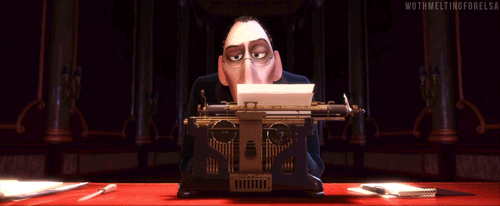
Title: As most pieces on your m.list, you possess good sense when it comes to selecting what catches the eye and stays memorable. Definitely unique and a summary of the story, although much like with ishin-denshin, it took me a while to figure out what it’s about. That can be a strength (innovation/tension!) or a weakness (confusion). Make use of the former by giving the reader bread crumbs. Authors have to play Hansel and Grethel as we say here in Germany. For instance, maybe you’ve seen it, some fic writers give definitions to foreign or complex words under the title right away, maybe you can drop at least a hint about the yarn and that the idea is from a manga/series, important crediting there. Something else that might also be relevant according to recent events, be careful there with using Japanese words should you not be a native speaker. The Ariana Grade tattoo effect is very real and a slippery slope. Solution: Best clarify everything at the start, or make a disclaimer. Other than that, you don’t need much advice with titles imo, never change a running system.
Description: It strikes me that you are an advanced writer. There’s solid attention to detail. Definitely keep that up. The common downside, and here is the crux, is trailing off. Bear in mind to tailor detail according to relevance versus background story and worldbuilding. Each piece needs to interlink with something else sooner or later, repetition matters as an emotional anchor. That’s the extra mile to go and the step from advanced to senior writer. The key to describing, unless your name is Oscar Wilde, is often linearity. You can only break it up once you’ve mastered it. Good news, I think you’re already getting there. I see things like consistent tense, great syntax variation, and a POV switch at the right point in time.
Plot: What you are excellent at is creating ups and downs. A lot of effort went into this. That can’t be messed with. An important component, however, is missing. Most authors turn defensive when I point it out so I’ll word it step by step and show a trick to solve it. The alpha and omega of Caro’s advice remains nailing a character’s actions to hook the reader, not just during the smut scenes. A crucial example: The boss firing Jade is not placed at the start — as the most dramatic event in the earlier sequences — and thus loses momentum. It’s a well-orchestrated event and twist, that’s why it’s so essential to add emphasis. The characterizations + foreshadowing that led up to it are proper. But it has to come down like a hammer; not with indirect phrases that make it seem like something trite. Which it is not given how dear work is to Jade as a comfort zone. You describe her leaving angry, but not her face, what she does, the environment, other characters. It’s only trailing off into a semi-monologue with background information that should be self-evident through things that happened earlier. I want to see the hammer. You only bring it in the dialogue but there, it’s secondary to the verbatim of the characters, as it should be, mind you. Solution: Draw the hands-on sentences from the dialogue into the plot. Then we’re good to go. Problem solved.
Characterization: Little to no objections here on the other hand, very well done. It’s one of the pillars of your writing. I’ll tell you why it is good. It maps out the different lifestyles from your characters which creates a nice contrast, especially with Jade’s concerns in life, and her core motivation (stability). Yoongi’s portrayal impressed me, too. All quite effortless. Even the names themselves, I quite like them, brings a lot of pizzazz. Definitely use them often, things like “the skinny man”, “the woman”, “the dark-haired female” are best converted into simple adjectives for description along the way. The Chaos Club: Also a good idea to have.
Grammar: Pretty salient, I see it in the way you chop your subclauses which I love. Not much to improve except the bit with caps. If you want to use texting sequences in your fic, definitely don’t hesitate. It may read as off in the paragraph but sits just right in a written message exchange. Which also depicts reality well. Now, the reason why I have issues with caps is that you only need them once emphasis is not clear enough through context. You can test out whether italics are a more sophisticated fit, it depends on the scene. If someone yells, incorporate that in the description, put an exclamation mark — yes, the old-fashioned way, I’m a conservative critic I know, it’s annoying. The only caps you need are the ones for saying korean - nations always with capital, geography pun intended. No other grammar concerns, that’s basically it.
Dialogue: Interesting how you use hyphens there. It’s much like everything about your style, very much in its own bubble. That can be a good sign of authenticity. Took a while to get accustomed to it for me, but it’s a stylistic and individual choice, whatever works best and is comfortable. The reason why I probably missed the quotations marks is not an aesthetic one, but because the words of the characters blend into description quite seamlessly. It’s hard to picture their voices that way. What other readers think about it, maybe gather some more opinions how they get by with the hyphens. If I were to use them, my trick for next time writing would be to start a new line for each particle of speech while the description is not attached after the hyphen. It makes it very deliberate and sets pace, too. It gets rid of ‘said’ quite conveniently and brings out stronger verbs. As in:
The man binned his cellphone in one of the back pockets.– Nice to meet you, Jade.
That has suspense and sex appeal. See how it differs from the original:
– Nice to meet you, Jade. - The man said and binned his cellphone in one of the back pockets.
Apart from that, something else to improve in dialogue is not stating the very obvious sometimes, but letting readers put things together in their head. That’s harder when Jade uses the exact tone of the narrator and not her own. Examples: ‘I’m visibly punchy’, ‘Before listening to his depressive songs and staring at his cute eyes and cheeks, I was satisfied with my nonexistent romantic life, now I’m considering the idea of nurturing a very dirty business.’, ‘I never felt another warm sensation other than tears, whilst watching some emotional crap on Netflix’. Dialogue does well contrasting to how the story is told. Bring all the slang, make it fragmented like real speech, fuck it up, it’s the fun part. You do have the registers and pull them off, that’s not the issue, only finding the right place to use them is the challenge.
Other: Something funny happened. I missed the URL mention and thought Jade was an OC and not an existing person! 😅 Took some time until I managed to immerse myself in the story because I’m not used to seeing singular users inserted as readers. It’s one-to-one and hard to get into as an outsider, which surely is not the purpose, but it would help to understand who Jade is in relation to you, and how the fic idea came about. That can be quite entertaining as well in the author’s notes. That being said, she is living the dream and being Yoongi biased myself I feel rather envious which means you achieved plausibility in your fic. Maybe it’s because he has black hair and round cheeks in it. Am very endeared.
PS: I get paid in fic reblogs for reviews 😉 Am half kidding. Speaking of the devil, for the love of my dash, please insert a keep reading so I can reblog.
7 notes
·
View notes
Text
Thoughts on Grasses of Remembrance (The Tale of Genji through its poetry)
Finally had some time this weekend to sit down with A Waka Anthology, Volume 2: Grasses of Remembrance Part B by Edwin A. Cranston. This book is the last in an impressive and intimidating collection translating a number of major classical poetry anthologies. It’s basically a speedrun through Tale of Genji (if such a thing were possible) filtered through all 795 waka poems written or uttered by the characters over the course of the novel.
Poetry was a Really Big Deal during the Heian era. If you were an aristocrat, not only were you expected to compose decent poetry, you had to be able to do it off-the-cuff appropriate to the occasion. AND to do this properly, you were expected to be able to recognize and respond cleverly to references to a ton of other existing classic poems from memory that people would just mention casually in conversation or writing (kinda like how people quote the Simpsons today lol). This was a prime marker of how intelligent/competent and - no joke - how sexy you were. So not surprisingly, these poems are extremely important to the development of character interactions and themes in the Tale of Genji which has a lot of romance and relationship plotlines.
However. Translating Heian era Japanese into modern Japanese is already challenging. Rendering Heian era Japanese waka poetry into modern English is, as you might imagine, harder for a bunch of reasons. Considering how dense the actual novel already is, it’s super easy to gloss over the poetry, and some modern translations simply integrate the basic intent of the poems right into the main text/dialogue.
I was really interested in finding something specifically focusing on and analyzing the poetry, and this book appeared to fit the bill.
Short review: IT TOTALLY DOES. If you’re into Tale of Genji, Heian era, classical Japanese history, classical Japanese literature, Japanese poetry, or just love reading translators articulating eloquently while sassing characters or flailing through linguistic complexities, I RECOMMEND THIS BOOK
Long review: blah blah blah thoughts follows, including some quotes/poem for reference.
The book starts with a quick 2 page intro setting the context of the Tale of Genji, then goes straight into the poems. TBH I personally found it more flowery and redundant than necessary (it repeats a few poems that are then explained later). But it’s only 2 pages, we’ll live.
Then, the poems. For every poem (or poems, in the case of an exchange - sometimes a flurry of them with multiple characters speaking or dashing letters off to each other) there’s an intro and summary of context followed by an analysis, including notes on meaning, narrator and character intent, structure, symbols and wordplay. The original Japanese is included in romaji alongside the English translation. The commentary also flags known references to other classic poems (WITH those poems in-line! This is awesome because I don’t have the rest of these books!), and even mentions poem and folk song quotations from the rest of the novel where the characters have not composed new poetry, but are reciting other existing known pieces.
Overall, I have only three real “warnings” about Grasses of Remembrance Vol 2b:
1) It’s very academic and flowery in tone. If you’re not used to it, it can be hard to read. But then again, if you’re not willing to get past that, how are you reading Tale of Genji? lol. In any case, I personally thought the commentary was a lot of fun. Cranston definitely has opinions and can get pretty sarcastic in places, which I found hilarious. Here are a few sample quotes:
“Tamakazura has remarked to herself how superior the Emperor [Reizei] was in looks to all the courtiers in his train (It is a principle with this author that superior people be dashingly handsome or ravishingly beautiful).”
“The ruefully witty poems exchanged between Yugiri and To no Naishi [Koremitsu’s daughter, the Gosechi Dancer] are rather more to my taste than the soggy ones Yugiri and Kumoi no Kari exchanged on their wedding night. Might it be the case that a totally sanctioned relationship is literarily uninspiring?”
“The old lady reaches for the melodramatic ultimate and dies just as Yugiri’s letter arrives.”
The overall effect is like an exceedingly well-educated, gossipy and sassy ride through the entire novel hahaha.
2) Minor typos. I noticed some speckled throughout the text every so often (e.g., Tamakazura being rendered Takakazura, Akashi as Asashi, instances of accidental extra letters, etc.). It was pretty clear what the correct spelling was supposed to be, and TBH considering this is the last of a huge-ass series of over 1300 pages I think it’s forgiveable. Maybe a few that spell-check should have caught, but oh well.
3) This book is NOT CHEAP. As I mentioned in a previous post, not only did I not buy the entire collection, I didn’t even buy a complete Volume 2 - I only bought the last half of the second volume lmao. And the Tale of Genji translations are only HALF of this half of a book. The rest is actually the footnotes, appendices, notes to poems, glossary, bibliography and indices (including indices for every poem by author and by first line) for this beast of a translation/compilation project. This includes a lot of additional commentary and other poems and makes for pretty interesting reading itself, even without the rest of the volumes/parts. The price can definitely be scary and an issue for a lot of people, so if you’re interested in it, I suggest try checking it out at your library or on Google Books first. (In fact, Google Books is how I learned of this book in the first place.)
For me, the depth of insight for the poems was fantastic. It gave me a lot more appreciation for the scenes, including the mental state of the characters, plus a million more symbols, metaphors and ideas for my own creative works like the Genjimonogatari illustration series, North Bound and other original stuff.
It also clarified several fuzzy translation questions I had that relied on specific knowledge of Heian culture and history/evolution of the use of the language and wasn’t easily found in Google searches or online language resources. And even if you’re already familiar with common allusions, metaphors and puns/homophones in Japanese poetry, it’s still helpful to see them all summarized. And sometimes lamented by the book’s author too. SO MANY PONIES EATING GRASS. SO MANY PINES. Especially the pines. (It IS an amazing pun though, especially because it works in both English and Japanese. Pine [tree] -> to pine, matsu/pine tree -> matsu/to wait)
In term of the actual translations themselves, you may still find them coming off a bit roundabout in some cases when comparing to the original Japanese. But overall I find Cranston’s translations more direct/flavourful than how they were rendered in the Tyler translation, partly because of how Tyler chose to juggle his set of translator’s challenges for rendering not only meaning but also more technical aspects of the poetic form. So the imagery ends up being, to me, a lot more vivid. The overall effect usually ends up more colourful, more emotional, more erotic, more cutting, more entertaining, and whatnot.
For example, Kashiwagi’s suitor’s poem in the Kocho/Butterflies chapter. When reading the novel, I was like, uh-huh, yah, OK. When I read it here, I was like whoa, dude, that’s a little intense lol. Cranston’s translation amps up the connotation of the heat of the water based on the rest of the line. For comparison:
(The original non-romaji Japanese in the samples following are thanks to the Japanese Text Initiative from the University of Virginia Library Etext Centre and the University of Pittsburgh East Asian Library. Their Tale of Genji page has a FREAKING AMAZING side-by-side comparison of the novel in original Japanese, modern Japanese and romaji. Bless them and the people who had to organize and wrangle that text together.)
Original Japanese: 思ふとも君は知らじなわきかへり 岩漏る水に色し見えねば Omou to mo / Kimi wa shiraji na / Wakikaeri Iwa moru misu ni / Iro shi mieneba
Tyler version: You can hardly know that my thoughts are all of you, for the stealthy spring welling from the rocks leaves no colour to be seen.
Cranston version: Hardly can you know / Of the longing that I feel, / For the boiling wave / Is merely colorless water / As it drains away from the rock.
Here’s another example. Oigimi (Agemaki in the book, as Cranston used Wayley’s names for the sisters) telling Kaoru that he’s the only one who’s been actually visiting them and Kaoru is like all riiiight :Db! From Shii ga Moto / Beneath the Oak chapter:
Oigimi’s poem 雪深き山のかけはし君ならで またふみかよふ跡を見ぬかな Yuki fukaki / Yama no kakehashi / Kimi narade Mata fumikayou / Ato o minu kana
Tyler: No brush but your own has marked the steep mountain trails buried deep in snow / with footprints, while back and forth letters go across the hills.
Cranston: Over the bridges / Clinging to the cliffs along / Our deep-snow mountains / No letter-bearer leaves his trace: / Those footprints are yours alone.
Kaoru’s reply つららとぢ駒ふみしだく山川を しるべしがてらまづや渡らむ Tsurara toji / Koma fumishidaku / Yamakawa o Shirube shigatera / Mazu ya wataramu
Tyler: Then let it be I who firsts ride across these hills, though on his mission, / where ice under my horse’s hooves crackles along frozen streams.
Cranston: In the sheets of ice / Covering the mountain streams / My steed crushes / Such letters as form my reason, / My first, to cross as a guide.
In other examples, Genji’s “*throws hands in the air* I give up” poetic reply to Suetsumuhana about how she keeps using Robes of Cathay/Chinese cloak imagery in her poems in the original Japanese alongside the translation cracked me up even more. And one of my favourites is a pair of poems between the future Akashi Empress (as a child) and her birth-mother the Akashi lady. It’s really sad, sweet and cute all at the same time and completely flew under my radar when I read the novel originally.
The poetry analysis for the Uji chapters is especially intriguing. The plot pointedly pits Niou against Kaoru as opposing personalities with particular similarities and contrasts that drive their relationship with each other and with the woman they’re competing for. Especially in the latter half of the story, a lot of their poems, even ones written independently (i.e., to Ukifune), are specifically composed to highlight those attributes and play off of each other.
Finally, it’s also super interesting to see my experience with the narrative changes through the lens of the poems. Obviously, as I mentioned, some things I easily missed without paying as much attention to the poems in between the rest of the story. But also, some prominent characters have very few poems, so the narrative shifts away from them. Meanwhile, a number of otherwise very minor or usually overlooked characters stand out even more, thanks to the fineness, loveliness, resonance, and sometimes just sheer consistent presence of their poetry. This book definitely gave me a lot of additional perspective on the Tale of Genji, and enhanced my appreciation of the novel and the skill behind its crafting!
#tale of genji#genji monogatary#waka poetry#a waka anthology#grasses of remembrance#edwin a. cranston#royall tyler#japanese#translation#japanese tranlation#heian period#kaoru chujo#oigimi#agemaki#kashiwagi
3 notes
·
View notes
Text
24th May >> Daily Reflection on Today's First Reading (Acts of the Apostles 17:15, 22) for Roman Catholics on Wednesday of the Sixth Week of Easter
Commentary on Acts of the Apostles 17:15, 22 We continue to accompany Paul on his Second Missionary Journey. After passing through Thessalonica (to whose Christians are addressed two of Paul’s earliest letters) and Beroea (both in Macedonia), Paul’s next destination was Athens, at that time still the cultural centre of the Mediterranean, although political power was now in Rome. Our reading begins with Paul arriving in the city, with instructions for Silas and Timothy to follow on as soon as possible. At this time, Athens was really only a shadow of its former self. Some five centuries before Paul it had been at the height of its glory in art, philosophy and literature with a culture which still influences modern life today. In the generations which followed, the city still had a reputation for philosophical thinking and in Paul’s day there was a leading university in the city. While waiting for his companions to arrive, Paul was quite horrified at the level of idolatry he found in such a supposedly sophisticated city. He was engaged in discussions not only with Jews and other sympathisers but also got involved with Stoic and Epicurean philosophers who found his teaching rather strange. “What is this scavenger trying to say?” they asked. Because of his mention of someone called ‘Jesus’ and terms like ‘resurrection’, they said he sounded “like a promoter of foreign [i.e. non-Greek] deities”. Eventually they invited him to address the Council of the Areopagus, an indication of how seriously they took him even though they found his ideas outlandish. It should have been a very important venue for Paul. If he could win the Athenians round to accepting the message of Christ, it could have far-reaching effects. The Greeks were famous for their intellectual interests and their love of discussion and debate. As Luke comments rather laconically, “The one amusement the Athenians and the foreigners living there seem to have, apart from discussing the latest ideas, is listening to lectures about them.” Yet, in a way, it was this passion for discussion of ideas which made the Greeks so outstanding in philosophy and literature. (cf. Bernard Lonergan SJ on the Athenians’ gift for conversation, a source of great intellectual creativity.) So Paul went to the Areopagus in the heart of the city and spoke to the people assembled there. And it is Paul’s address which forms the main part of today’s reading. The Areopagus was a hill to the south of the Agora, the central market place of Athens where people gathered. Areopagus also referred to the Athenian supreme council which held its sessions there. Paul chose as his topic the knowledge of God, a theme very popular in the propaganda of contemporary hellenistic Judaism. The pagans are accused of not knowing God, the proof being that they worship idols. This ignorance, Paul tells them, is culpable, since all are capable of knowing God as creator and controller of the cosmos. Nevertheless, Paul’s address is in a totally different style from what he had been giving up to this. He makes no explicit mention of the Scriptures; he does not even mention the name of Jesus. He speaks of the Greeks as “scrupulously religious”, although the word he used could also mean “superstitious”, depending on the context. Paul’s meaning will emerge as he speaks. In the context, it is clear that Paul wanted to be complimentary in order to get a hearing. He tries to go in their door by taking as his cue an altar he saw, dedicated to an “unknown” god. Polytheists (like the Greeks) used to dedicate altars to ‘unknown gods’, in case they incurred the vengeance of gods whose names they did not know. It was a kind of all-inclusive title. While it was a way to make sure that none of the many Greek gods was left unworshipped, it also indicated the level of superstition that co-existed with the Athenians’ much-vaunted intellectualism. Paul uses the practice for his own ends and also turns back the charge of preaching about ‘outlandish’ gods which people had never heard of. And he goes on to spell out for them just who this ‘unknown’ God really is. He is the God who made this world and all that lives in it. This idea was common in Greek thought and hellenistic Judaism; it is a form of the old biblical theme found in the prophet Amos (5:21ff) and in Psalm 50:9-13. Paul proclaims a personal Creator in contrast with the pantheistic God of the Stoics. He is a Lord who pervades the heavens and the earth and is not confined to man-made sanctuaries. Nor does he need the help of any human. On the contrary, it is he who gives life and breath and everything with it. He made from one the whole human race, meaning that all belong to one family (Athenians, Romans, Greeks, ‘barbarians’, Jews, Gentiles). A belief we assert every time we pray ‘Our Father…’. Through his creation he made his presence evident all over the world, “so that people might seek God, even perhaps grope for him and find him, though indeed he is not far from any of us.” He is the Designer God where nothing is left to mere Chance, as the Epicureans thought. He even gives two quotations from Greek poets to strengthen his argument. – “In him [i.e. God] we live and move and have our being.” This quotation is attributed to the poet Epimenides (about 600 BC) who came from Knossos in Crete and is found in his work Cretica. – “We are his [i.e. God’s] offspring” is from the Cilician poet Aratus (about 315 to 240 BC) in his Phaenomen and also found in Cleanthes’ Hymn to Zeus. Paul also questions the practice of worshipping objects of stone or metal as gods. If we human beings have come from God, how can that God be contained in images of gold, silver or stone – materials which are on a lower level than ourselves? (It is a very different thing – as we have in the Catholic church – to have images representing our God or the saints. They play the same role as family photographs. No one believes that a picture of Uncle Joe is really Uncle Joe.) Up to this, God had tolerated this practice which was done in ignorance but, with the coming of Jesus, all that has changed. It is time now to ‘repent’ (a word which, as we have already seen, implies a total conversion in our way of living) because God will ‘judge the world with justice’ through the “man he has appointed”, namely, Jesus. And all this, says Paul, is confirmed by Jesus having been raised from the dead. But at the mention of ‘resurrection from the dead’ some of Paul’s listeners began mocking and others, perhaps with their interest whetted, said, “We must hear you on this topic some other time.” However, it seems clear that their interest was purely on the level of intellectual speculation and not at all on the spiritual or religious. Immortality of the soul was accepted by the Greeks (see Plato’s Dialogues) but not the resurrection of a dead body. In the Greek world, even among Christians, the doctrine of the resurrection was strongly resisted, as we see in the First Letter to the Corinthians (15:12ff). The Jerusalem Sanhedrists also condemned and attacked this Christian dogma, whereas the Athenians of the Areopagus were content to mock. Basically speaking, then, Paul’s mission to the Athenians was a dismal failure. From now on he refuses to use the arguments from Greek philosophy. So he writes later on to the Christians of Corinth: “When I came to you, brother and sisters, I did not come proclaiming the mystery of God in lofty words or wisdom. For I decided to know nothing among you, except Jesus Christ and him crucified” (1 Cor 2:1-2) and a little before that, in the same letter, he had written, Where is the wise man? Where is the scholar? Where is the philosopher of this age? Has not God made foolish the wisdom of the world? For since in the wisdom of God the world through its wisdom did not know him, God was pleased through the foolishness of what was preached to save those who believe. Jews demand miraculous signs and Greeks look for wisdom but we preach Christ crucified: a stumbling block to Jews and foolishness to Gentiles but to those whom God has called, both Jews and Greeks, Christ the power of God and the wisdom of God. (1 Cor 1:20-24). From now on he would rely only on the power of the Gospel message. In spite of this, there were some converts made in Athens. Among these was Dionysius the Areopagite. The Jerusalem Bible notes: “Luke’s readers must have known him. He became the subject of legend, especially since the 5th century when an author (the ‘pseudo-Dionysius’) published various mystical writings under his name. Later legend identifies him with St Denys, the first bishop of Paris (3rd century)” or even that he was bishop of Athens. Another convert mentioned was Damaris. The NIV notes: “Some have suggested that she must have been a foreign, educated woman to have been present at a public meeting such as the Areopagus. It is also possible that she was a God-fearing Gentile who had heard Paul at the synagogue.” From Athens, Paul continued south to Corinth. He would have gone there either by land along the isthmus, a distance of about 80 km (50 miles) or else by sea from Piraeus, the port of Athens, to Cenchrea, the port of Corinth, on the eastern shore of the isthmus of Corinth. Corinth had been rebuilt by no less a person than Julius Caesar and became capital of the Roman province of Achaia (southern Greece). Its population was largely Roman and Latin-speaking but it was a lively commercial centre which attracted people of all nations. There was also a considerable Jewish colony. The immorality of the city was proverbial even by the standards of the day. Paul does not seem ever to have ever returned to Athens. But, once again, we see that God’s ways are not our ways. Once again we see how Paul is turned in a different direction from what seemed the obvious way to go. His next stop will be Corinth, a city, on the face of it, which – compared to sophisticated Athens – was not at all promising, given its reputation for lewdness and immorality. On the positive side, we should look carefully at how Paul presented his message in a language that would make sense to his hearers. He did not dilute or compromise his message but he did try to express it in language that would give an opening to an audience totally unfamiliar with the Jewish scriptures. This is something we need to remember whether we are bringing our message to a culture which has never heard the message before or to one which has lost it. Much of our preaching, it has to be said, is to the converted and not to those who have not heard the message or have only heard it in distorted forms.
1 note
·
View note
Text
Baal So Hard
In the midst of everything else that’s swirling around in issue #25 – the Great Darkness, Matt Wilson’s absolutely great darkness – there’s this one quiet moment that lodged into my brain, and impacted how I read one character in particular.
I’m talking about this sequence of panels:

And, yeah, I’m talkin’ Baal.
There’s something fascinating to me about the way he chastises Minerva for swearing here. On one hand, it makes sense: he’s adopted the parent role since Mr and Mrs Minerva got splatted (one he was arguably already fulfilling better than they were even in their solid forms) and like any good dad, he wants to raise her right.
On the other hand… ‘raise’ kind of implies an end result, and Mini isn’t supposed to make it past fourteen. Keeping her language age-appropriate feels like a pretty ineffective finger in the dam, given they’re all damned.
And somewhere in the friction between those two sides, Baal’s character comes through in a way it rarely has for me.

For someone who is apparently going to be the co-lead of this arc, we haven't actually seen that much of Baal. Over two dozen issues, his character has been defined by one relationship – with Inanna, hidden, conflicted, tragic – and one action – the violent way he took that tragedy out on The Morrigan.
Nevertheless, he’s still one of my favourites, and I feel like I have a pretty good grasp on who he is. The weight of that – like the enlightening moment with Minerva – has been delivered through Baal’s use and control of language.
Now, when I mention ‘Baal’ and ‘language’ in the same sentence, you’re probably thinking of one thing:

This verbal tic is something that has occasionally irked me. Even in Gillen’s playful dialogue, these constant elaborate nicknames feel too written, too overwrought to be part of natural speech. I mean, Nick Batcave? But looking back, I suspect that’s the point.
These lines are a little too neat and clever to be thought up on the spot. Baal is a dude who sits up at nights really thinking about all this, you feel. Tangled up in the silk sheets, brow knitted, considering where he stands among his peers.
There’s a lot of Baal’s dialogue that makes sense looked at through this lens. Revisiting that first moment I fell for the character, the opening of #4, where he says:

There’s no way that’s not a pre-prepared line. He drops it in the middle of half a dozen brilliant soundbites (“I stop your heart if I look at you in the right”, “When I speak, people know that in my gut, I’m bad. They feel better about being bad in their guts”). It feels like he’s giving Cassandra the press tour, and Baal basically says as much himself.
“Here’s your quote,” he tells her. "‘I’ve always claimed I’m a god, even before I knew I was one.’” The only difference with that line is that he’s admitting to the quotation marks.
And, speaking of journalists being given the full Baal show... You know who sees right through this carefully-controlled performance? Dorian Lynskey.
Lynskey’s article on Baal in issue #23 is peppered with references to the artifice of his interviewee. “You’re being sold a message.” “Theatrical pride.” “Like a curtain dropping.” “Schtick.” “The facade.” “Baal’s spin for the day.”
(What’s interesting about this is, it’s not just the in-universe character who spots this about Baal, but the real-life writer as well. Like the rest of #23′s interviews, Gillen provides the words but the journalists fill in the rest, with themselves. It’s criticism, of both person and text.)
That performance is all there in the way Baal speaks, he way he tries to exert control over both his own language and Minerva’s. It’s also present in his trademark page-dominating entrances, of which (I think, I haven’t counted) Baal gets more than anyone else in the cast.

Now I can’t stop imagining him dorkily practicing these poses in the mirror, and it’s adorable.
...Right. To stop myself from just endlessly screencapping bits of Classic Baal, let’s try and work out what showing his persona as carefully constructed achieves as part of The Wicked + The Divine as a whole.
Well, firstly, the idea that Baal isn’t naturally as uber-confident and cool as he presents himself provides a way into the character.
That side of the character is especially apparent when his little performances fail. Like when he tries out “Satan’s Little Helper” as a nickname for Laura in #7 and she storms off. Or, in #10, when he overwrites his own dialogue so much that he has to translate.

That’s a lot more relatable to me, at least, than someone who drops constant perfect one-liners.
Also, it creates an immediate point of tension for the character. Baal is cool, calm, collected – so when he loses it, that really means something.
Note how Clayton Cowles reserves the bolded lettering and jagged-edge speech balloons for these moments, which tellingly tend to revolve around Inanna’s death.

Finally, the idea of control is pivotal to Baal, on a number of layers. He emphasises repeatedly that he is the oldest of the dogs, that he was the first. It’s a masculinity thing, too, placing himself as the Pantheon’s patriarch, but that would require another couple of thousand words to fully unpick.
This is a theme Lynskey’s article underlines, with a fat red marker, twice, and then draws a loose circle around so you don’t forget. The opening and closing paragraphs both make reference to it.
Note, though, exactly how Lynskey frames each of these references. “You’re being sold a message, and the message is this: everything is under control.” “A flamboyant reminder of what he was insisting all along: everything is under control.” Telling people that this is the case, of course, is significantly different to everything actually being under control.
138 notes
·
View notes
Photo
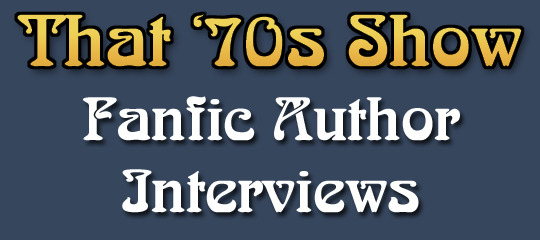
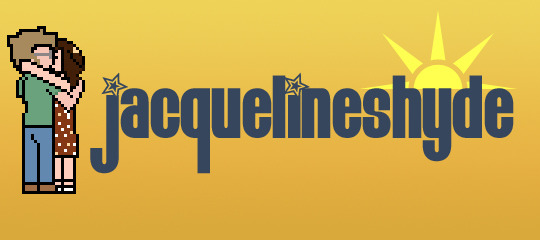
Welcome to part 2 of my interview with @jacquelineshyde / PoetDameron, an author who’s been posting her That ‘70s Show fanfic and poetry since 2016. Her prose and poetry have a gracefulness to them, in both imagery and subtext. Shades of emotion blend into one another, giving us a deeply complex and satisfying exploration of the characters.
You can read part 1 here.
Those ‘70s Comics: What's a That ‘70s Show fanfic you've written that you wish had gotten more readers? Or you believe deserves more attention?
jacquelineshyde: I'm actually very happy with the response to all my stories. Maybe I would have liked a little bit more comments on Absolute Beginners (AB: FFNet / AO3), but it was always a risky project, and I'm just happy I got to put it out, and it got what it got. And yes, I know I haven't published the last chapter. But I need beta for everything.
T7C: Besides Jackie and Hyde, which T7S characters and ships do you most enjoy writing?
jacquelineshyde: I love writing Eric a lot. His POV is one of the funniest I get to work with [in a story], and his dialogues are some of my favorites. This is mostly because Eric’s is one of the first POV's I got to work on. I wrote twenty-six letters that are supposed to be [from him to] Jackie, for an upcoming fanfic that has become this enormous thing. I don't even know how I'm going to publish all that. A couple I love writing is Brooke and Kelso. I actually have two upcoming stories that are about them, and I have in mind an AU I want to write about them. I really, really like them. I enjoyed working in their separate POVs in Absolute Beginners, and they are probably my favorite t70s couple at the moment, after Hyde and Jackie.
T7C: Who are some of your favorite T7S authors and why? What are your favorite T7S fanfics by them and why?
jacquelineshyde: My favorite author in the fandom is the amazing MistyMountainHop. I find her writing mesmerizing in a very deep way. Her writing is like a snowy day: it makes you feel everything to the point that you are numb, but slowly it gets you inside the house, to the warmth, to the hot chocolate and the comfy blankets, and the sound of calm and beauty. It's a force of nature. Her characterization is wonderful. The way she writes Hyde is my favorite in all [the T7S] fandom. She explores him perfectly and makes you feel what he is going through, and that's just an example. She writes the rest of the characters and couples just as good. It's incredible. I'm just really honored to be writing at the same time as her. My favorite fanfic by her is Made Bare [MB: FFNet / AO3], a fic I also consider my canon season 8. Other ones I love are Shade [S: FFNet / AO3] and Hyde's Long Way Home [HLWH: FFNet / AO3]. Perfect fanfictions.
[Full disclosure, MistyMountainHop is also the creator of Those ‘70s Comics and the runner of The Stupid Helmet. In other words, she’s me, and I in no way asked or paid jacquelineshyde for the inclusion. But I’m honored my stories are counted among her favorites.]
Another author I love and respect is nannygirl, queen of Red/Kitty fanfiction -- and also queen of fluff and family warmth. Her characterization is incredible. I love the way she writes Red and the relationships she explores in her fanfics. She writes every character with respect and understanding. She makes them human, and it makes her stories so light and warm. It's the feeling of hot chocolate down your throat on a cold night. You close your eyes, and you can feel that sweet hug of your loved ones. My favorite pieces by her are If You Ever Did Believe, “Write this Down,” “Flashbulbs,” and “Mall Santa” (which is part of Stocking Stuffers, her series of Christmas one-shots).
T7C: What's your fanfic writing process like?
jacquelineshyde: Oh, boy. It starts with a notebook and a Moleskine. I write the general idea in the Moleskine and decide on a story title.
Once [I have] the title, here comes the notebook. [I make] a bullet-point list with everything that needs to happen in the story, most times in order, and then [do] a bunch of research. Research in cases like t70s is mostly about the scene at that time and, sometimes, just rewatching the show. I put down every bit of information I know might help me, and then I organize the chapters. From the bullet-point list, I write the chapters. I choose a certain number of scenes to be in one chapter and mark them with different colors to know where they start and end. Once this is done, I go to the computer and start writing. [During my time on the computer], the notebook and Moleskine are at my side, [as well as] vodka or coffee; and one of my pets [is] at my feet or sleeping [beside me]. Most times, I also write with music.
T7C: English isn't your first language, and you write beautifully in it. What, if any, differences do you experience when writing in English vs. Spanish. And are there any similarities?
jacquelineshyde: First, thank you for the kind words; I hope it's true because it's a real struggle to write sometimes. That's also the difference. Spanish is part of me. It’s who I am. Words come to my mind all the time, awake and sleeping. I'm always talking, and I'm always writing, no matter the hour and the place -- or even the situation. I'm always writing. But when it comes to English, I have to make it fit. Most of the expressions I love and use constantly don’t exist in English, and I have to make sure the thing makes sense. Luckily for me, English also comes to me in a very easy way when I'm truly inspired and focused. Sometimes, I don't even realize I'm speaking the language when [I’m] like this. For help, I keep open Google Translate, a Spanish-English and English-Spanish dictionary, and a dictionary of synonyms on Google Chrome. I also have my wonderful beta, @that70sshowgoldencouple (aka nannygirl), who always helps me out with the writing. Other people who help me with beta are @lesspissedoffromantic and @itsreykenobi.
T7C: What music do you listen to when you write?
jacquelineshyde:
Eric Clapton's Forever Man anthology
Drive OST
Sing Street OST
About Time OST
If I Stay OST
Robert Downey Jr's The Futurist (amazing album)
Caro Emerald's entire discography
I also have playlists for the different couples I write.
T7C: What would you like to see more of in T7S fanfic, and would would you like to see less of? Themes, story ideas, characters, etc.
jacquelineshyde: A more well-characterized Jackie who isn't needy and infantilized in order to make Hyde look like this great and supreme being who is here to save her from herself and the cruel, cruel world.
No, in all seriousness, please ... I would love if Jackie could be written with respect. In fact, that every female character could be written with respect, that their relationships don’t define them, and the relationships between them aren't ignored.
I would love Eric [maturing] and changing after [his experiences in] Africa, [rather than being characterized as the less] mature season 6 and 7 [version of himself]. Less season-8 Hyde, less of the Hyde who prefers to destroy Jackie's heart instead of talking things [out] first, a Hyde who respects her and the people around him, who respects himself. And on a less picky note, I would love more good LGBT exploration and representation, more Kelso/Brooke, and a mature Kelso who doesn't have to stop being funny just because he cares for his daughter and has a woman in his life.
T7C: Any hints you can give us about future T7S stories, poems, or projects you're working on?
jacquelineshyde: I have so many t70s projects! For a start, on tumblr, I'll be starting another two poetry projects and a new project with Eric's letters, [the one] I mentioned before. Since I changed that story, I had to write [a new] set of twenty-five letters, and the original ones won't be used anymore. But I love those letters. So I decided to publish my favorite quotations from them and explain, briefly, their context. Let's see if it works. Upcoming stories -- I have a whole page about that on my blog: Future Fanfictions.
Wear my Arms is my next big project to publish after Heart Like Yours is done.
My biggest project is a three-part series that retells season 8 with a new twist: what happened seven years afterward -- and, finally, how it all comes to an end fifteen years later. Lots of work.
T7C: If there's anything you'd like to talk about that I haven't asked, feel free.
jacquelineshyde: I admire the fandom and how warm it is. I was very surprised to find out that it was still pretty much alive and that people like to read and comment on one's work, even after more than ten years since That ‘70s Show ended. It's incredible. I'm very grateful to be part of this fandom and the way it welcomed me. Thank you.
T7C: Thank you, jacquelineshyde!
Some of my favorite That ‘70s Show fanfics and poetry by jacquelineshyde are:
Heart Like Yours (FFnet / AO3): Jackie goes home to Point Place for Donna and Eric's wedding, but an accident and an unexpected experience may show her a reality she never thought was happening around her (Rated: T)
Year of Jackie (FFNet / AO3): It's a new year, 1980, and her friend is alone. Donna tries to make a better night for Jackie (Rated: T).
“A Good Night’s Sleep” (Jackie on My Mind)
“Wear My Arms” (Jackie on My Mind)
“She’s Magic” (Jackie on My Mind)
“I Thought I Hated My Name Until You Said It” (Jackie on My Mind)
#That 70s Show#That '70s Show#Jackie x Hyde#Steven Hyde#Jackie Burkhart#Interview#T7S Fanfic Author Interview#jacquelineshyde#Special
55 notes
·
View notes
Text
The famous quote that da Vinci never said
“Once you have tasted flight, you will forever walk the earth with your eyes turned skyward, for there you have been, and there you will always long to return.”
This Leonardo da Vinci quote is everywhere — aviation books, magazines, websites, Instagram posts, coffee mugs, tee shirts, several science textbooks and some Smithsonian publications. It’s been repeated by the Washington Post newspaper, the Italian ambassador to the United States, and an executive director of The Leonardo museum. I saw it last year in big painted letters on the wall of a California flight school. It’s timeless emotion from a renaissance master of art and science. A flying quotation from maybe the most diversely talented genius ever to have lived, penned 400 years before the Wright Brothers flew. It’s evocatively magical and achingly relatable.
Yet Leonardo da Vinci never said it; and it’s nowhere close to 500 years old.
Yep, it’s fakey fake! Like, totally busted. Now, it’s still a great line. Maybe the best encapsulation of what pilots feel like when we’re stuck on the ground. As I write this during the coronavirus lockdown my eyes are turned skyward, longing to return. But how did this distinctive line come to be credited to the famous Italian polymath with a fascination for flight? And who actually did write it?
I started questioning the quotation’s authenticity over twenty years ago, while trying to nail down the details for a book I was editing. It was slow sledding. Several big aviation books had the line, but none of them cited a reference. None. I soon noticed it never has a date or even a year ascribed to it. This was back when university library catalogs were giant physical card files, Google didn’t exist, and you dialed into the internet on Netscape.
Since I don’t speak Italian, flipping through photos of Leonardo’s original notes didn’t get me anywhere. Reading English translations of his words didn’t uncover the phrase. Leonardo didn’t write books as such, but rather had observational and inspirational notebooks that he wrote in mirror-image cursive with shorthand codes and extensive sketches. There are in total about 13,000 of these pages, originally loose papers of different types and sizes.
Leonardo wrote about birds and flying, but not that famous quote.
Leonardo certainly was obsessed with birds and flying machines, drawing and writing a lot about them over his entire lifetime. He believed a bird flew into his crib as a baby. He swam underwater to study how fish fins worked compared to bird wings. His aerodynamic ideas foreshadow Newton, Galileo, and Bernoulli. He was the first to draw flow fields. Charles Elachi, director of the Jet Propulsion Laboratory, says Leonardo was “the ultimate genius,” and that “as scientists and explorers we always looked to him as the model.”
One of his famous notebooks, the Codex on the Flight of Birds, is devoted entirely to flight. It was written at the same time (1505-1506) he was painting the Mona Lisa. It contains aerodynamic understandings not equalled for hundreds of years. Elachi believes this codex is “probably the most important document about flight” on Earth. In 2012, a scanned copy of it flew much further, landing on Mars attached to the Curiosity rover. While close inspection of the Codex on the Flight of Birds reveals it was written over old notes, and contains a grocery list as well as other personal notes, our famous line is not there.
Peter Jakab, a curator at the National Air and Space Museum in Washington, DC, says Leonardo wrote 35,000 words and drew 500 stretches on flying. His last notebook, Manuscript E (circa 1515), has advanced studies of gliding flight and clearly shows how migrating birds use the wind for long range soaring. By then I think Leonardo had given up on mechanical human-powered flight, after a lifetime of never actually making it into the air in any machine. This disconnect from actually “tasting flight” is part of the magic of the quote, that the great master could voice our primal aerial passion before anybody could have experienced it. The general acceptance seems to be that the extraordinary intellect that envisioned so many mechanical possibilities, and could paint so many human emotions, conjured in his mind what flight would feel like, what lingering sweet taste it would leave in our psyche.
The search was frustrating. What if the quote was never in his notebooks? Maybe he wrote it in a letter to someone else? Or maybe was it a bad translation? Or an extrapolation? Or a misunderstanding? But surely not, as the line was quoted so definitively, so often. The only variations seem to be at the start. Sometimes it’s, “For once you have tasted…” other times it’s, “When once you have tasted…” The body of the quotation is remarkably consistent for something supposedly 500 years old, originally written in Italian or Leonardo’s poor Latin.
I found nothing. Neither did some nice folks I talked with at National Geographic magazine years ago, who had contacted one of the world’s leading Leonardo authorities in Italy as part of a long research project, and were told flat out that he did not write it. They were quite confident it was folklore fiction, and privately they sounded a little smug that a Smithsonian publication had recently printed it. I believed them, but how do you prove a negative? And who originally did pen the line?
The question quietly bugged me for years. The 2007 book Leonardo on Flight by Domenico Laurenza never mentions the line. A whole chapter of the 2008 book Leonardo’s Legacy by science writer Stefan Klein is devoted to da Vinci’s dream of mechanical flight, yet it also never mentions the line. Rather, the book concludes “after thirty years of tireless work, Leonardo’s dream of flying had reverted to what it was in the first days of his research—a flight of the imagination.” And the amazing 2017 biography Leonardo da Vinci by Walter Isaacson, drawing on the latest research, didn’t include it anywhere in its over 600 pages. So every time I saw the quote on a tee shirt or Twitter it was a poke to a bit of my brain that knew something wasn’t right, that something was unfinished.
Well, finally the mystery has been solved, thanks to several patient detectives connected via the internet, using the vast search tools of Google Books and other electronic storehouses. People reached out to book authors and asked where ideas and narrative came from, while others sat through dreadful old copies of films. It all came together in the nerdy discussion page of the Wikiquote entry for Leonardo de Vinci, and now we can reveal the author was… drum roll please…
John Hermes Secondari. An American TV writer. In 1965.
John Secondari discussing rockets with Wernher von Braun.
It seemed all a bit underwhelming. A TV writer? But a little more research finds a pretty cool cat. He commanded a tank company in combat during World War II. He wrote romantic novels. An uncredited Frank Sinatra sang “his” song that won an Oscar. The New York Times called Secondari “a dominant figure in the field of the television documentary” in their February 1975 obituary. He had won three Peabody Awards and more than 20 Emmys during a career making quality documentaries. And while John was mostly found behind the camera, there’s pictures of him from a 1958 Walt Disney Television show—smoking a cigarette and discussing rocketry with Wernher von Braun. And he had deep ties to Italy.
Born in Rome in 1919, at five years old Secondari sailed with his mother to Ellis Island for a life in the United States. After getting a masters degree in journalism from Columbia University, he worked as a correspondent for The United Press and CBS News. In 1941 he joined the Army and saw combat in Europe. After the war he rejoined CBS and was head of their Rome bureau. John also wrote several novels. The first one published drew on his knowledge and love of Rome with a title referencing the famous Trevi fountain—Coins in the Fountain. The book was turned into the 1954 movie Three Coins in the Fountain. It won two Oscars: best cinematography and best song. The eponymous song was sung by Frank Sinatra.
At the start of the 1960s Secondari organized ABC-TV’s first documentary unit and went on to produce over 80 documentaries, covering serious subjects with award-winning substance. The Museum of Broadcast Communications’ Encyclopedia of Television (2nd edition, 2013) says Secondari “forged a coherent house style that featured a heavy emphasis on visualization and dramatic voiceover narration.” One of his projects was a series called The Saga of Western Man, highlighting key historical events that drove civilization forward. It was nominated for five Primetime Emmy awards. The New York Times said that to make the past come alive Secondari used “sound effects and animated the screen by treating the camera lens as if it were the eye of an actual witness to the event—scanning , zooming or resting on shadows, furniture, silhouettes, ships and other objects. As much as possible he restricted the acting to off-screen voices, using historically authentic dialogue.”
One of the episodes of The Saga of Western Man was “I, Leonardo Da Vinci.” The credits state it was written, produced and narrated by John H. Secondari, with “the voice of Leonardo da Vinci” played by Fredric March. Its copyright date is 1965 and it was released in 1966 by American Broadcasting. At 16 minutes and 21 seconds into the second reel, after the off-screen Leonardo narration urges people to build his flying machines, claiming after any crash “the hurts will be slight,” over gentle visuals of a wheat field panning up into a clear blue sky, the voice says:
And once you have tasted flight you will walk the earth with your eyes turned skyward, for there you have been, and there you would return.
That’s it. The first recorded version of what became the quote. There is nothing similar in any of the millions of pre-1965 documents digitized by Google or other archivers. It was written by John H. Secondari, channeling the real ideas and passions of Leonardo as part of a TV documentary. This was a serious project, with Professor Carlo Pedretti of the University of California as the consultant historian, but it did present conjectural concentrations of Leonardo’s ideas. Condensing 13,000 pages of notes into a one hour show is hard. Clearly it’s a great line, compelling, ethereal—even if it’s closer in time to Leonardo DiCaprio than Leonardo da Vinci.
As an additional fact check, I talked with Marissa De Simone Day, Director of Exhibits and Learning at The Leonardo Museum of Creativity and Innovation in Salt Lake City, Utah. She was part of the creation of their outstanding Flight exhibit. If anyone should know about the line, it’s her. She stated, “as far as we know, the quote originated in the script of an educational film by John Secondari which is titled I, Leonardo da Vinci. The script is inspired by Leonardo’s notes in his codexes and narrated as though by Leonardo.”
This spoken line is not exactly as we’ve seen it repeated time after time over the last few decades. It lacks the “forever” and the ending is missing the “always long.” Those parts came to be added in pieces later. The first time the line appeared in print was ten years later, in the May 1975 edition of Analog Science Fiction and Fact magazine. It was quoted as a Leonardo epigraph in The Storms of Windhaven, a science fiction story by George R. R. Martin (yes, that’s Mr. Game of Thrones) and Lisa Tuttle:
For once you have tasted flight you will walk the earth with your eyes turned skyward; for there you have been, and there you long to return.
Now we have the “long to return.” But where did they get the line? A fantastical lost da Vinci codex discovered in George R. R. Martin’s attic? A personal letter from Leonardo delivered through a vortex time portal? Sadly not. Seems the communication was more down to Earth. According to Lisa Tuttle it was the editor of Analog, Ben Bova, who suggested it. An email to Ben revealed that he heard it in a documentary about Leonardo.
It was perfect for the start of a story of human space voyagers who crash-landed on a planet and constructed mechanically simple gliding machines from their wrecked spaceship. The presented-as-historical-fact quotation was read and spread by late seventies hang glider pilots and sky divers. Five years later, a newspaper story in the The Herald Statesman had the compelling headline Hang Glider Died “With His Eyes Turned Skyward.” By the 1980s the power of the line had caught the imagination of the wider aviation world. And then it started being repeated in books and magazines.
Which is when I first saw it. I joined the echoing chorus by adding it to my lists of aviation quotes. Now it’s almost everywhere. It’s easy to understand why. The line perfectly describes a human emotion about our favorite obsession. It sounds just like what we think Leonardo sounded like. And fact checking the line used to be nearly impossible. But now we have better tools. It might take a while for the quote’s attribution to be changed, considering how common it’s become. I heard it as part of a theme park ride. It even made it to page 135 of the 2008 National Geographic book Leonardo’s Universe: The Renaissance World of Leonardo Da Vinci. Emails to the authors were unanswered.
It’s my speculation that the enigmatic Mona Lisa smile is Leonardo’s reaction to his most famous flying quote turning out to have been penned by a ghostwriter centuries after his death. The great man did enjoy funny prophecy-riddles. His quote that “winged creatures will support people with their feathers” actually refers not to flying machines, but rather “the feathers used to stuff mattresses.” His line “feathers shall raise men even as they do birds, towards heaven” is finished by “that is by letters written with their quills.”
While we have to let his most repeated quote go, thankfully there are many well researched, 100% authentic quotations that match his amazing aerodynamic sketches. Like this one from the Codex Atlanticus:
A bird is an instrument working according to mathematical law, and it is in the capacity of man to reproduce such an instrument. A man with wings large enough and duly attached might learn to overcome the resistance of the air and raise himself upon it.
The post The famous quote that da Vinci never said appeared first on Air Facts Journal.
from Engineering Blog https://airfactsjournal.com/2020/08/the-famous-quote-that-da-vinci-never-said/
0 notes
Text
W. 17th June Community Art: The Politics of Trespassing by Paul Bruyne & Pascal Gielen (2011)
“One of the unintended consequences of modern capitalism is that it has strengthened the value of place, aroused a longing for community.” Richard Sennett, The Corrosion of Character 1998
P. 3
In 2009, the Italian philosopher Antonio Negri, published the book commonwealth which is co-authorised with the literary scientist Michael Hardt. The cook concludes a trilogy, begun with Empire and Multitude, of radical political philosophy that attempts to reinvigorate communism. Ideology aside, both supporters and detractors of Negri and Hardt acknowledge the importance of their critical analysis of global capitalism and neoliberalism. Whether or not eh solutions and strategies make sense remains open for debate. What is important here, however is the way in which Negri and Hardt breathed life into forgotten, supplanted and sometimes denounced concepts to offer different ways of looking at the world. Obsolete notions such as ‘multitude’, ‘general intellect’, ‘bio-power’ and also ‘love is re-actualised and refined for up-to-date societal analysis. When, in the 16th and 17th century, first in England and then all over Europe, the meadows, where animals grazed, and the forests, where everyone could gather wood, were privatized, the conflict about common ground was born. From the Christian side came the argument that God had given the earth and its beauty to all of humankind and that it should, therefore, be used in common.
Since the 1980s, the battle over the common has remerged, in a new guise and without transcendental allure, in a bid to oppose the advancing neo-liberalisation of government, which seeks to contract out national resources – such as water, soil and oil – to private enterprise. Some say that the state has conducted a full-scale clearance sale over the past 30 years, thus forfeiting its political grip on society. In cyber culture, a similar debate over ‘information commons’, ‘creative’ and ‘cultural commons’ has been going on for almost a decade. With these examples in mind, Hardt and Negri argue that the common is not limited to natural resources, but that man continually contributes to the production of language, knowledge, codes, information, emotion, affect, etc., which exist solely by virtue of social interactions and are easily shared. Forms of expression, creativity and art would lose their potency and dynamics if they could no longer draw on that common. Therefore, Hardt and Negri fervently resist the privatization of cultural products such as information, ideas and species of animals and plants. For them, open access to the natural and cultural common, the life source of community, is a prerequisite for a free and egalitarian society. By contrast, our times increasingly seem to deny that open access to the common. P. 9Between a conformist and a revolutionary attitude towards the public space, a ‘third way’ is introduced. From the contribution of Hein Schoer, about art in societies that have preserved a part of their pre-modern roots, it becomes clear that community art could only arise once the idea of community had largely been lost in modernity. From this moment on, art becomes not only an agent for social interaction and cultural stabilization, but also a factor within disorientation. Only then could it be charged with the artistic (and ethical) duty for charge, renewal and being different. As the ‘natural’ tie to community was lost, it had to be reconstructed. […] In considering that freedom takes shape within strict conditions and that democracy is not a natural state but merely an ideology that is maintained by force, Staal discusses the idea of ‘democratism’ as a prelude to pointing towards an ever-changing possible reality.P. 36Since its [community art] social gold aim (too) high, are ethically (too) pure, not artistic in nature and, on top of that, the actual effects of projects are extremely hard to measure, community art is heavily criticized from several sides. In particular, this criticism comes from those political and social forces which urge that it is not the dity of the state to support cultural projects (neoliberals), from political forces which think the community arts are, by definition, in league with the prevailing hegemony (ultra-left), from forces which feel that, under the guise of politically correct values, and unjust policy of positive discrimination is pursued with regard to socially damaging forces (‘Islam’, ‘loitering teens’, ‘criminals’) (ultra-right) or from the artist sector which urges that the autonomy of the arts is under pressure by art that is used in an instrumental way, since it is serving goals other than aesthetic ones (‘this isn’t art, this is social work’). Seen from a social and political point of view, community art is an expression of social democracy and related political movements, a typical welfare state product. P. 39 CA = Community Art Low Virtuosity (CA) High Virtuosity Instrumental (CA) Autonomous Individual (CA) Collective Monocultural (CA) Multicultural General Audience (CA) Limited audience Entertainment (CA) Art Conformism (CA) Subversiveness P. 51 Things in themselves rarely, if ever, have any one, single, fixed and unchanging meaning. Even something as obvious as a stone can be a stone, a boundary marker or a piece of sculpture, depending on what it means – that is, within a certain context of use […] It is by our use of things, and what we say, think and feel about them – how we represent them – that we give them a meaning. ‘‘What does community art mean?’ – that is the question. Like the stone in Stuart Hall’s quotation above, the term ‘community art’ had no meaning in itself, but we give it meaning. Just as a Sunday painter and the curator of a prestigious artistic happening define the concept of ‘art’ in different ways or the CEO of a multinational and single mother with four children relate to the concept of poverty entirely differently, so too the meaning of community art is created from various context.[…]A rigorous focus on language and on the language patterns that are used to speak and write about community art is, therefore, necessary. But – and here we return to Stuart Hall – no less important is that such an approach of discourse also focuses attention on the context of this language, in particular the social context. Discourse analysis is, after all, more than language analysis without obligation; it is critical of the social structure in the sense that it links language study to a broader picture – who says what and from which position? What purpose do the arguments serve? Which argumentation survives over time and which doesn’t and why? Terry Threadgold summarizes this critical discourse view as follows: ‘We should not “burrow” into discourse looking for meanings. We should look for the external conditions of its existence, appearance and regularity. We should explore the conditions of its possibility. Just how it is possible to think that, to say that – these are the questions we should be asking. In light of the above, discourse analysis into community art has the ambition of questioning the obvious meanings around community art, based on the idea that discourse is always connected to power, and therefore the obvious meanings should be viewed with suspicion. ‘Deconstruction, if such a thing exists, should open-up’ Derrida wrote. This means that the analysis of discourse should bring new or subordinate meanings to the forefront in an attempt to withdraw he construction of meaning from dominant power structures. Or as Shapiro formulates, ‘Deconstruction has the power to show how every social order rests on a forgetting of the exclusion practices through which one set of meanings has been institutionalized and various other possibilities have been marginalized.
P. 165
One of the most noticeable things about the oeuvre of Antonio Negri is that he often publishes works that echo multiple voices. Books are co-written, essays are produces in the form of letters. Texts assume the shape of dialogues as if they actually occurred as normal conversations. The conversation is, therefore, the perfect site as which the common takes shape. A conversation teaches us much about the common, not least through the fact that its formation presupposes a multitude of perspectives, differences, people, products and thoughts. The conversation teaches us that the common is formed in lively interaction and is constantly reconstructed. The common is a subject close to Negri’s heart; this is immediately evident in the titles of his recent works. By contrast, he never mentions community. He prefers the adjective that moves, shapes itself into something different and, most importantly, encompasses many undertones. ‘Common’ is an ontological and logical category that presupposes an internally contrasting multitude of singularities and brings them together.
P. 167
Antonio Negri
“I connect art to a view elementary experience. When I enter the exhibition of the Biennale, I want to find a description of reality. I want to understand something of the reality in which I am usually submerged, in my life and in other ways. An exhibition is a place where you are being submerged in a new element. That is the way it always is for me. Should this sense of submersion be lacking, no one would go to an exhibition anymore. An exhibition is like water you dive into. It is not merely about a genuine insertion, an entering, a connection. It is about physical connect, hence the image of entering the water and submerging oneself. The concept of ‘submersion’ is very important as experience. The ‘idea public space’ – which of course never existed – is a space for exchanging news, for forming opinions, for seeing and being seen, for eating a playing, dating and courting, for showing the clash between poor and rich, legal and illegal, for walking the dog and cursing (or occasionally worshipping) the weather gods; in short for living together. This idealized public space is often thwarted by increasing (car) traffic which leads to increasing congestion, and increase in light and sound pollution, and an exponentially increasing commercialization that curtails the public nature of the space. A rather remarkable semi-public space was created with the introduction of the shopping mall. Every effort was made to give the impression that it was an ideal public space (safe, clean, full of reciprocity and interaction, child-friendly, open, offering unhampered mobility, pleasant smells and sounds), while (legally speaking) it is a purely private space dedicated to maximizing profit. Community art has been deployed by various governments to fight these threats to the quality of living together in public space, not because they think believe the arts can solve the problems but they think they can strengthen community spirit, thereby creating a basis from which they are able to devise political solutions.”
P. 168
The graveyard feeling is caused by an unsuccessful submersion. Like when you go fishing under water; there, too, you dive into a new element, the water. If you leave the water without having caught a fish you feel a chill, you get cold, whereas after a successful catch you are content and get the impression that the water warms your spirit.
0 notes
Text
ABCs of Fiction Writing - Dialogue: Who Said What?
Dialogue can be one of the most difficult parts of writing fiction, and a sure sign of an amateur writer is dialogue that is not properly punctuated. Punctuation can be the most confusing part about writing dialogue (and we'll be dealing with US standards in this article), but writing believable dialogue is the most challenging. When you have multiple characters in a story, a unique voice must be developed for each one as well, or else the dialogue is boring and repetitive.
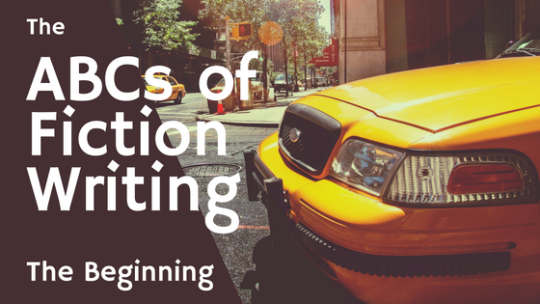
Punctuation and Dialogue Tags
No matter how good your actual dialogue may be, it is going to be unreadable if it is not properly punctuated or tagged. Punctuation and tags offer the clues that the reader needs to be able to 'hear' the conversation that is happening. Since the scene is happening in the reader's imagination, it must be described in such a way that they can properly ascertain who is saying what.
Reading a story that does not have proper punctuation or tags would be like listening to a conversation that was spoken by the same voice, entirely in monotone, without pauses for breath between words or sentences or speakers. It would be incredibly confusing.
If someone is speaking out loud, use quotation marks ( " ") at the beginning and end. Not single quotation marks/apostrophes.
If someone is thinking, and you are writing their actual thoughts, use italics without quotation marks. Italics can also signify emphasis within spoken dialogue. Italics are also helpful for differentiating between flashbacks and present tense, but we'll deal more that in a later article.
When a different character speaks, the dialogue should begin on a new line (see the example in the action tag section).
Dialogue tags denote who is speaking and/or thinking. Examples are: John spoke, she said/he said, Sally shouted, his wife asked, etc. Write your tag carefully, don't detract from the dialogue. It is only meant to signify who is saying what, and other than that should be invisible. Readers will notice, though, if you're only using 'he said/she said' for your dialogue tags, so find other ways to clue them in to who is speaking. You might insert a dialogue tag at a point where the character might pause as they are speaking.
The basics of punctuating dialogue are the same whether it is thoughts or spoken words, you simply place the entire 'thought' in italics (except for the tag), without quotation marks.
Periods, commas, question marks, exclamation points, etc. are contained inside the quotation marks - "That hurt!"
Always use commas when you break up a line of dialogue with a tag - "Honey," John spoke, "I have to work late every night this week." (Note the comma at the end of the broken dialogue 'honey', and the comma at the end of the tag 'John spoke'. Both commas need to be there.)
Use single quotation marks for quoting within dialogue - "He said and I quote, 'you're a miserable excuse for a human being'! Can you believe it?" Also note the exclamation point is outside of the quote, because it refers to the voice of the character talking, not the one being quoted.
Action Tags/Beats
Beyond the basic dialogue tag, you can use action tags (also called beats) to make dialogue flow. This is when, rather than using 'he said/she said', you use action to denote who is speaking.
Example (from my 2010 NaNoWriMo* Novel): "I miss her, especially today," she welcomed his embrace. "I know, I do too," he pressed a kiss to her forehead, "She would be very proud of you, just as I am." "Thank you," Isabel smiled. "It is so hard to believe that sixteen years ago today," her father's mouth twitched at the corners, and Isabel wasn't sure if he was going to smile or weep, "I held you in my arms for the first time. You were so very small. So very frail . . ."
Action tags can be used to convey emotion and scenery, but the tags must always go along with the dialogue of the corresponding character. Also note, as mentioned above, how each new line of dialogue is on a separate line. Otherwise, it would read like this and be confusing:
"I miss her, especially today," she welcomed his embrace. "I know, I do too," he pressed a kiss to her forehead, "She would be very proud of you, just as I am." "Thank you," Isabel smiled. "It is so hard to believe that sixteen years ago today," her father's mouth twitched at the corners, and Isabel wasn't sure if he was going to smile or weep, "I held you in my arms for the first time. You were so very small. So very frail . . ."
It's not impossible to follow but it looks much neater and is easier to tell who is speaking when it is on separate lines.
Indirect Dialogue
Indirect dialogue is summarizing dialogue rather than writing out what the character has said. If the dialogue example from above were to be written as indirect dialogue, it might read like this:
Isabel mentioned how much she missed her mother as she welcomed his embrace. Her father agreed, but her mother would be proud of her. Isabel thanked him as she smiled, and her father began to reminisce about her birth sixteen years before, and the first time he held her. She had been so small and frail . . .
This can be used if you need to get through a lot of dialogue very quickly, but it is not as personal or emotional as the original dialogue was. Don't use this as your main style of writing dialogue, but do know that it exists and can be used for certain purposes. You want to still use some of the words that character would be using if they were speaking out loud, but is a summary, so you don't write word for word what they would have said. Absolutely do not use it for pivotal scenes where you need the emotional impact of what is happening, you'll only the damage the plot.
Voice
The voice of each character must be unique. Just as each person around you has a certain way of saying things, your characters must as well. Avoid writing in accents. Simply mentioning the nationality of a character should be enough, or if they have a lisp, etc. Nobody enjoys reading a story where the dialogue has been written in the literal pronunciation of words/letters.
The best way to do voice is to listen to the people around you and see if you can recognize their speech patterns. Perhaps someone likes to use sarcasm, or they are always very thoughtful in what they say. Listen to people around you everywhere you go (in addition to being people-watchers, writers must also be eavesdroppers), and see if you can pick out speech patterns. Practice by attempting to imitate the speech of the people in your life - a spouse, sibling, parent, close friends.
Punctuation marks also help, use them for their purpose. Exclamation marks (but never more than one) can show excitement, anger, etc. Ellipses ( . . . ) can indicated a pause for thought. Hyphens should be used when a word is started but interrupted; the interruption can be a cough, or made by another character.
Do not continuously use dialogue tags to convey tone, set the tone of the conversation through the scene as well by showing what is happening with the characters. Writing emotion is an important part of this as well, which will be dealt with in the next article.
*National Novel Writing Month
Sources: Punctuation Dialogue: How to Punctuate Dialogue Correctly by Ginny Wiehardt Writing Dialogue: The Music of Speech by Donna Ippolito Writing Fiction for Dummies by Randy Ingermanson and Peter Economy Writing Fiction: A Guide to Narrative Craft, Seventh Edition by Janet Burroway and Elizabeth Stuckey-French
0 notes
Text
Three Mediations of Reading Heraclitus
1. The first is hermeneutical. How are his hundred odd fragments to be interpreted at the basic level of sense? Often I will pass over a fragment of indeterminate yet cryptic meaning and feel the need to copy it down in my notebook. Take this one, for example: (B90) All things are an exchange for fire and fire for all things, as goods for gold and gold for goods. What is it about this statement (which, to the twenty-first century reader trained to metabolize tweet-sized thoughts, should be nothing) that resonates long after I read it? No doubt some of the effect comes from having read it as part of a series of other statements structured just like it. Probably its initial hold on me has less to do with the singularity of its meaning than with its relation of dependency to these other, equally suggestive statements. Repeating it several times aloud after copying it in my notebook, I start to feel that it is the strife between the sense of this statement and its form that gives it its particular resonance. The chiasmic structure of the statement does not read like an attempt to repackage a pseudo-profundity that is really without meaning. Rather, the chiasmus is itself the meaning; the shape the thought takes is to some extent its content. The transaction being spoken of, among things and fire, fire and things, is modeled in the very grammar of the chiasmus. And the relation between the chiasmus of the first clause and that of the second produces an analogy that helps me to extrapolate a bit of sense from the fragment: The cosmos is an everlasting transaction between becoming and unbecoming; fire is the currency of this transaction.
2. The second is philosophical. Many of Heraclitus’ fragments exploit both the abundant ambiguities of classical Greek grammar and the relative poverty — at the time of his writing — of classical Greek’s conceptual lexicon. What Heraclitus appears to be trying to work out in his philosophical fragments, then, is not the kind of systematic cosmology or epistemological treatise that we would expect to find in a medieval or modern philosopher, but a proverbial form of thinking that initiates — without fully completing — the translation of grammatical-poetical figures into the logical medium of concepts. Fragment B48: The name of the bow is life, but its work is death. As one translator notes, this fragment exploits the identical spelling of the classical Greek words for bow and life (bios). In speech, the two words would have received different accents, bow stressing the second syllable (biós), life stressing the first syllable (bíos). In writing, however, there were no diacritical marks to distinguish the two meanings. The reader would thus have had to perceive the play on words in order to begin interpreting the riddle. Such riddles are the medium of Heraclitus’ thinking: translations-in-progress of figures into concepts, or what the author in other places calls “right thinking.”
(Note: Heraclitus is generally critical of those who do not think in riddles with him. He believes that ordinary people are capable of it but are too lazy or poorly educated or otherwise indisposed to do it. He likewise believes that the educated elites of his time are not made wise by their vast learning. Their facts do not approach the level of understanding carried in the form of the riddle. For Heraclitus, then, the riddle is neither the property of the undereducated nor the overeducated, but belongs to any thinker who grasps the affinity between poetic figures and logical concepts — an affinity that, following him, seems to be buried in the deep grammar of language. Fragment B116: It belongs to all people to know themselves and to think rightly.)
3. The third is philological. What we know of Heraclitus we do not know from him directly. The compiled fragments we have today are sourced from spliced quotations and paraphrasings from other authors’ texts. History has transformed Heraclitus from the fiercely independent thinker he is reported to have been in life into a total dependent on the intellectual projects of others. To be sure, many of those who quoted him did so out of admiration or agreement with what he wrote. But others no doubt exploited his name to validate claims that would have been weaker without an appeal to his authority. There is thus no “true” Heraclitus except the philological Heraclitus. Part of the task of reading him, beyond the hermeneutical and philosophical considerations I’ve mentioned, is to consult the source texts from which his sayings are compiled.
Fragment B93: The god whose oracle is at Delphi neither speaks nor conceals but gives a sign. As a floating fragment decontextualized from its source text, I take this to be a provisional definition of the riddle-medium in which Heraclitus’ fragments are written. His riddle “signifies” like the Delphi oracle’s sayings, neither disclosing meaning transparently nor withholding meaning opaquely. Just as when Apollo sends his cryptic messages through his Pythian oracle, the human supplicant is supposed to interpret the statement as best she is able, so the reader of Heraclitus is expected to mull over the words on the page without arriving at a fully determinate or fully indeterminate reading. In short, I read fragment B93 as an invitation into the world of Heraclitus’ thinking, a riddle that helps to unravel his other riddles.
The source text of fragment B93 is Plutarch’s On the Pythian Oracles, a dialogue written more than five centuries after Heraclitus’ death, in which a man named Theon explains to his friends why the oracles at Delphi have ceased to speak in riddle-like verses in favor of a more immediately intelligible prose. Here is how the fragment appears in Plutarch’s dialogue:
For nothing seems better to reproduce the type, no instrument more obediently to use its own nature, than the moon. Yet taking from the sun his bright and fiery rays, she does not transmit them so to us: mingled with herself they change colour and also take on a different power; the heat wholly disappeared, and the light fails from weakness before it reaches us. I think you know the saying found in Heraclitus, that ‘the sovereign whose seat is at Delphi, speaks not, nor conceals, but signifies.’ Take and add then to what is here so well said, the conception that the God of this place employs the Pythia for the hearing as the sun employs the moon for the seeing. He shows and reveals his own thoughts, but shows them mingled in their passage through a mortal body, and a soul which cannot remain at rest or present itself to the exciting power unexcited and inwardly composed, but which boils and surges and is involved in the stirrings and troublesome passions from within.
The quotation is introduced to make the point that the god Apollo, when delivering his messages to the supplicants at Delphi, has always used the Pythian oracle in accordance with her faculties. At the time of Heraclitus’ writing, the Pythian oracle was typically a woman of aristocratic breeding and education who would have know something of poetic composition and meter and would thus have been better prepared to deliver divine messages in high verse. The oracles of Plutarch’s time, however, were typically peasant women without education, and were thus better suited to deliver Apollo’s prophecies in plainer, more prosaic speech. But there was an additional reason for switching from poetic to prosaic prophecy beyond the social origin and education of the oracles: the supplications of the pilgrims at Delphi had fundamentally changed. In earlier times, according to Theon, pilgrims came to Apollo’s temple at Delphi with dangerous and even daring inquiries, ones whose answers sometimes needed hiding from one’s political enemies. The poetical obscurity of the prophecy hid its meaning from unwelcome eavesdroppers and spoke to the specific concerns of the supplicants, who, after applying their whole minds to the interpretation, were able to work the meaning out. In the present “settled condition” of the world, however (which, according to the speaker in the dialogue, is one in which “war has been made to cease” and peace and tranquility prevail), people come to the oracle with altogether different concerns. They worry about marriages, commercial transactions, and other quotidian concerns, asking fewer questions that might endanger their well being in the state. As Theon explains to his friends:
Then there was a change in human life, affecting men both in fortune and in genius. Expediency banished what was superfluous, top-knots of gold were dropped, rich robes discarded; probably too clustering curls were shorn off, and the buskin discontinued. It was not a bad training, to set the beauty of frugality against that of profusion, to account what was plain and simple, a better ornament than the pompous and elaborate. So it was with language: it changed with the times, and shared the general break-up. History got down from its coach, and dropped metre. Truth was best sifted out from Myth in prose; Philosophy welcomed clearness, and found it better to instruct than to astonish, so she pursued her inquiry in plain language. The God made the Pythia leave off calling her own fellow townsmen ‘fire-burners’, the Spartans ‘serpent-eaters’, men ‘mountaineers’, rivers ‘mountain-drainers’. He cleared the oracle of epic verses, unusual words, circumlocutions, and vagueness, and so prepared the way to converse with his consultants just as law converses with states, as kings address subjects, as disciples hear their masters speak, so framing language as to be intelligible and convincing.
This shift from poetry to prose in oracular sayings appears to be a distinctly human achievement. The riddle-likeness of the earlier sayings of the oracle has been rendered unnecessary by a sea change in human beings’ political relations to each other. Less imperiled in their political lives, they seek more banal guidance for their personal lives. Plutarch’s citation of Heraclitus, assuming it is authentic, is likely a departure from the fragment’s original meaning, and yet it provides the only context in which we can interpret that meaning. Once placed in a series with other Heraclitean fragments, it takes on another valence altogether.
(Final thought: the three mediations that must be attended to in Heraclitus’s writings — the hermeneutical, the philosophical, the philological — are just magnifications of the demands that every text makes upon its reader.)
(Originally published on January 15, 2017 at medium.com/kelly.m.s.swope.)
0 notes
Photo

Star Wars 30 Day Challenge- In One Day!
As most of you likely know, the first public screening for the new Star Wars movie releases tonight at midnight. You also probably know about my love for this series and I can’t wait to see review it. I found this video series from the Wars YouTuber HelloGreedo where for thirty days leading up to the release of The Last Jedi, he made a short video covering a variety of different Star Wars related questions. I thought it would be fun to answer the same thirty questions in a single blog entry. Feel free to respond with your own thoughts in the comments!
1. My Personal Favorite Star Wars Memory
My favorite Star Wars memory was seeing The Force Awakens in theaters for the first time. I had never seen a Star Wars movie in the theater to that point, and I was giddy from the time the lights dimmed to the end credits. I felt like a little kid and it made me fall in love with the series again.
2. My All Time Favorite Character
This is a tough one because there are so many great characters to choose from. As a kid I would have said Darth Vader, but as an adult now I’ve grown to love Han Solo. Harrison Ford is so great in the role and he has so many memorable moments and lines. I also love what he brings to the table as a character, a rough and tumble anti-hero who has a greatr arc through the Original Trilogy.
3. Favorite Original Trilogy Movie
My favorite of the Original Trilogy movies is The Empire Strikes Back. I love how it takes a great premise presented in A New Hope and expands it considerably. You learn more about Vader, the nature of the force, and get to meet some really memorable characters in Yoda and Lando Calrissian. There’s so much depth and I would go as far as to say powerful scenes in what on the surface, just looks like a fun science fiction movie.
4. Favorite Prequel Trilogy Movie
This one is also hard because I dislike pretty much all of the prequels, but I would have to say Revenge of the Sith is the one I like the best. There are a few scenes that are true to the original spirit of Star Wars and also a lot of good visuals.
5. Favorite Star Wars Video Game
This one was very easy. The original Star Wars Battlefront II video game from 2005 just might be my favorite video game ever. I got hours of playtime from it when I was in grade school and had a blast every time. The game was so simple in its concept, recreating battles from the movie or ones we never saw on screen, but that’s what I think made it so great.
6. Favorite Lightsaber Fight
The final dual between Vader and Luke in Return of the Jedi is by far my favorite lightsaber fight in the saga. There is so much emotional weight to the scene as Luke is torn between trying to redeem his own father who is also trying to kill him. You can’t help but feel for him as he is constantly being taunted by both Vader and the Emperor and trying to remain true to the teachings of Obi-Wan and Yoda. His outburst at the end where he realizes he is slowly becoming like Vader is also poignant, as well as Vader’s sacrifice to end the scene.
7. All Time Favorite Scene
I could probably make a list of just my favorite Star Wars scenes, but the top would have to be Yoda explaining the Force to Luke and then raising his X-Wing out of the swamp in Empire. Yoda’s dialogue is so well written, and John Williams’ score makes the scene feel both mystical and inspiring. I get chills each time I see this scene and there’s no other one like it in the whole saga.
8. Favorite Yoda Quotation
After a lot of thought, my favorite Yoda quote might be “You must unlearn what you have learned.” It might not seem to make much sense, but part of why I like it might be because it is similar to one of my favorite quotations in real life “It’s what you have learned after you know it all that counts”. They both speak to how nobody every truly becomes a master at anything, and there’s always something new you can be learning.
9. Favorite Fan Film
In all honesty I’ve never seen a Star Wars fan film. If anybody reading this knows of a good one to check out, let me know. On to the next one.
10. Something I Wish Was Different
Like I mentioned before, I really don’t think very highly of the prequels. Yes they are what originally peaked my interest in the series as a kid, but as I’ve grown older I’ve realized how poorly made and pointless they are. I wish they didn’t exist at all, only the original and sequel trilogies were made. None of them are all that good, and create a plethora of plot holes that hurt the original movies.
11. Favorite Piece of Star Wars Merch I Own
A couple years ago for my birthday, my parents bought me some wooden portraits with posters of the original movies printed on them. One of them was a pretty standard one for the Force Awakens, but the other two are the ones that I really love. One is for Empire, with Darth Vader’s mask floating in space with the cast list underneath it with the title. The other one is for Return of the Jedi, and but it says “Revenge” instead of Return. This was because George Lucas decided to change the title during filming, making the original posters with this small detail extremely valuable to collectors. Even though what I own isn’t a original copy, I think it’s really cool and have them both hanging up in my room.
12. Actor I Want to See in a Star Wars Movie
There was a lot different names I considered for this one, but the one I feel the best about is Aaron Paul. If you have watched Breaking Bad, he gives a performance throughout the entire series that is arguably as good as the one Bryan Cranston gives. I think Aaron Paul is a terrific actor, and I’m surprised I haven’t seen him in much outside of Breaking Bad. I don’t have a character in mind for him to play but the Star Wars universe is so big and he’s such a great talent I have no doubt he could play a strong role and really excel.
13. Favorite Member of the Rogue One Crew
Another easy one, K2-SO is by far my favorite character in all of Rogue One. Alan Tudyk’s motion capture performance is fantastic in his comedic timing and vocal work, and by far playing the best character in the movie in my opinion.
14. Favorite Piece of Star Wars Music
Of all the incredible compositions of Star Wars score, my favorite is Finale/End Credits from Empire. It starts with a slow build up to a strong rendition of Han and Leia’s theme before transitioning in to the typical end credits theme that plays in the other movies. What comes after is what puts it over the top for me though, as it features a medley of the different character themes from throughout the movie. Yoda’s theme, The Imperial March, and finally a return to the love theme are all played and works as a nice musical microcosm of the film.
15. Favorite Vehicle in the Saga
My favorite vehicle in Star Wars is also one of the best vehicles in all of pop culture, the Millennium Falcon. Its design has always been really cool to me and its so recognizable. I like how it seems like you could live in it, and I love how proud Han Solo is of his ship even though the other characters are constantly making fun of it. I also like how its seen all kinds of action, been to the furthest corners of the galaxy and all of its different features.
16. Favorite Special Edition Change
The change in the Special Edition that I don’t mind is the general improvement of the visuals and audio. I don’t think it hurts the integrity or undercuts the work put in by the original crew, but enhances their work and helps the movies age a little bit better.
17. Least Favorite Special Edition Change
In my opinion, the worst of all the Special Edition changes is the CGI creatures and backgrounds added in to Mos Eisely in A New Hope. Not only does it look terrible, but it’s ridiculously distracting and one animal even blocks the entire view of the scene right before Luke, Obi-Wan, and the droids are stopped by the stormtroopers. It makes no sense at all why all of this was added, and that might be why it irritates me the most.
18. Favorite Star Wars Parody
I admittedly haven’t seen the most Star Wars parodies, so I’ll have to go with Space Balls by default, but that doesn’t mean that it is still a really funny parody. It captures the spirit of the Original Trilogy while also satirizing the merchandising it has become famous for, as well as the logic of movies altogether.
19. Favorite Non-Star Wars Movie from a Star Wars Actor
My favorite for this one would have to be Raiders of the Lost Ark, featuring Harrison Ford as Indiana Jones. Both of these series have a special place in my heart as they sparked my interest in movies as a kid. Harrison Ford is just as iconic as Indy as he is Han, and the rest of the movie is masterfully guided by my favorite director, Steven Spielberg. It never lets up with action, suspense, an incredible score, and I never get bored while watching it.
20. Favorite Droid
BB-8 is my favorite droid in all of Star Wars. I love his design, how it looks original but still looks like it exists in the Star Wars universe. I also think its really cool how the creators of Force Awakens were able to make a character that is so funny and lovable but doesn’t have any dialogue, much like R2-D2.
21. Star Wars Game I Wish Existed
I’m not a huge video game fan so I don’t know if a game like this exists, but I think an open world game simlar to Red Dead Redemption in the Star Wars Universe would be really cool. Maybe your character would be a bounty hunter or character similar to Luke in A New Hope trying to find his way in the galaxy, but you make the decisions that ultimately affects his fate.
22. The Star Wars Anthology Film I Want
YouTube movie reviewer Jeremy Jahns actually had an idea for an anthology film that I would love to see. It would focus on Obi-Wan between the events of Revenge of the Sith and A New Hope. Ewan McGregor would come back as Obi-Wan, but the tone of the movie would be more similar to a western than a space opera. He would be in hiding in Tatooine, riddled with guilt from the fall of Anakin and maybe PTSD from the Clone Wars. He’s on Tatooine not because he feels the need to watch over Luke, but because he just doesn’t want to see a galaxy under the control of the Empire’s iron fist and falls away from his Jedi beliefs. This is where the western theme comes in, as maybe a small settlement near where he’s hiding in the desert is under threat from the Empire or a gang from Jabba the Hutt and he is forced to try and stand up to them. I like this idea because it would be a very different tone for a Star Wars movie and wouldn’t add too much unnecessary backstory.
23. Favorite Force Awakens Moment
I absolutely loved the scene in Fore Awakens where Kylo Ren has just incapacitated Finn tries to use the Force to pull the Skywalker lightsaber out of the snow. He has some trouble getting it out, as it wiggles around and finally comes out, but flies past his face and in to Rey’s outstretched hand. She looks confused and a bit scared after it happens, but the Force theme slowly begins to swell up. I got goosebumps seeing this scene in the theater and me and several other people cheered as it happened. It’s such a great reveal, and it represents everything Star Wars is about, finding something special deep inside you and riding to an occasion with that ability you have.
24. Favorite Space Battle
Although I didn’t like the movie as whole very much, the last thirty minutes of Rogue One are fantastic. The battles going on in space and on the ground look incredible and are intense, combining new technology with the classic Star Wars action cut scenes from A New Hope. The hammerhead ship crashing in to the Star Destroyer is a great scene and there is a new level of intensity that you don’t really see in the other Star Wars space battles.
25. Least Favorite Star Wars Moment
This might be a cop out, but all of the Anakin and Padme love dialogue scenes are absolutely terrible. They are so poorly written and awkward to watch. I can’t remember the last time I watched Attack of the Clones from beginning to end, but it won’t be again any time soon partly because of these scenes.
26. Favorite Darth Vader Quotation
I think it’s great in Empire when Vader says to Lando “I am altering the deal. Pray I don’t alter it further”. It fits the character so perfectly, being menacing and pithy at the same time. I also love how Lando tugs at the collar of his shirt after Vader turns away, almost like Vader gave him a bit of a force choke as he left.
27. If I Were An Extra, What Scene Would I be in?
I’ve always found it funny how in every Original Trilogy movie, there’s a stormtrooper who gets shot and falls from a ridiculous height screaming on the way down. I would want to be one of these guys, because it would be a funny cameo and just a fun scene to be in.
28. Director I Want to Direct a Star Wars Movie
Jon Favereau, the director of the first two Iron Man movies, The Jungle Book remake, and Elf would be a great choice to direct a Star Wars movie. He has worked with Disney before so he would be able to work with the corporate aspect but also bring a unique flavor to the story, and some great special effects too.
29. A Prop I Would Like to Own
The burnt-up Darth Vader mask scene in Force Awakens would be a cool prop to have. There’s something intimidating about it still, even though it’s heavily damaged and mishaped. I feel like it represents the new trilogy’s connection to the originals though, and would be a unique piece of memorabilia.
30. Why I Love Star Wars
I love Star Wars because of what it was and what it has become. I love hearing the stories of how the first movie went over budget and schedule, nobody thought it would be any good, and now it might be the most famous film franchise in existance. I love the fun, light-hearted moments and the ones with depth and emotions too that I think get overlooked too often by film critics. I also love how it has had such a strong impact on my life, and how I will get to pass on the story and my experiences with it to future generations.
That’s it! I’ll have my review for The Last Jedi as soon as possible after I see it. Let me know what your responses to these questions are!
#star wars#the last jedi#The Force Awakens#A New Hope#the empire strikes back#phantom menace#attack of the clones#revenge of the sith#star wars thirty day challenge
1 note
·
View note
Text
Hyperallergic: Yvonne Rainer on How Filmmaking Gave Her Language
From Lives of Performers (1972) (courtesy Zeitgeist Films)
The inimitable dancer, choreographer, and filmmaker Yvonne Rainer is having a retrospective of her films starting Friday, July 21 at the Film Society of Lincoln Center. An instrumental force in avant-garde dance and key player in the inception of the art collective Judson Dance Theater, Rainer took to filmmaking in the 1970s, occupying a unique space that both straddled and rejected the modes of performance art, documentary, essay, and film. Her directorial debut Lives of Performers (1972) tells the story of a love triangle between members of a dance ensemble through lovingly captured rehearsals, scraps of text, and dissonant voiceover. Film About A Woman Who… (1974) probes the norms of romantic taboo by telling the story of an extramarital affair in hushed allusions and repressed memories, the characters known only as “he” and “she.” (In that film, Rainer briefly occupies the role of a lady lion tamer, who says “Martha Graham and Jean-Luc Godard were as responsible for my leaving the circus as anybody”). Across the board, Rainer’s films are formally innovative and disinterested in the established strictures of narrative — which is to say, of cliché.
Rainer’s movies collapse safe boundaries between maker, work, and audience, not just once or twice (for easy, cathartic effect) but consistently throughout, drawing you back to square one and insisting that you take a long, hard look at your own relationship to the screen — a relationship which, like so many others, Rainer does not let us forget is about power.
“I must emphasize that it was language that filmmaking offered to me,” Rainer said over the phone. She describes dance as more “limited” in this sense, but that ever since she recently starting choreographing again, she’s been incorporating text, from art criticism to news articles, that she avidly reads. “I put a microphone up and interrupt what the dancers are doing. I’m like this gadfly, roaming around the stage, trying to get messages out. And it’s all live.”
For an octogenarian art-world legend, Rainer wasn’t just approachable; she was self-effacing, unpretentious, and easy to talk to. Time and again, the artist shrugged off theoretical approaches in favor of bringing conversation back to her means of production and, above all else, the work itself.
* * *
From Film About A Woman Who… (1974) (courtesy Zeitgeist Films)
Steve Macfarlane: To quote your own film, Journeys from Berlin: “let’s start somewhere.” In Kristina Talking Pictures (1976), a backdrop of environmental collapse is used to explore the dissolution of a relationship. Around that time you mentioned using the camera to fragment or zoom in on the things that had been unavailable to you as a choreographer.
Yvonne Rainer: Kristina was my third film. Having read this book about oil tankers and the dangers of their capsizing and spreading oil, the havoc they’d cause on the natural world, that was the main topic. My dancing was not narrative; it was abstract, athletic, it had references, perhaps, but to dance history. My M.O. was to deal with a broader range of social, political issues. Filmmaking, the New American Cinema — Hollis Frampton, Maya Deren, and others — it was a way to combine aesthetic concerns with specific social issues. Then there were my contemporaries, Laura Mulvey and Peter Woolen, who made “talking pictures” with a lot of dialogue and didacticism. I knew them; my work was on programs with theirs.
From Kristina Talking Pictures (courtesy Zeitgeist Films)
SM: Where were these screenings happening?
YR: Anthology Film Archives. The same situation as today: small film showcases, universities… I’ve never been in the big theaters that show Hollywood films.
SM: So much of the work plays with annotation: newspaper clippings, unattributed quotes, performers almost possessed by dialogues or texts that “break the spell” of the filmmaking.
YR: I must emphasize that it was language that filmmaking offered to me: I could play around with voice, I could interrupt someone speaking with a title or subtitle. Dance at that point seemed very limited to me in terms of my wider interests.
SM: Tell me about the decision to use that Rolling Stones song “No Expectations” in Lives of Performers.
YR: Oh… I just liked the song. It comes in halfway through a series of tableaux vivants — I probably just felt I had to liven up this staid, silent progression.
SM: So practical!
YR: A lot of choices had to do with duration. My feelings at that time were heavily prompted by John Cage: “if you can stand it for two minutes, try it for four.” In Film About A Woman Who…, there’s a long, slow tracking shot that seems interminable to me now. If I’m ever in an audience when it’s projected, I stay just to see when people will walk out! (Laughs) Sometimes the aesthetic adhered to more conventional standards, and then other times it was subject to disruption — the radical juxtaposition I mentioned earlier. If there’s any hard and fast rule, I guess it’s that one. Which I have continued to do throughout my film career.
From Kristina Talking Pictures (1976) (courtesy Zeitgeist Films)
SM: If that shot took an eternity in 1972, it can only be more radical now: everything’s faster, shorter, louder, more saturated.
YR: There’s a scene in Jean Vigo’s Zero For Conduct where a boy has to stay after school, alone, in the classroom as punishment. He’s there for quite a while — fiddling his feet or his hands — and we have to stay with him. It’s far longer than you would expect in a film, then or today — and for Lives I took that and ran with it, when Valda Setterfield is sitting on the couch. There’s a cat beside her. She’s facing the camera, her back is against the wall. I let her go long twitching her feet — that was fascinating to me. It’s almost like a photograph. So yeah, I was very interested in what one could get away with. I didn’t feel I was violating any traditional narrative rules. The point was: What minimum of movement could keep you, or me, interested, at that particular moment? The end tableaux all had an exact duration of 15 seconds, something like that, timed with a stopwatch. At the end of each shot, the movement comes and you cut to the still. Like a metronome. And “No Expectations” came in exactly two thirds of the way through.
SM: And before that sequence, you see them rehearsing together one last time. The room empties out and there’s one last intertitle: “Emotional relationships are relationships of desire, tainted by coercion and constraint. Something is expected of the other person and that makes him (and ourselves) unfree.”
YR: That’s Jung. I always felt other people could say things more accurately than I could (laughs). Now, since I’ve returned to dance, quotation is almost entirely what I utilize. It’s enabled me to come back to choreography; I no longer dance so much as I read. So there’s a continuity from the way I use language in film to the way I use it now, the kind of radical juxtaposition, to choreographic images. That itself is a quotation from Susan Sontag — films are full of radical juxtapositions — language, enactment, imagery.
From Mind Is a Muscle (1963)
SM: Is that something you’ve taken from filmmaking and put back into choreography?
YR: I made seven films, from 1972 to 1996, mainly through grants. Each doubled or tripled in cost, ranging from five to 10 thousand dollars in the early ’70s to $250,000 for MURDER and murder… I wasn’t about to make compromises in making more accessible kinds of work. I still wanted to make narrative films, and I could no longer raise the money.
And I was never very comfortable as a filmmaker; I loved the writing and editing, but the production, with the hierarchy, there was never enough money, and post-production… It was a nightmare to deal with laboratories where things were always going wrong and I didn’t have the money to reshoot. My work wasn’t very polished technically. I was, am, and will continue to be a techno-dummy! So I always knew there was a limited time I could do this. The economics of it create a preordained ending. I had my fill of the technical complications of filmmaking.
I remember arguments with Babette Mangolte, who taught me all about editing and was camerawoman on my first two-and-a-half films. She said, “You’ve done this twice, don’t do it again!” Sometimes I listened, sometimes I didn’t. Peter Wollen always used to say: “They let you make five.” Well, they, whoever they were, the powers that be, let me make seven. And I felt very lucky. But in a way I was very happy returning to dance. I never did my own camerawork, that’s part of my technical inaptitude.
I was always overly dependent on other people. As a choreographer I can relate to the dancers, I can feel more comfortable — to me it’s a much more direct situation in terms of creating something.
From Lives of Performers (1972) (courtesy Zeitgeist Films)
SM: Lives of Performers struck me as this quintessentially collaborative, 1960s effort. Then I looked at your book of screenplays, published in 1989, and realized how meticulously your work is written ahead of time.
YR: But Lives was different from all my other films. In the few places where it might seem to be in sync, the speech was dubbed. This process entailed making a rough cut without sound, letting the performers all look at it, and then recording their responses — laughing, commenting. I also assigned them various instructions in this kind of makeshift script: read this. Paraphrase this. So you’re hearing variations in the way they speak. And I was still dancing then. I had a performance at the Whitney: one side of the space I projected a rough cut without sound, while the performers sat in front and read their lines, while other live performers did the same things that you saw in the projected images. I never made anything like that again. The scripts were much more detailed and better adhered-to than that one. So now I am very fond of Lives — it has a kind of impromptu, ad hoc aspect I never tried to duplicate again.
SM: The first film of yours I saw was The Man Who Envied Women.
YR: Where the main character, Jack Deller — as in, “Jack, Tell Her” — is played by two different actors.
SM: Tell me about shooting the lecture scene, wherein Jack (or the two Jacks, as it were) are lecturing on Foucault and Lacan. The camera slowly wraps around the lectern, back to the audience, past the audience, into the other rooms of the apartment… Students are splaying light on them as they ask questions, the audio tracks are blending, the dynamics are all out of whack, untenable.
YR: Oh, the impossible lecture scene. That came verbatim from my friend, the philosopher Thomas Zummer, who had been a disciple of Foucault. I just put his lecture in the mouths of the two actors in front of this very bored classroom, and ran with it. A funny scene, but in hindsight I’m critical of it. Not for the lecture, but because it was in a huge, newly renovated loft I was borrowing from an artist, who hadn’t moved in yet. One of the themes of that film is artists buying abandoned tenements in the Lower East Side. We move from the lecture space to this empty, new kitchen area, and then this glass, brick wall, into the bathroom… I was exploring these icons of real estate development in lower Manhattan. But I don’t think that’s clear enough. If I were to do it again I would put a big banner on the wall: “MOVE UP TO DOWNTOWN.” I saw that banner traveling in Seattle — the real estate agents were encouraging people to buy these newly developed co-ops.
From The Man Who Envied Women (1985) (courtesy Zeitgeist Films)
SM: You use yet another framing device when Jack sits and talks about his sex life, and scenes from Hollywood movies from his generation’s childhood are playing behind him. There’s a lot of choreography in that, too.
YR: Well, these are film noirs — all films about women either putting themselves down or being put down, condescended to, by men. Even after Barbara Stanwyck finally shoots Fred MacMurray in Double Indemnity, she’s apologizing for it! I was very influenced by my becoming conscious of the role women play in patriarchy. All those films behind Jack reflect that.
I was trying to deal with different power relations — the power of the community in the Lower East Side, to shoot down the city’s attempts at making money off of middle-class artists, selling them property, and then the other events going on at that time.
SM: The film also uses Jack’s milieu to interrogate artist communities during the Reagan Administration — there’s a through-line about death squads in Central America, and the ineffectiveness of artists, of “high culture” at large, in standing against something like that. Were you at a point of frustration?
YR: Oh. I never expected my work to change the world in any way. The best I can ask of anything I do is that it gives support and encouragement to like-minded people. Certainly I don’t rule out art’s possibility to intervene, especially in the situation we’re in now. We have to keep making moves against this appalling presidency — I’m signing six petitions a day! Artists have to stay awake, and not belittle small moves. You have to try, to join with other people and get resistance into your work, whatever way you can — even in dance (laughs). I still find that harder to do.
SM: What’s harder?
YR: I’m interested in movements and by moving people around, but it’s still restricted by the norms and history of choreography. Again: language is where I can still make inroads and make allusions to a larger world. I love to switch gears, to keep you guessing, pulling them in and then pushing them away — a Brechtian device. You so easily lose yourself in narrative conventions, the shot-reverse shot; even in the later films, I always try to break that up. And wake you up, so to speak.
SM: Your work is always self-aware in the sense that it shows how film images lie.
YR: Language lies, but there’s a lot of irony to the language I use. Outright description, commentary, etcetera. When quotations are being juxtaposed to the dancers, it’s interrupting what happens on stage. If I were still making films I would probably present this Ghosh quote in a rolling title. I don’t know what the image would be around/before/after it, but you know — sometimes I would have someone read it, or…. But I would get this message out, somehow.
SM: It’s hard not to think of your “No Manifesto” (1965), which included: “No to the glamor and transcendency of the star image”; “No to seduction of the spectator by the wiles of the performer”; and “No to moving or being moved.” Your filmmaking was never about pretty pictures. To you, what is the value of beauty today?
From Film About A Woman Who… (1974) (courtesy Zeitgeist Films)
YR: I’m as susceptible to beauty as the next person. A little bit goes a long way, maybe? I just saw The Beguiled, with Kirsten Dunst and Nicole Kidman. The way Sofia Coppola cuts away to these southern, misty, cobwebby, moss-ridden landscapes over and and over again — well, I thought she overdid it a bit. But, it’s not my aesthetic. It is surprising though, how that male character who seems so seductive and sympathetic in the beginning, all of a sudden he becomes a monster — and I’m such a realist or a literalist, you know, I don’t believe Kidman’s character character would have the expertise to cut off his leg without him dying of sepsis. I found that very unlikely. But that’s what conventional films do: they condense what might be a much longer narrative and you have to go along with it. The devices do draw you in, but I like fewer and fewer movies being made today.
One film I saw recently which excited me was Streetscapes by the German filmmaker Heinz Emigholz. It was an ambitious and captivating survey of his obsessions and personal history with architecture and film. I’m still processing it.
Film noir was wonderful for me — on TV I would sit and binge every afternoon; around 3 o’clock, they were showing film noirs. And before that, in San Francisco, my father, who was trilingual, would take me to see French and Italian art movies. Those were the days! But when you’re younger you’re much more susceptible to those kinds of things — then you undergo a kind of stiffening that prevents you from enjoying what younger people enjoy. After all, I’m 82 years old — I can’t expect to enjoy what a 20-year-old is inspired by.
Talking Pictures: The Cinema of Yvonne Rainer is at the Film Society of Lincoln Center (70 Lincoln Center Plaza #7, Upper West Side, Manhattan) July 21–27.
The post Yvonne Rainer on How Filmmaking Gave Her Language appeared first on Hyperallergic.
from Hyperallergic http://ift.tt/2uhAStx via IFTTT
1 note
·
View note